
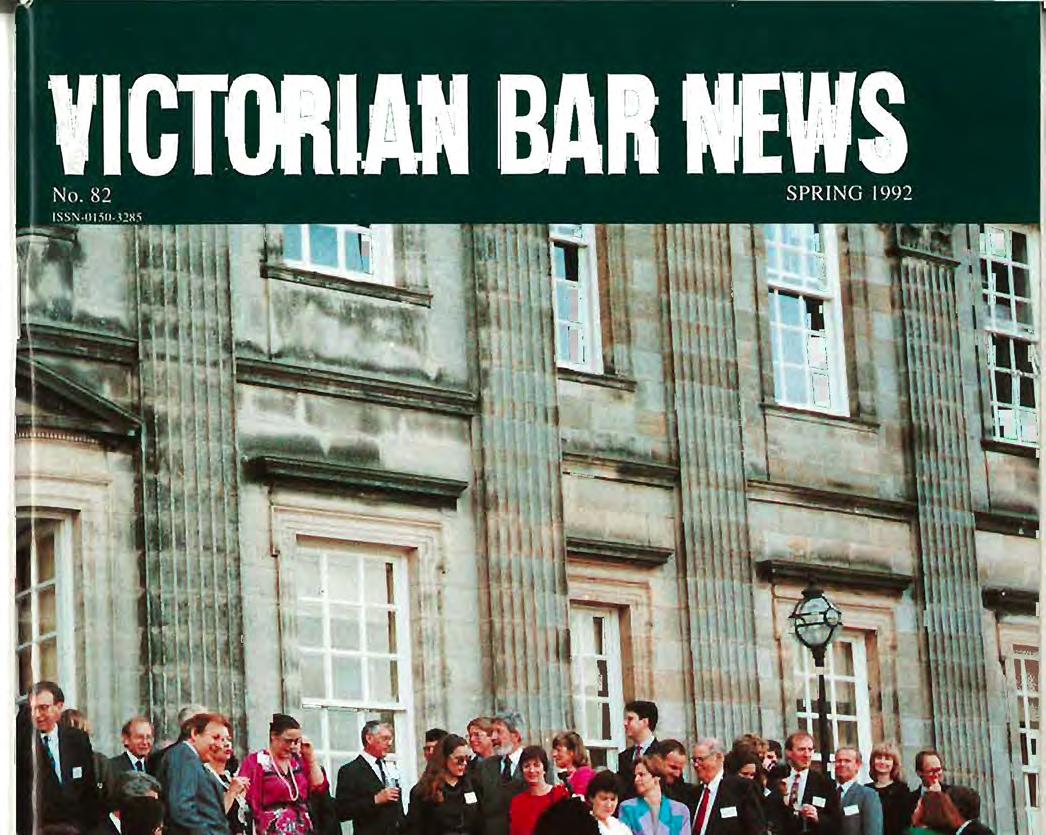
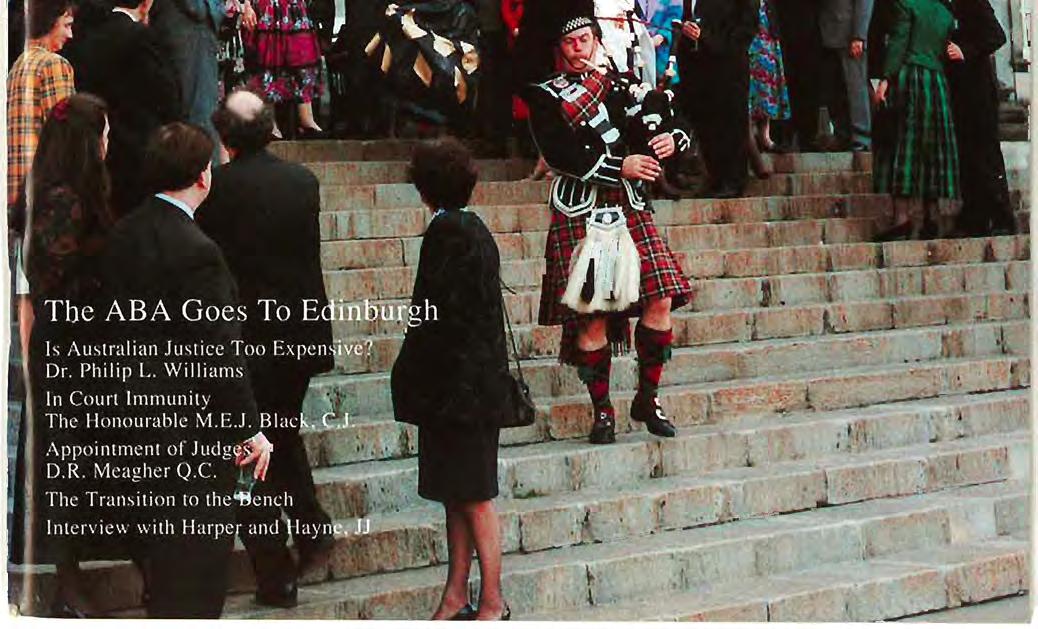













18 Is Australian Justice Too Expensive?
In Court Immunity
Appointment of Judges
The Transition to the Bench
55 The ABA Goes to London (and Edinburgh) 56 Case Law for the Tyro Advocate
60 Judges' Reception 61 Bare Headed Barristers Unacceptable
62 Executing a Search Warrant
63 Governor Honoured by Local Association 64 Black and Tan Silk Lands a Double
64 The Recent Travels of C. Penman of Counsel
66 Tales from The Colonial Past
66 Cross-Examination in Action
68 Readers' Reception 69 Verbatim
72 A Fairy Tale
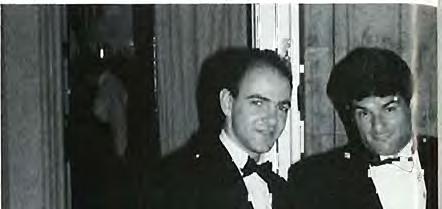
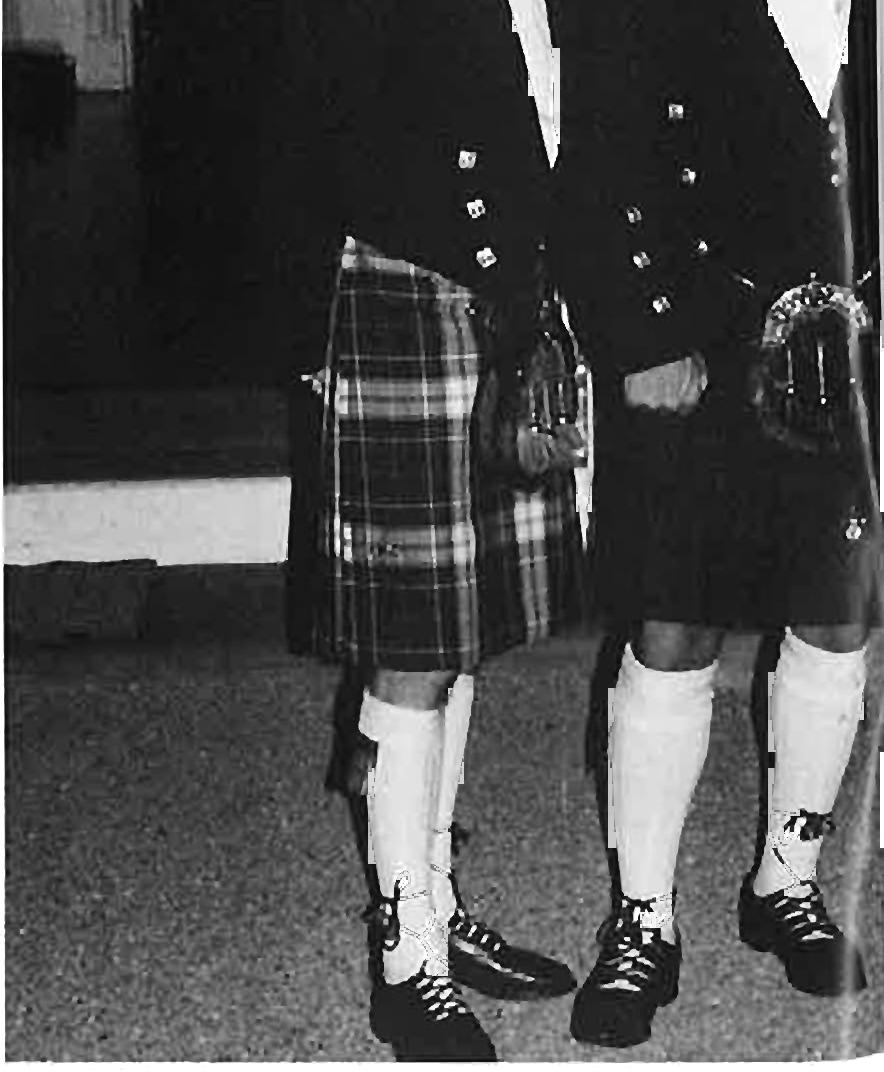

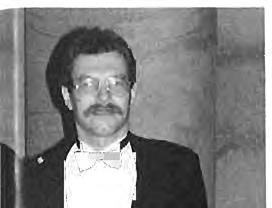

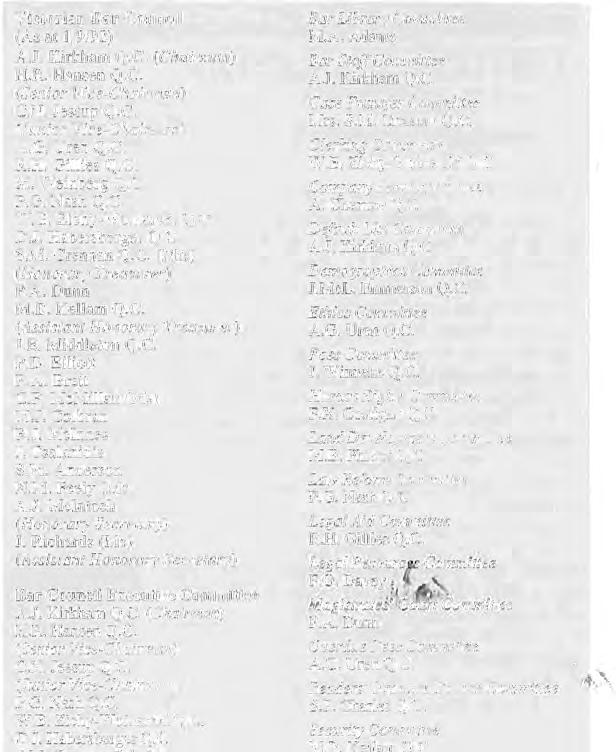
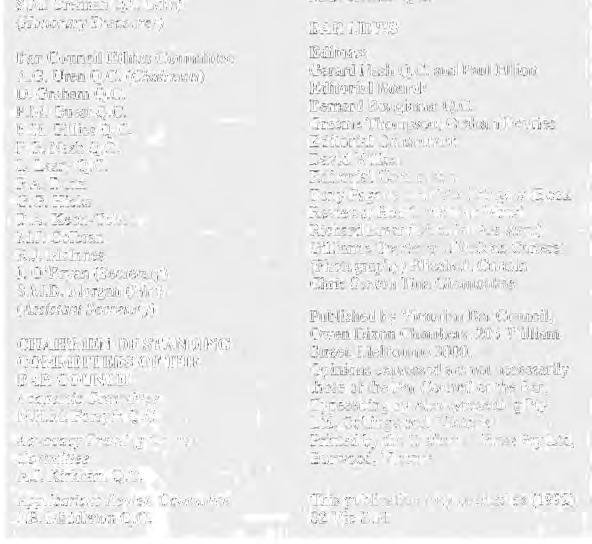

When the Editors find themselves under attack by both the Honourable Mr. Justice Byrne and Merralls Q.C. then, clearly, it is time to elevate "We Were Wrong" to first place in the Editors' Backsheet.
In the Winter 1992 issue (p .76), we attributed to Byrne J. the words used by Counsel in his closing address to the jury. We apologise for our misreading of the transcript.
The Editors accept that they should have realised that no former Editor of Bar News would become obsessed with a rubbish bin and a broken bag of prawns - whether cooked or otherwise.
In the case of Merralls Q.C. our fault lies in attributing virtue (attendance at the Bar Dinner) and scholarship (a fluent understanding of Greek and Latin) to a man who projects the image of scholarship and virtue: If Merralls was not at the Bar Dinner, it is where one would expect him to be. If (had he been there) he had not been amused by the humour of Mr. Justice Hayne then we can only protest that he is the sort of person (a) who ought to have been so amused and (b) who would have detected that Hayne J. was speaking neither in Latin nor old Greek.
Competitions! Competitions! Competitions!
The upcoming "Spring offensive" edition of the Bar News will be known as the competition edition. The Spring Bar News features many competitions. We have bowed to the pressure of the press. Now is the time to reveal the internal and secret workings of the Bar. To this effect we will be running dual competitions on mateship and monopolies.
MATESHIP
The first competition is for the Bar Mateship A ward. According to the Sunday Age there cannot be mateship at the Bar because of mutual mistrust. This must be true because it was printed in the newspaper. Everyone knows that there cannot be real mates at the Bar because we compete so aggressively against each other. The Bar is an untrusting jungle akin to party politics. There can be no true
friendship when underneath everything you're trying to stab the back of your supposed mate.
Name the person with whom you pretend to be friends but envy most.
Who is your greatest competitor?
Who is the person whose fee book you think about most?
Send in details of the most outrageous fees ever charged, in particular those that have made you green with envy.
Name that talentless person who is making more money than you and doesn't deserve it.
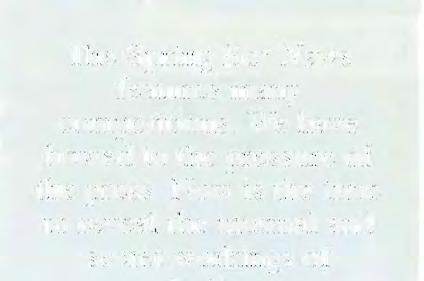

The Bar Monopoly Competition will be held over the Cup Carnival. The Bar Monopoly Sub-Committee has drawn up a special board game for the event. The game will be called "Quasi-Monopoly". The rules for the game are extremely complicated and anti competitive. Only members who attended public schools can play the game. Of course females are excluded unless they are Judges. As the Bar is not competitive on an aggressive basis, mates can also play the game. The aim of the game is to break the quasi-monopoly! The winner of the game will naturally be expelled from the Bar and be forced into partnership as an advocacy consultant.
The Bar Council has approved in principle the production of a Bar Directory. A circular
setting out the proposed format of the directory has been distributed. There was much discussion as to whether full length photographs should be inserted in the directory. If you agree that photographs should be inserted please send photographs of yourself which can be placed in the classified pages of the Bar News.
The Editors understand that Clive Penman proposes to place his name in the directory and to include in that entry all the matters mentioned in clause 3 of the Bar Circular. The Editors would be grateful to receive entries for a Clive Penman Advertising Competition including a statement such as is permitted by Clause 3.5, being a statement of:
"(i) the occupations in which the barrister has engaged (including occupations other than the practice of the law);
(ii) the areas of practice in which the barrister has engaged as a barrister; and

Dear Sirs,
You may imagine my distress on 28 May last, when presiding over my first criminal trial, to hear David Drake in his otherwise excellent final address tell the jurors that they were like a bunch of prawns watching seagulls and a four year old toddler on the banks of the Yarra. I was obliged to sit and listen to this tortured imagery, gnawing my elbows with frustration. So be it. Both the jurors and I were being paid to listen and listen we did.
But you, sirs, have compounded my distress when you attributed Drake's convoluted and regrettable imagery to me in the Winter edition of the Victorian Bar News.
Like his client, I plead not guilty. I trust you will bring to the attention of your readers that it was Drake who thus spake.
Yours truly,
David Byrne
[We apologise to His Honour for the inability of at least one of the Editors to read a transcript carefully. To the best of our
(iii) the areas of practice in which the barrister is willing to accept briefs".
We would be pleased if entrants would also state the fee range:
(a) at which Clive Penman would accept briefs;
(b) at which the Legal Aid Commission would pay Clive.
We are pleased to republish in this issue a paper entitled "Is Australian Justice too Expensive". This was delivered by Dr. Philip Williams at the 21st Conference of Economists at Melbourne University in July 1992. Dr. Williams is an independent economist whose paper was not commissioned by the Bar. His views in relation to the charges that the Bar is a monopoly or quasi-monopoly are extremely interesting.
The Editors
knowledge his Honour, despite his having been partly educated in France and therefore deemed to be somewhat eccentric, has not, so far as the Editors are aware ever been guilty of collecting prawns, seagulls or rubbish bins. Nor has any association between his Honour and a rubbish bin ever been suggested.]
Dear Sirs,
I am sorry to add yet another chapter to "We Were Wrong". While your social correspondent was observing my enjoyment of Mr. Justice Hayne's Graeco-Roman wit at the Bar Dinner, I was reflecting upon the sociological implications of the evening's episode of "The Bill" in the comfort of home. I am flattered by association with John Batt as a connoisseur of classical humour: while he holds a first class honours degree in Classics I know not a word of Greek, and at Latin I rank with Judge Howse in meteorology.
Yours truly,
James Merralls
[The Editors apologise for the assumption made by our correspondent, that Merralls Q.C. was present at this year's Bar Dinner. We have no doubt, however, that if he had been present he would despite his modest disavowal of linguistic skills, have enjoyed the words of Mr. Justice Hayne which, though scholarly and erudite, were so far as the Editors could tell, English.] 7

THE LAST QUARTER THE ACTIVITIES of the Bar Council have included
1. To provide limited financial assistance should the Essoign Club trade at a loss.
2. That until a space becomes available in ODCE the Chairman of the Bar Council for the time being be provided a permanent Car Parking spot at 555 Lonsdale Street.
3. To oppose the Crimes (Fraud) Bill (Cth).
4. To hold the 1993 Annual Bar Dinner on 5 June at the WTC.
5. To leave Rule 2 of the Rules relating to Clerking Committees unchanged.
6. To co-operate with the one-off Supreme Court mediation scheme.
7. To discourage smoking during formal dinners in the Essoign Club.
8. To approve in principle the publication of a Bar Directory.
9. That sharing of Chambers at 555 Lonsdale Street be not permitted.
10. To require members of Counsel who have defaulted in payment of Debenture and Unsecured note instalments to show cause why they should not be removed from the Roll of Counsel.
11. That the AGM be held on 23 September, and the Annual Ballot closes on 28 September 1992.
12. To direct Clerk G to cease dissemination of written material concerning Barristers to Solicitors.
13. To approve Mr. Paul Holmes as a Barristers Clerk.
14. To not oppose the proposed Family Court practice direction concerning appearances by unqualified persons.
15. To invite members of the Bar to make donations to the State Library Renaissance Appeal.
1. Proposed amendments to s.32 Legal Aid Commission Act.
2. BCL monthly reports.
3. Cancellation fees.
4. New Rules of Conduct.
5. Recognition of interstate silks without formal Victorian appointment.
6. The Defamation Bill.
7. Rule 34 in the context of the Trade Practices Legislation.
8. The Tasman Institute Report.
9. The Victorian Law Reform Commission's Report on "Codes of Practice".
10. Robing in the Accident Compensation Tribunal.
11. Withdrawal of the LIV from the Law Council of Australia.
12. LACV Barristers' fees.
13. The retention of Counsel by the LACV.
14. The naming of the Chambers at 555 Lonsdale Street.
Comments on matters decided, considered and/or not decided upon nor considered by Bar Council are still welcomed by Bar News.

THE PRACTICE OF FAMILY LAW CONtinues to be subject to ever-increasing scrutiny by both the media and various committees set up to improve and streamline its practice. The Family Law Bar Association has on behalf of its members met the challenges that have been
raised through this year. Through its Executive Committee, it has dealt with many issues affecting barristers practising in Family Law. The Chairman and Executive members of the Association have met with other members of the profession to discuss proposed changes
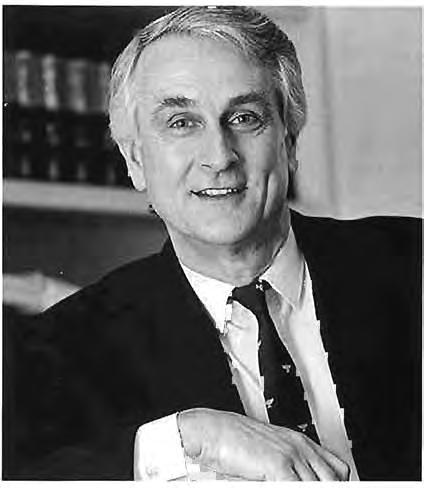
and current problems affecting Family Law; meetings have been held with judges of the Family Court and other interested parties; and the Association has participated in Case Management meetings held at both the Melbourne and the Dandenong Registries of the Family Court. The issues discussed included: enforcement of pleadings and Court Rules; consistency of decisions by Registrars; costs; criticism of the Legal Aid Commission; and the operation of Case Management Guidelines. All these issues impinge upon the dayto-day practice of Family Law and the smooth administration of the Court.
The Association has made submissions to the Victorian Bar Council in relation to the Draft Family Court Practice Direction: Rights of Appearance by Unqualified Persons. It considered whether the proposal to permit appearance by unqualified persons in the prescribed limited circumstances set out in the Draft Practice Direction would impact upon the Bar. It concluded that it would have little effect, if any. The proposal was merely permissive in its terms. The Association advised the Bar Council that there was a certain practical reality and expediency associated with the proposal which involved no erosion of the position of the legal profession, and in particular the Bar.
The Executive Committee of the Association has met and considered various issues, such as the right of Monash Law Students to appear in the Family Court, the simplifying of
procedures under the Family Law Act, the treatment of superannuation in Family Law, Costs Agreements and other related issues in Family Court proceedings. In respect of each of those issues, reports and recommendations were provided to the Victorian Bar Council.
On a significant issue, the Executive Committee through its Costs Sub-Committee has considered the question of fee increases, given that the current fees recommended by the Bar Council have lain dormant since March 1988 (notwithstanding an increase in the Legal Aid Scale of 13.5% granted in November 1990). It is noteworthy that a CPI increase of at least 22% has occurred since that time.
Although the recommended Bar Fees have remained static, there have been seven increases of the Schedule 2 Fees for Solicitors since that date. In summary, the increases generally vary between 25.49% and 26.83% although costs allowed for a Solicitor's Clerk's work had increased by 49%.
It was the recommendation of the Costs Sub-Committee that submissions be put to the Bar Council to rectify the situation by increasing recommended fees. The Association continues to enjoy an excellent relationship with all members of the judiciary of the Family Court at the Melbourne Registry. There are open lines of communication relating to matters of mutual concern to both the Bench and the Association. In addition the Association continues to assist the Victorian Bar Council in matters relevant to the practice of Family Law.
Paul Guest
THE NEW BARRISTERS' COMMITTEE (formerly the Young Barristers' Committee) was quite obviously the brainchild of someone with great vision. Unfortunately, I have been unable to discover just whose brainchild it was. However, the Young Barristers' Committee Constitution (approved by the Bar Council on 16 February 1989) tells one that the purpose of same included; " ... promoting the interests of Barristers under 6 years call and placing before the (Bar) Council the views and opinions of those Barristers."
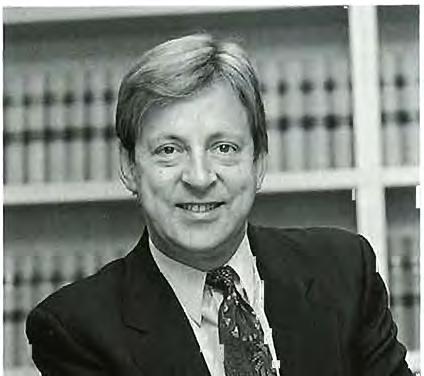

Ross Gillies Q.C., Chairman New Barristers' Committee.
In July 1990, the N.B.C. first discussed changing its name to "The New Barristers' Committee". I hesitate to spell out why the name was ultimately changed, but certain trends had clearly developed which made it obvious that not all those coming to the Bar necessarily fit into the category of "young". Suffice it to say that changes to the Constitution were ratified by the Bar Council on 27 June 1991, and by that stage the N.B.C. had formally changed its name to "The New Barristers' Committee". No doubt, some would describe that as progress.
The N.B.C. draws its members from, and, has as its constituents Barristers under 6 years call . For the most part it has relied on references from the Bar Council, but the present N.B.C. has made some very genuine attempts to be more pro-active.
In the past the N.B.C. has concerned itself with a number of issues affecting junior Barristers. Affordable accommodation for the Junior Bar, or rather the lack of it in the past, has been an issue considered seriously by the N.B.C. since at least early June 1990. It is an ongoing concern for the N.B.C, especially in the light of the rapidly expanding Junior Bar. At the moment the N .B.C. is involved in discussions with both the Bar Council and Bar Chambers Limited as to a possible future management strategy of the Bar.
Since the last election, the N.B.C. has been very active. Some of the matters that have been discussed and acted upon include the allocation
of rooms at 555 Lonsdale Street, the naming of same, Listing Practices at the Heidelberg Magistrates' Court and the ongoing accommodation problems.
Whilst the N.B.C. has been taking its role very seriously, the biggest problem facing it is the minimal feedback it gets from its constituents. The N.B.C. has a useful role to perform, but there is little doubt that few junior Barristers are aware of its functions and role, or indeed its existence.
With the recent changes and recommendations for change to the Bar in general, and as a profession, it is imperative that all Barristers be made aware of the response and reaction of the Bar to same. The decisions and actions of a few have far reaching effects for the Junior Bar, especially when one considers that over 60% of the Bar is made up of junior Barristers. It is primarily for this reason that the Junior Bar, through the N.B.C., must have a strong voice. It is also for this reason that the N.B.C. exists
At the moment the N.B.C. is meeting monthly. It is presently considering calling a General Meeting of all junior Barristers, which, it is hoped, will be well attended. It is the future of the Bar as a whole, but in particular the Junior Bar , which must be carefully monitored. The N.B.C. is here to listen and act on the views of the Junior Bar.
The monthly meetings are open to any junior Barristers who feel they have an opinion to express, or a complaint to make, or who merely want to be informed of the role of the N.B.C. If any Junior Barrister has a concern, or wishes to express an opinion on any issue affecting the Junior Bar, then he or she should contact one of the members listed below.
Most importantly, the N .B.C. intends taking a far more active role in the decision-making processes at the Bar. To do this however, we need to know what the needs and views of the Junior Bar are. To know these views, we must hear from you - the Junior Bar.
Elected members of the N B.C. :
Russell Moore Clerk "G"
John Ribbands Clerk "W"
Anthea MacTiernan Clerk "R"
A. Hooper (Sec.) Clerk "D"
Michael Wyles Clerk "G"
Carmel Morfuni Clerk "S"
Rosemary Carlin Clerk "W"
Carolyn Sparke Clerk "W"
Carmen Randazzo Clerk "W"
Chris Wallis Clerk "S"
Carmen Randazzo Assistant Secretary
The difference in tone between our courts and those of the US is illustrated by similar stories told in like publications from each country The first, told by Columb Brennan,' concerns the consultant forensic pathologist being cross-examined about disparities between blood tests and breathalyser readings:
Police Prosecutor - Are the disparities the same with live patients and dead patients?
Dr Collins - I don't know, because it's difficult to get cadavers to breathe into breathalysers.
From the US comes the account of a case' involving the cross-examination of a medical practitioner :
Counsel - Do you recall approximately the time that you examined the body of Mr Edgington at the Rose Chapel?
Witness - It was in the evening The autopsy started at about B 30pm.
Counsel - And Mr Edgington was dead at that time, is that correct?
Witness - No, you dumb He was sitting on the table wondering why I was doing an autopsy.
Those two stories serve to introduce the topic of medical law and in that area CCH has, of course, some splendid publications, to wit our Austrlll/sn Health & Medical Law Reporter (one volume , loose-leaf) and the recently published second edition of Law for the Nursing Profession, a three-hundred-plus-page book which serves as a comprehensive reference text for all nurses plus a learning source for the student nurse
It's worth noting (as the Preface in that book does) that "Underlying any attempt to regulate and control conduct in this area lies an apparent conNict between two competing interests - the rights and interests of the individual (both the patient and the health professional) and the rights and interests of the public at large. In the midst of this conflict lies the nurse ".
Our proverb Don't meddle in ofhers , affairs has its equivalent in the Japanese Tanin no senki 0 zutsii ni yamu, which actually translates as "Don't get a headache over another's lumbago"
Or perhaps, put a little more specifically, the Australian lawyer shouldn't worry about Japanese tax laws. Indeed why get a headache from their tax problems?
The answer is obviously that it's important for anyone dealing with a Japanese corporation, or with someone from Japan, to have some understanding of where that corporation or person is coming from; in other words, by what tax considerations they are motivated.
So when advising in any transaction involving someone from our major trading partner, remember it's a good precaution to have at hand a copy of our Guide to Jspanese Taxes 1992193.
This really is the year to support your local sheriff, because in 1992 that honourable office turned 1,000. In commemoration of reaching the millennium, a dinner - attended no doubt by a posse of sheriffs - was held on 22 September in london's Guildhall
The office of sheriff is the oldest continuing institution known in English law and we are told that:'
"The name is derived from Anglo-Saxon words 'shire reeve'
The office of Sheriff probably owes its ultimate origins to the reign of King Alfred in the ninth century. King Alfred divided England into several Counties, governed by either Judges, Vicecomites or Sheriffs."
Indeed, it's a sobering thought that 915 years before the birth of John Wayne, somewhere in Anglo-Saxon England there were sheriffs running the outlaws out of town and collecting tariffs like the old wer, bot and wite.
There's a politico-economic maxim that says that a system will not die unless it Is pushed aside by something else So that, for example, the pushing aside of socialism In Eastern Europe has been accompanied by the coming of a system depending on the flow of mari<et forces.
Eastern Europe's dramatic speed, however, isn't being mirrored in China, but nonetheless Deng Xlaoping's policy of rapid economic growth and reliance on mari<et forces has an interesting aspect that was reported in our Chins Bus/neas Law Gul. recently Surely no more telling evidence of the coming of capitalism is needed than the report that:
"Shenzhen and Shanghai municipalities have both Issued new laws to regulate 'joint stock limited companies'. A joint stock limited company is defined as any enterprise with the status of a legal person that divides Its capital into equal shares. Shareholders are liable only to the extent of their shareholdings, and the company is liabte only to the extent of its totat assets. " 4
And still on the PRC, it's recalled that when, at the time of launching their book on Copyright Law In China last year, Professors Zheng Chengsi and Michael Pendleton gave seminars on that topic, the point of most discussion was always how China will handle software copyright.
It's interesting therefore to note that in the same report to our China Business Law Guide there's the report that:
"The registration of computer software for copyright purposes is now subject to new procedures and to a formal administrative review process, under recently promulgated measures. The China Software Registration Center has been established by these measures to administer all aspects of computer software registration, including examining applications for software registration and maintaining software registration files ."
The report also notes that China has agreed to join two international copyright conventions within the year and to enact legislation to expand the scope of protection for copyrights, patents and trade secrets.
Of interest to those firms which under ILSAC's' drive are spreading their wings internationally, was the report in "Doy/es ADR update".' Under the heading "Foreign lawyers Return to Singapore Arbitrations" it read:
"Parties involved in arbitration hearings in Singapore can again be represented by foreigners, including lawyers, following changes to Singapore's laws. If, however, the law applying to the arbitration is that of Singapore, the party's foreign representative must be accompanied by a Singapore lawyer."
1, In Pith Without Thubtanth published by the Law Institute of Victoria this year.
2. In Disorderly Conduct, Verbatim Excerpts from Actual Court Cases.
3 In The Office of the Sheriff, A Millennium of Tradition by David M Lennon, Sheriff of New South Wales, 1992
4. Detailed commentary on these significant developments in the business law of the PRC are set out in our Chi". Busl"... Uw Guide.
5. International Legal Services Advisory Committee which Sir Laurence Street chairs.
6 Summary for Doyles Dispute Resolution P,..ct/ce - A.ls • P8clflc.
If you're Interested in seeing any of the publications noted on this page - or Indeed any publication from the CCH groupcontact CCH Australia limited ACN 000 630 197 • Sydnay (Head Office) 888 2555 • Sydney (City Sales) 261 5906 • Nawcasda 008 801 438 • Melbourne 670 8907 • Brisbane 221 7644 • Perth 322 4589 • Canberra 273 1422 • Ta8manla 008 134 088 • Adelaide 223 7644 • Darwin 27 0212 • Cairns 31 3523. SL10192


THE EFFORT TO REVITALISE THE Common Law Bar Association has met with considerable success; there are now in excess of ninety financial members. Members of the Bar are reminded that the Association represents those who practise in all areas of common law litigation and in all jurisdictions. Those who have not yet joined the Association are urged to do so as numbers will provide its strength.
The Committee has been meeting at least weekly for some time to deal with a number of matters of considerable concern, none less than the State Opposition "Workplace Compensation Plan" . A policy has been developed for the restoration of common law rights, and discussions are taking place with representatives of the Workers Compensation Bar. Attempts are being made to join forces with the Law Institute of Victoria, and to that end Kendall Q.c. and Stanley Q.C. attended the meeting of its Accident Compensation Committee on 27 August .
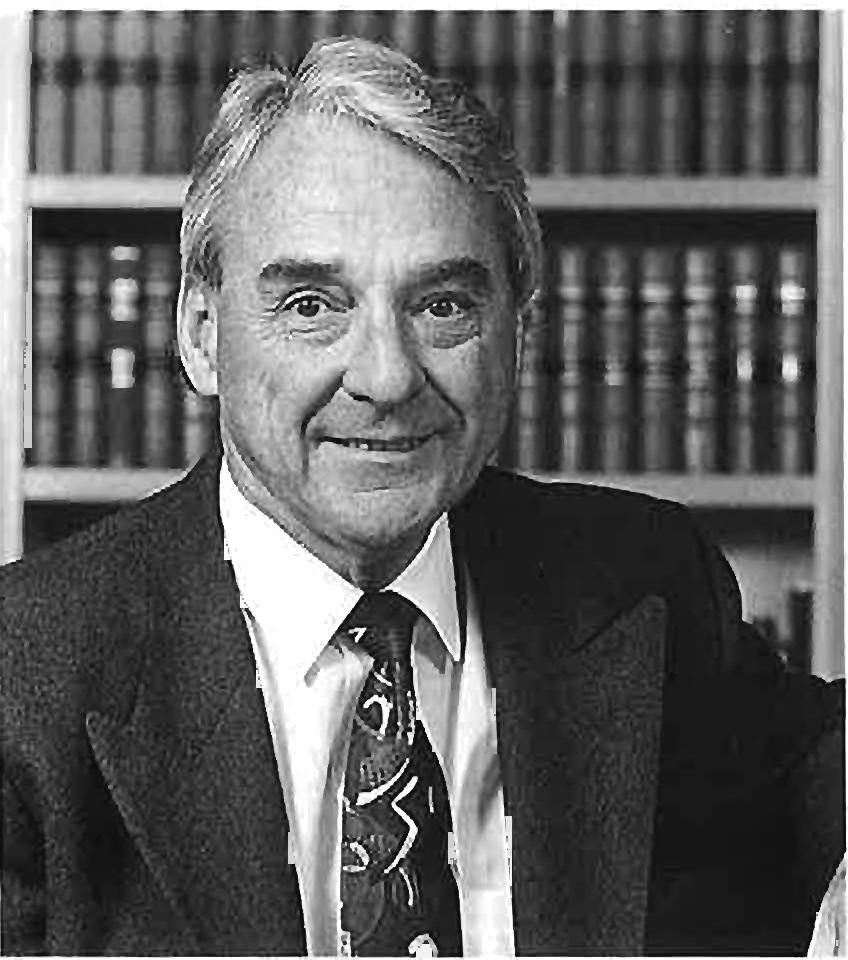

David Kendall Q.C.
The Supreme Court "Spring Offensive" is being closely monitored and a report will be issued at its conclusion. The Association conducted a most successful dinner on Friday, 28 August at the Victoria Club and Members were entertained by an excellent address from Coldrey J. The work done by Secretary Wodak and Treasurer Forrest in organising this dinner is greatly appreciated
David Kendall














Peter Barker
PETER ANTHONY BARKER WHO DIED on 13 August 1992 was a unique member of the Victorian Legal Profession in that he was successful in the three arms of the profession as a solicitor, a barrister and at the time of his death a member of the Supreme Court holding the office of Master of that Court.
I first met Peter at the lounge bar of the Menzies Hotel which was situated where the BHP Building now stands. It was in February of 1962 through a mutual friend Des Whelan then a junior member of the bar subsequently a Silk and at the time of his death Chief Judge of the County Court. Des was an old friend of Peter's. They both served as Able-Seamen in Minesweepers in the Royal Australian Navy towards the end of the Second World War and their friendship lasted through their University days and during their legal working life. Another distinguished fellow Able-Seaman was Richard McGarvie now the Governor of Victoria who needs little introduction to the lawyers of this State.
When I met Peter he had just moved into 470 Bourke Street, (now the Law Institute Building) and had committed himself to 2000 square feet of space, an enormous commitment at the time for a single practitioner. After a few more convivial drinking sessions at Menzies he asked me to join his Conveyancing Department to which I happily agreed. The "Department" I discovered in due course consisted of only me, a shared girl, and one client of substance, a land development company known as Evandale Estates.
Peter assured me that that company was our financial salvation. To my horror within 3 months of going into partnership with Peter, Evandale Estates was hit by the recession of 1962 and it went broke. Peter was a man with total confidence. He assured me that he was now the instant legal authority on Schemes of Arrangements and he so advised all the creditors of the company. Peter had a sharp legal mind and indeed he did make himself such an expert, supervised the scheme for Evandale Estates and we survived!
Peter started to interest himself in Taxation Law and within a very short time had built himself a reputation of being a skilled and client service orientated lawyer in complex tax matters. His team from the Bar always was, John Young Q.C. with Ron Castan as his Junior.
The three of them together appeared in many cases in the Victorian Supreme Court and on quite a few occasions conducted appeals to the High Court.
Peter had an impish sense of humour and many an enjoyable lunchtime was spent over toasted ham sandwiches dreaming of how we would all become rich and famous. Peter decided to run a test case on some tax matter and a shelf company had to be obtained to be the vehicle for the particular case. Peter suggested we name the company Naginal Pty. Ltd. and that was duly incorporated. Some time later when the case was ready for trial a certain Deputy Commissioner of Taxation one Mr. Lanigan was quite peeved when it dawned on him that the offending company was his name spelt backwards. Peter nearly choked over his coffee and pipe when it filtered through from the Taxation Department's lawyers that such frivolities were unbecoming of top tax lawyers.
Peter was always a frustrated barrister and after some 15 years as a solicitor he retired from the partnership which was then known as Barker Harty & Co., and went to the Bar. He quickly built up a practice in Commercial work and when the position of Master was offered to him he found his final niche in the legal profession that he dearly loved, and which was always an integral part of his life.
Peter was a devoted family man and was immensely proud of the achievements of his two sons and three daughters who are today scattered all around Australia pursuing their various careers. His wife Josephine was his companion and mentor through all his life.
In recent years Peter and I and a few old friends used to lunch once in a while and he always found an excuse to tell everybody about how many good times we all had as young lawyers. We worked hard but we seemed to enjoy ourselves more. Wednesday afternoon
golf for Peter was one of his joys, as was disappearing from his office lunchtime Fridays in summer to head for this beloved Lome and the surf which he enjoyed so much.
One of his favourite stories was to tell anybody who would listen how in 1967 I was hawking raffle tickets around the office for a Holden car for a school raffle . In desperation Peter bought a ticket and told me to sell them somewhere else. Some three weeks later at about 11.00 p m. on a Saturday night a very jolly Peter rang me to thank me for selling him the winning ticket for the Holden. To my acute annoyance I saw that I had bought the two tickets on either side of the winning ticket. Next Monday he took the morning off and promptly sold his rather weary Holden station wagon, and the prize Holden and turned up at the office with a brand new white Dodge Phoenix. I grumbled for weeks after that but Peter always offered me a ride home in "our car".
GERRY FITZGERALD WAS A MAN WHO always knew where he was going and a man who always counted his change. He was fair, faithful, just and dutiful: a qualified accountant of the highest intelligence and a canny lawyer who coupled great industry to a fixed weather eye on the next corner.
In spite of all this he was a generous friend and a loving husband and father.
He also had a sufficient sense of humour to make him possibly the best Crown Prosecutor of his generation.
One summer lunch time in 1978 he was standing on the steps of the County Court after obtaining a guilty verdict in a difficult and even dangerous case. Far from being happy at the compliments bouncing off his old lop-sided gown, he seemed to be concerned as he watched the throng walking away from the Court. When taxed with such inappropriate gloom after having a criminal menace locked away from society, he responded: "But look at the rest of them: all walking away FREE!"
After seeing active service in Bougainville in the Second World War he returned to a widowed mother, three younger brothers and one sister.
14
Peter had many friends not only within the law but also in the suburb of Brighton where he lived all his life and told us all it was the best place in Melbourne to live. He was a fun person, easy to get on with and always ready to help and counsel the young - and not so young - lawyers that worked in the practice.
It might not be fashionable to say so these days but Peter was a Christian in the literal sense of the word. A devout Catholic who was never backward in flaunting his religious beliefs. He was who he was and was never shy in telling people that his Catholicism was an all important and consuming way of life to him and his family.
A great lawyer has died, taken by the same illness that killed his closest friend Des Whelan. Peter always felt the death of his friend most personally. Those of us who knew Peter will experience the same personal loss of a fine man
He wanted to be a lawyer and enrolled at the Melbourne University where he studied his books at night whilst working full time during the day. He graduated without attending a single lecture and was admitted to practice in 1950 and signed the Bar roll one year later. He read with Alan Mann.
He married Rae Perry , a young Ansett air hostess, whom he met in 1965 whilst on a Fijian holiday.
He was appointed a Prosecutor for the Queen in 1967, Senior Crown Prosecutor in 1980 and took silk in that same year.
He appeared with distinction and success in some of the most notable trials of the era:
The Ronald Ryan murder; The Silver Gun Rapist; The Meat Industry scam; The Motor Registration scandal; and The MSS Robberywhich went to 6 trials before conviction because the criminals were either trying to get at the jury-men or the jury-men were trying to get at jury-women. (Gerry did not consider these events to be very funny at all.)
He retired as a Crown Prosecutor at "midnight 30 June 1984" and practised privately until he retired in 1991.
He is survived by his wife Rae, his sons Paul who is a doctor, and Richard who is an accountant , his brother John and his sister Arlette.
The Victorian Bar is better for the time he served in it.
BILL LENNON WAS BORN IN QUEENSland on 16 January 1929. He was first educated at Downslands College, Toowoomba. In 1943 he started at Xavier College in Melbourne where he completed his secondary education. He began a law course at Melbourne University 1948 and graduated in March 1952. His life at university was a rich and happy one. He made many friends who later became his colleagues in the profession. At university he developed a keen interest in the cinema and English literature. He played and followed the game of rugby union. He represented Downslands and had no difficulty in making the first XV at Melbourne University. He was incredibly enthusiastic about the sport. His good friend, Brian (Skinner) McCarthy, said to him at the time "It seems to me Bill th at you are the only real rugby player in the team". In his somewh at shy manner Bill replied "You are probably right" His nose was broken many times playing the sport. His colleagues remember him over those years as always having his nose in some type of perpetual plaster cast. While at university and in company with his good friend, Frank Hulls, he decided to train and enter another law student, Barry Hepworth, for the welterweight boxing championship. The training team was much involved in keeping Hepworth off beer and cigarettes, doing road work, training in the gym and the like It was great fun for all concerned except for the luckless Hepworth. Finally the great day arrived. Hepworth was the only chall enger as the previous year the champion had knocked out both his opponents. The old Wilson Hall was packed to the rafters to see another usurper put to sleep! However Bill Lennon had put "his boy" through an arduous physical and psychological program. Hepworth entered the hall with a towel over his head and an old silk dressing gown dr aped over his shoulders which had adorned on the back the words "Battling Barry Hepworth". His entrance had the crowds in fits of laughter which continued for almost the whole three rounds of the fight. During the contest "Battling Barry" held on to the Champion with a frenzied bear hug and literally waltzed him around the ring despite the desperate efforts of the referee to break them apart. In the last 30 seconds the referee finally separated them. As he did so Barry shot out a left hand which hit the Champion in the face. It was the only scoring blow . Barry was crowned the Champion.
Although the fight was won by Barry Hepworth the tactical honours were of course due to Bill Lennon . In 1952 Lennon began his articles with Ray Dunn. On 5 February 1954 he signed the bar roll reading with the late Ben Dunn. In his early days at law school he professed his intention of going to the bar and specialising in criminal law. If he ever had any doubts as to his ultimate career, his thoughts were crystallised early in his final year at law school when he sat through the whole of the first day of the trial of John Bryan Kerr who was charged with murder and defended by R.C. Monahan Q.C. Monahan was at the height of his powers. His defence of Kerr was superb theatre. In the end the jury failed to agree but Bill Lennon was certain he would be acquitted. His friend Brian McCarthy who accompanied him to the Court was just as certain that Kerr was guilty. When pressed by Lennon for a reason he said "I just don't like the look of him". Bill's dry response to that was to say "with such a sound and logical mind you are likely to go a long way in the law!"
In his early years at the Bar Bill Lennon was briefed in a wide range of matters and not exclusively in the criminal field. In one particular matter he represented a Mrs. Bennett who was seeking maintenance from her husband. In those days maintenance cases got a low priority in the Court's petty sessions. The case finally got a start and was adjourned to another date part-heard. Bill had arranged to take a vacation. As a result he could not appear on the adjourned date. He was upset and most apologetic to his instructing solicitor. He returned the brief so as to arrange for another barrister to appear. On receiving the brief the instructing solicitor found a note inside with a cheque covering Counsel's fees for the second day Of course Lennon had no obligation to do so but such is an illustration of his generous and caring character.
In the 60's and 70's Bill Lennon built a flourishing practice at the criminal Bar. He was a fearless advocate. His sense of wit and theatre in front of a criminal jury are legend He always gave 125 % effort to his clients. He appeared as defence counsel in countless criminal trials. He wa s a tireless worker. However the stresses of his work caused him to enter a sad period of his life - sad for himself, for his wife and children and also his many friends. He got "a monkey on his back" -a drinking problem. Unfortunately, to appreciate fully his life and character this problem cannot be pushed into the background and must be acknowledged. It bedevilled him for a number

of years. However, to his eternal credit he finally overcame it and he never drank again. It did however, affect his great career. At his own request his name was removed from the roll of counsel on 30 September 1987. However some of his friends rallied to his support. The firm of Carol! & Dillon offered him a consultancy position and referred him work as an advocate to appear in the Magistrates' Courts. Other legal friends followed the same course. Gradually Lennon Q.C. rebuilt his practice in the area he loved best and doing the work he enjoyed most - defending clients charged with various offences before the Courts. He soon re-established his formidable reputation as a thoughtful but fearless advocate and learned in the law. It is so tragic that his resurrection within the profession he loved so much should have been cut short by his final illness.
Bill Lennon had a wide ranging interest in many sporting activities. He played golf with some interruptions for many years and on many courses. He was not the greatest of
THE BAR HAS LOST ONE OF ITS MOST astute criminal. advocates, and the Crown has lost a loyal and dedicated prosecutor with the recent death of Colin Hollis -Bee.
"Hyphen" as he was known had the rare qualities of being both an extremely skilled advocate and one who could also readily refer with accuracy to the law applicable. He constantly catalogued the criminal law as it was given by the superior Courts, digested it, and retained it in his mind, giving him an encyclopaedic understanding of his subject and making of him an opponent without peer for those who presented themselves unprepared.
Having read in the Chambers of the late John Mornane, he practised with great success defending impecunious accused. He left the Bar for a short while and soon after his return, with the blessing of the Bar Council , opened Chambers in Ballarat from where he enjoyed success, mainly on the Western District circuit. This move set the precedent upon which a number of provincial Chambers have been established. Upon his appointment as Prosecutor for the Queen, he took up residence in Melbourne but regularly commuted to Ballarat to be with his wife Jocelyn, who maintains a business in that city.
16
golfers but he was very competltlve. In his mature years he developed an interest in racing. For some years with the assistance of his friend, Jim Merralls Q.C he had an interest in a fine horse named "Watney" which won a number of important races including the Gadsden Stakes and The All Age Stakes for the Elders Handicap in Queensland.
Bill Lennon had a wonderful sense of humour and a rapierlike wit. He was also a man of great faith. He feared and loved his God. He was no "Sunday Catholic". He thought long and hard about his religious beliefs , the reasons for being on this earth and life hereafter. He gave generously of his time and effort to St. Vincent De Paul Society, the Parish of Deepdene and more recently and perhaps more strikingly to Alcoholics Anonymous. He was a man of great courage as he demonstrated throughout the whole of his life and particularly in the last few years. He has made a lasting and vivid impression on us all. Long will the Bar remember the name of Bill Lennon Q .C.
Hyphen was something of an enigma . His interests ranged well beyond the law and into the fields of, inter alia, philosophy, religion, science and history, as well as the domestic skills of cookery and gardening.
This gentle man earned our respect and was given it. He will be missed.
House Law Group Women's Auxiliary invites you to a Christmas Luncheon at International House on Monday, 23 November 1992.
Guest Speaker: Mrs Jean McCaughey "Office of Governor and its History"
Ticket Secretary: Mrs. D. Lazarus 11 Murray Street Armadale Vic. 3143
Phone 822 7491


By Philip L. Williams
This is a paper presented by Dr. Williams of the Graduate School of Management, University of Melbourne to the 21st Conference of Economists, held at the University in July 1992. The paper is reproduced with the consent of the author.
At present in Australia, three government inquiries into access to justice are proceeding. The inquiry with the widest coverage in the press has been the inquiry by the Senate Standing Committee on Legal and Constitutional Affairs chaired by Senator Barney Cooney. The inquiry that has created the sharpest reaction from the profession is that of the Law Reform Commission of Victoria. And the inquiry which is likely to have the greatest impact on the structure of the profession is that which the Trade Practices Commission has recently started as part of its inquiry into the Regulation of Professional Markets in Australia.
The object of this paper is to sort out the principal issues before these inquiries. In particular, the paper argues that some of the issues before these inquiries are far more important than others, and that the ranking of issues by an economist may be quite different from the ranking of the issues by those who are responsible for the inquiries.
The paper attempts to clarify debate over the restrictions on competition in the provision of legal services. Competition in any market (or sub-market) can come from two possible sources: (i) rivalry within a market (or submarket) can act as a competitive restraint; (ii) the threat posed by potential entrants can act as a competitive restraint. The paper is organised around this system of classification.
After a section which clarifies the distinc-
tion between competition and monopoly, the paper examines external competition (entry conditions) and internal competition in the market for legal services. That market can be considered either as a whole or as two distinct sub-markets: barristers and solicitors. So, after the paper examines entry to and competition within the market as a whole, it moves to examine entry to and competition with the submarkets of barristers and then solicitors.
The word "monopoly" is not an unambiguous term of art in economics. The word can have different shades of meaning in different contexts. Depending on the context, the term can refer to industry concentration (as in the Cournot model), market power (as in antitrust), misallocation of resources (as in Harberger and von Weisacher) and so on. Much of this range of meanings has existed for well over a century. In the early classical period, the term was used to refer to restrictions on the free flow of resources - Williams (1978) 35-9. In 1838, Cournot defined it as a single seller. At the beginning of this century the leaders of the economics profession had formulated the antitrust notion of monopoly power - as a freedom from competitive restraints. See Williams (1990).
This variety of meanings should cause economists to exercise caution in using the word, so that one's meaning is plain. But there is another reason for caution: the word has judgmental overtones. Indeed, in a famous paper, Mason (1937) argued that, as used in law, the term "monopoly" was not a tool of analysis but a standard of evaluation.
Given this imprecision of the word and its judgmental overtones, the willingness with which economists use the word in debate over issues of public policy is alarming. In public debate, the word has become a term of abuse rather than a tool of analysis and, because of this, it should be used with great caution.
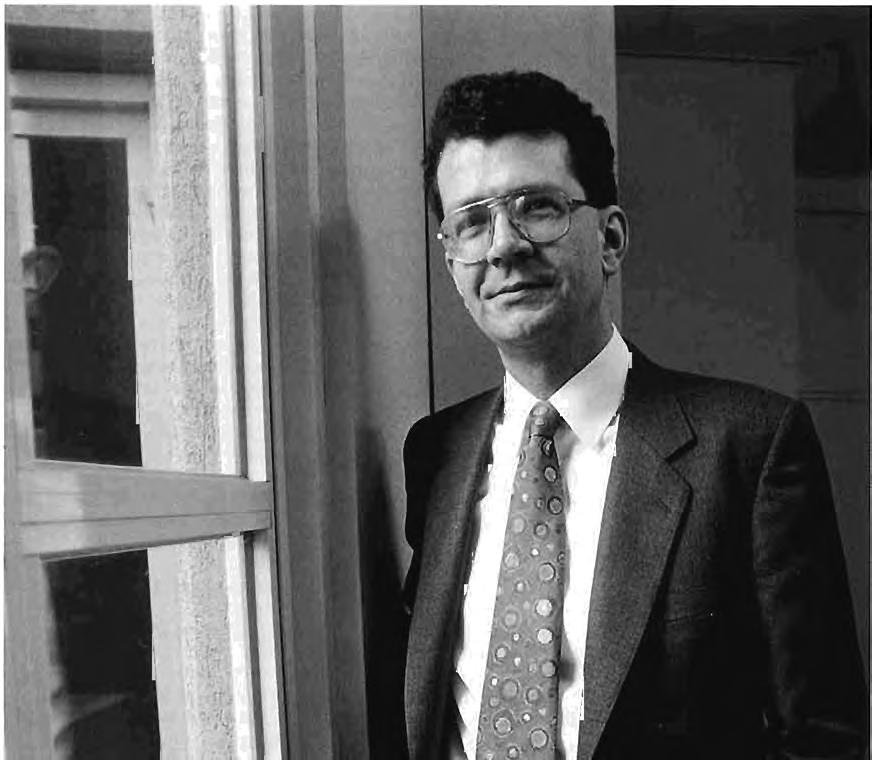

Dr. Philip L. Williams
Among many recent instances of labelling as monopolistic the provision of legal services, perhaps the least judicious has been a monograph published by the Tasman Institute, Monopolistic Restrictions in Provision of Advocacy Services. See Moran and Barns (1992). The monograph uses the word monopoly in
two quite distinct ways. The first meaning given to the word is found in the last few sentences of page 5. The word is used of a pricemaker as distinct from price-taker. This section of the monograph contains much that is confused and some that is plain wrong. For example, the penultimate sentence on page 5

states: "A supplier in a competItIve market accepts the price as given and produces up to the level beyond which any incremental costs are covered". This is contrasted with a monopoly where" ... each additional unit of production will lower the price of all goods supplied. The industry supply curve becomes the one firm's supply curve". This is nonsense. It does not make sense to write of the supply curve of a monopolist.
A second meaning is given to the word "monopoly" at the top of page 7: "Strictly speaking, monopoly refers to only one provider, but the basic pattern prevails in cartels of different firms. Monopoly is characterised by barriers to entry and by competitive restrictions on behalf of its members, with the usual upshot that prices are higher than occur under competition". The following two pages refer to monopoly mainly as a group of enterprises with market power. The pages place particular emphasis on barriers to entry. The relationship between the "strict" meaning of monopoly on pages 5 and 6 and the "basic" meaning given on pages 7 and 8 is never explained.
tightly knit aSSOCIatIon (whatever such costs may mean) decline with respect to output "conditions which might allow a natural monopoly to prevail are created". This notion of a tightly knit association as a natural monopoly is quite at variance with standard textbook definitions of natural monopoly - such as Sharkey (1982) - where natural monopoly is a market whose production can be undertaken more cheaply by a single producer than by multiple producers.
The confusion of the monograph over the meaning of monopoly is apparent from the first sentence of section 4, entitled "Monopoly and the Victorian Bar": "The provision of 90 percent (sic) of advocacy services in Victoria by lawyers operating within a framework of rules set by the Victorian Bar Council has many of the hallmarks of monopoly, but does not necessarily constitute a monopoly".
This confusion is never clarified. The argument about monopoly is not visited again until section 7 - Conclusion - where it gets a good running. Despite the confusion of sections 3 and 4, the Conclusions confidently state the following: "But, although the Bar is not a legislated monopoly, with a market share of over 90 percent (sic) its members collectively exercise monopoly powers"
The confusion of the monograph over the meaning of monopoly is apparent from the first sentence of section 4, entitled "Monopoly and the Victorian Bar": This confusion is never clarified.
. . . "The deep traditions of the legal profession operates (sic) within the monopoly of domestic courts over most forms of legal dispute. This, in turn, appears to be supported by a "collusion" of the court monopoly's leading players - the judges - to create an effective monopoly over advocacy services. In many respects this monopoly is more powerful than that which stock exchanges exercise over the trading in securities - to adopt one test of monopoly, arguably it is less open to rival suppliers of the service".
This conclusion is alarming because it relies on a proposition that has been neither explained nor argued: that the bar is a monopoly. If economists are to help the cause of public debate they must be careful in the use of the word "monopoly".
Sections 3.2 and 3.3 of the monograph explore the relationship between the Victorian Bar and natural monopolies. These sections are both confused and irrelevant. They state that the Victorian Bar argues that its dominance is due to its being a natural monopoly (page 8). The reference to the argument is not given. The sections state that if the marginal costs of a
Before one can practise law in Australia one must obtain a licence. In a Background Paper for the Senate Standing Committee on Legal and Constitutional Affairs, Ian McEwin (1992) Chapter 3 elaborates on the distinction between legal services (advice on matters to do with the law) and lawyer services (that sub-set of legal services that one needs a licence to provide). One of the issues before the Senate Inquiry is the extent to which services should be restricted to those who have obtained licences.
The argument for the retention of some restrictions is generally based on two propositions: (i) that consumers are poorly equipped to evaluate the quality of legal services; and (ii) that the consequences of their making a mistake in the evaluation may be disastrous. The conclusion is that consumers should be protected from the possibility of making mistakes by a licensing system that excludes very low-quality practitioners from offering services. McEwin suggests that licences could be given to those who wish to offer particular types of legal services. For example, legal services could be classified along the following lines:
the home: e.g. conveyancing, home insurance, disputes with neighbours
• the family: e.g. marriage, divorce, wills, adoption etc
• employment: e.g. employment contracts, discrimination, workers' compensation, dismissal, entitlements, etc
• relations with government: e.g. immigration, welfare benefits
• consumer protection: e.g. product liability, sale of goods, debts
• commercial' transactions: e.g. setting up a business, taxation, insolvency, intellectual property rights, commercial insurance
• accident compensation
• criminal law matters
• superior court appearances (page 17).
Persons who have expertise in one of these areas could be licensed to offer services in that area.
A more radical step would be to remove the requirement for a licence from some or all of these areas. A favourite candidate in many jurisdictions is conveyancing. In one of the few empirical contributions to debate over access to the law, Domberger and Sherr (1989) examined the impact on pricing of the breakingdown of the restriction that conveyancing in England and Wales could be undertaken only by lawyers. They concluded (page 55):
"The emergence of a threat of new entry into the field was sufficient to set in motion strong competitive forces within the profession. Fees started to fall in 1984, following the policy announcement to liberalise conveyancing, and a full three years before licensed conveyancers entered the market. By 1986 the discriminatory element in the combined fees charged for sales and purchases of property had fallen by one third - from £6 to £4 per £1,000 of property value."
As the authors acknowledged, one feature of the study by Domberger and Sherr was that the licensing requirement had bolstered effective collusion on prices. Of course, that need not be
The investment in training that is needed to get a licence may be considered as an investment in assets
... The rate of the return on the investment will not be monopolistic unless there js a restriction on access to training.
the case. It may be that competition within the profession is sufficiently strong to produce competitive pricing while, at the same time, conveyancing services are reserved for licensed lawyers.
One final observation should be made: a compulsory licensing system does not necessarily create monopoly returns. The investment in training that is needed to get a licence may be considered as an investment in assets that are needed to enter any market. Although the investment will raise the price of the services, the rate of return on the investment will not be monopolistic unless there is a restriction on access to training. That is, if gaining a lawyer's licence yields monopoly returns, the cause is the state-controlled system of legal education rather than the system of licensing.
In its discussion paper which heralded its series of inquiries into various professions, Regulation of Professional Markets in Australia: Issues for Review, the Trade Practices Commission (1990) identified "three common causes of market failure" (information problems, transactions costs and externalities) that might be used to analyse regulation of the professions. Although, as noted in the previous section, information problems are generally used as a justification of restrictions on entry

to a profession, restnctlOns on competition among incumbents can best be justified on other grounds.
At its heart there is a near-insoluble agency problem in the provision of legal services. One element is the standard agency problem of the lawyer as the agent of the client. The lawyer has a fiduciary relationship with the client: the client trusts its lawyer to act in its own best interests rather than pursuing their own interests. This gives rise to the standard agency problems.
But, in addition to these standard problems, the lawyer owes a duty to the court. In effect, the lawyer who litigates on behalf of a client is constrained by a duty the lawyer owes the court. The precise nature of this duty is anything but clear, so the lawyer is obliged to make judgements among three conflicting interests: (i) self interest; (ii) interests of the client; and (iii) interests of justice as conveyed by the duty to the court. Much of the agonising by lawyers before the three current inquiries reflects unresolved (unresolvable?) conflicts among these three interests.
Perhaps the two most controversial marketwide restrictions on competition among incumbents are contingent fees and restrictions on advertising. Contingent fees are success fees in litigation; but what is proscribed is open to debate; see Law Reform Commission of Victoria (1991) 22-37. In its recent Report, the Commission (1992) recommended that Parliament repeal the relevant sections of the Legal Profession Practice Act 1958 and the Supreme
Perhaps the two most controversial market-wide restrictions on competition among incumbents are contingent fees and restrictions on advertising. Contingent fees are success fees in litigation; but what is proscribed is open to debate.
Court Act 1986 so as to remove the existing legislative restrictions on contingent fees. This would give the lawyer and the client more freedom to negotiate contractual arrangements that suited them. This, of itself, is undoubtedly a benefit.
The objections that the Victorian Bar has raised to the proposal have to do with the agency problems outlined in the first paragraph of the section. It argues that a contingent-fee contract may cause lawyers to resolve conflicts of interest more in favour of the lawyer at the expense of the client; and more in favour of the client at the expense of justice
Restrictions on advertising are difficult to justify. If one of the principal problems with the market for legal services is the flow of information between producers and purchasers, it is hard to justify restrictions on advertising which impede that flow.
There are no special restrictions on entry to the solicitor sub-market - apart from restrictions to the market as a whole. But there are restrictions on competition among incumbent solicitors.
The most controversial of these is that solicitors are prohibited from sharing the profits of their practices with people who are not solicitors. Although this is not a barrier to incorporation, in general, only solicitors can be directors or shareholders of the company and the company's sole purpose must be the practice of law.
The Law Reform Commission of Victoria (1992) recently recommended that these restrictions be removed so that national and international legal practice and multi-disciplinary practices would be options available to lawyers.
In any analysis of restrictions on competition in legal services, this topic is at once the most important and the least understood. The various bar associations have quite detailed restraints on the ways in which their members may compete with each other although, in general, these restrictions do not cover fees. Rather, they relate to: (i) only being engaged by a solicitor; (ii) not performing the work of a solicitor; (iii) being a sole practitioner; (iv) not appearing with a solicitor; (v) having chambers approved by the bar; (vi) engaging a clerk; and (vii) not attending the office of a solicitor.
The bars argue that they are voluntary associations and that lawyers who do not wish to offer the type of service offered by members of the bar are free to appear as advocates. In fact, with the exception of a few advocates who specialise in criminal cases, almost all advocacy work before the Supreme Courts, the Federal Court and the High Court is undertaken by members of the various bars The bars argue that this shows the superior efficiency of persons who choose to offer the type of service set down in their rules. They argue that if other arrangements were efficient, they would flourish - there is no legal obstacle to other arrangements for the provision of expert adversary services.
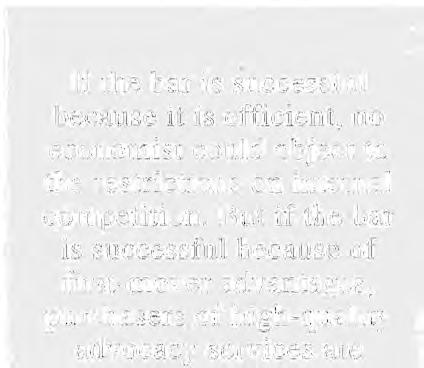
being denied the variety of
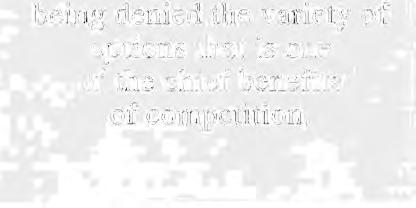
This argument is powerful ; but there are at least two alternative explanations of the success of the members of the bar in securing the work of advocacy before the superior courts. Both of these deserve further investigation.
The first possibility is the power of the judges in favouring members of their old club. This is the allegation of the monograph by Tasman. It refers to a monopoly of domestic courts that " .. . appears to be supported by a 'collusion' of the court monopoly's leading players - the judges - to create an effective monopoly over advocacy services". (p. 21)
The second possible explanation is an
advantage of incumbency coupled with certain rules of the bar. The profession was traditionally bifurcated along English lines. Because of the rule that a member may not appear with a solicitor, young solicitors do not get a chance to receive the on-the-job training that is so essential for an advocate. In effect, the only way a solicitor can gain the training needed for expert advocacy is to stop being a solicitor and to join the Bar Association. And once solicitors are successful members of the club, they tend to stay on as members.
Perhaps the most important step towards pushing the debate over competition in legal services forward would be if these two alternative explanations could be investigated further. If the bar is successful because it is efficient, no economist could object to the restrictions on internal competition. But if the bar is successful because of first-mover advantages, purchasers of high-quality advocacy services are being denied the variety of options that is one of the chief benefits of competition.
COURNOT, Augustin (1838), Researches into the Mathematical Principles of the Theory of Wealth , translated by Nathaniel T. Bacon with an essay by Irving Fisher (New York: Macmillan, 1929).
DOMBERGER, Simon and SHERR, Avrom, "The Impact of Competition on Pricing and Quality of Legal Services", International Review of Law alld Economics, 9, 41-56.
LAW REFORM COMMISSION OF VICTORIA (1991), Restrictions on Legal Practice, Discussion Paper No. 23 (Melbourne: LRCV).
LAW REFORM COMMISSION OF VICTORIA (1992), Restrictions on Legal Practice, Report No. 47 (Melbourne: LRCV).
MASON, Edward S. (1937), "Monopoly in Law and Economics", The Yale Law]ournal , 47.
McEWIN, Ian (1992), Access to Legal Services: The Role of Market Forces, Paper prepared for the Senate Standing Committee on Legal and Constitutional Affairs Inquiry into Cost of Legal Services and Litigation (Canberra: Parliament of the Commonwealth of Australia).
MORAN, Alan J. and BARNS, Greg (1992), Monopolistic Restrictions in Provision of Advocacy Services, A Report Prepared for the Law Reform Commission of Victoria (Melbourne: Tasman Institute).
SHARKEY, William W. (1982), The Theory of Natural Monopoly (New York: Cambridge University Press).
TRADE PRACTICES COMMISSION (1990), Rellulation of Professional Markets ill Australia: Issues for Review (Canberra: Commonwealth of Australia).
WILLIAMS, Philip L. (1978), The Emerllence of the Theory of the Firm (London: Macmillan).
WILLIAMS, Philip L. (1990), "The Attitudes of the Economics Professions in Britain and the United States to the Trust Movement, 1890-1914", in John D. Hey and Donald Winch (eds.) A Century of Economics (London: Basil Blackwell).


By The Honourable M.E.J. Black, Chief Justice, Federal Court of Australia
[This paper was delivered by Chief Justice Black at the ABA Conference in Edinburgh in July this year.}
George Arnot Maxwell, who practised at the Victorian Bar from 1891 until the early 1930s 2 was described by Robert Gordon Menzies as the greatest criminal advocate he had ever heard) One of the great advantages Maxwell had was a fine Scots burr which, Menzies records, he used to enormous effect in hypnotic addresses to the jury. It would be unwise for me to attempt to reproduce Max well's burr here in Edinburgh - for several reasons - but I can reproduce the whole of Maxwell's final address on behalf of the accused before a Ballarat jury in a seemingly hopeless case where the accused had been virtually caught in the act. This was Maxwell's address: "Gentlemen, you may think it veray probable that the accused stool the sheep . . . but can ye be cerrtain?"
That was all. Maxwell sat down. The jury took five minutes to return a verdict of "Not Guilty".4 To copy would be to invite disaster, but it was a triumph in the right hands, in the right case, at the right moment - and with the right accent.
By way of contrast, let me read some observations made by Hunt J in the case of Dib.5 It was alleged that the trial had miscarried because counsel had not cross-examined properly (which may have meant to the client that counsel had not cross-examined for long enough or crossly enough - the point and glare style of cross-examination 6 still seems popular with clients everywhere, whatever its forensic deficiencies),
Hunt J said:
24
"Styles of advocacy differ for different advocates. Some advocates would obviously be satisfied with the admissions made Others would prefer to keep going, extracting every ounce - no matter how repetitive or remote - until the eyes of every juror were glazed over , The point is that different counsel have different views as to the effectiveness of such cross-examinations."
I would prefer Maxwell every time. Of course, Maxwell was not always as economical as he was that day at Ballarat. According to Menzies,7 juries were invited to be as astute to find doubts as "they would be in their own cause on the dread dee of judgment itself", But the point is that each instance highlights the difficulty of making fair judgments about advocacy and highlights the vast range of acceptable advocacy.
Nevertheless, things sometimes happen in the course of counsel's conduct of a trial that all would recognise as blunders. It is of course settled law in England,8 New Zealand9 and Australia lO (although not in Canada!!) that at common law a barrister cannot be sued by a client for loss suffered as a result of a blunder in court. Counsel are immune from suit for incourt negligence.
The circumstance that those who appear in the courts are now in a virtually unique position in their immunity from suit by their client for loss occasioned by the negligent performance of their in-court duties seems to have focused criticism on the Bar itself as the supposed principal beneficiary of the immunity, and for seeking to maintain it. Whatever views are held about the weight of the individual policy considerations that are the foundation of the modern law, there are several important matters that ought to be borne in mind if the position of barristers and their clients is to be viewed in its proper perspective.!2
The first is that in-court immunity does not exist for the purpose of protecting barristers. The immunity exists because it is considered that high reasons of public policy compel it. The comfort of the Bar is not among those reasons.
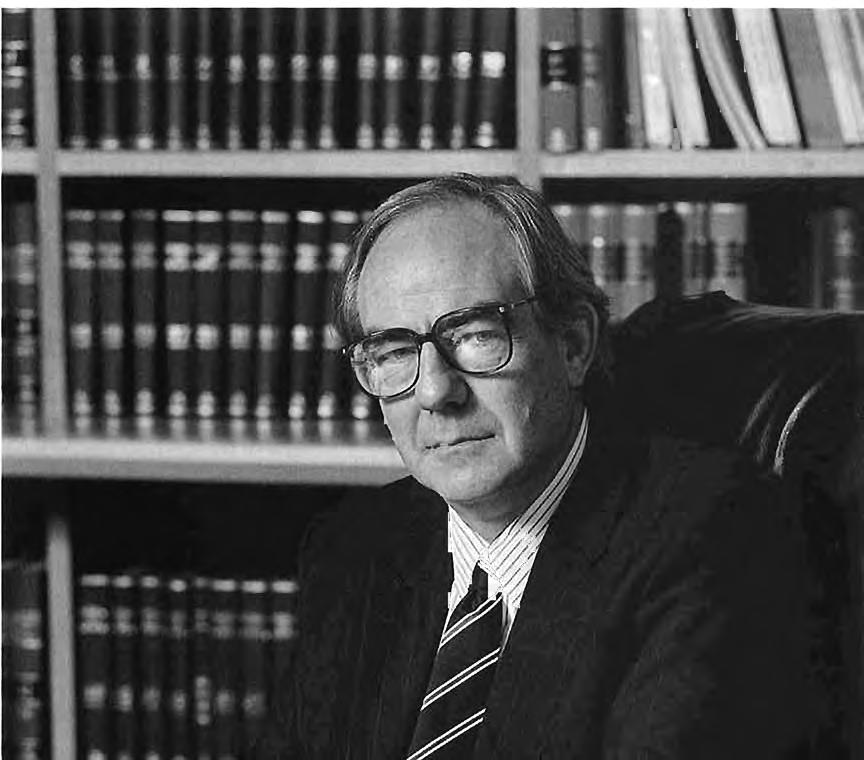
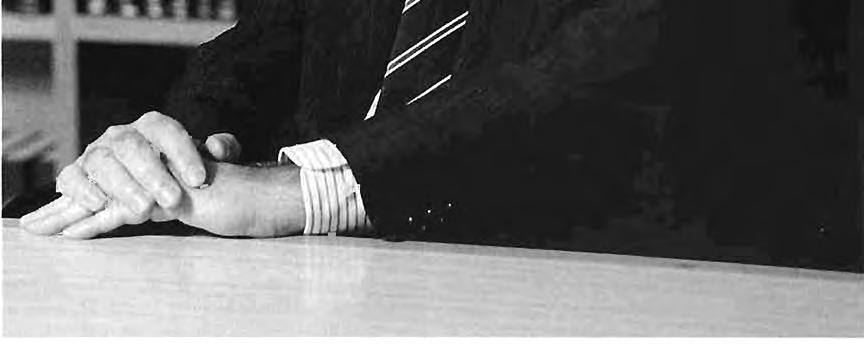
The Honourable M.E.l. Black, C.J.
The second, as will appear from what I say later in this paper, is that in-court immunity from suit has not meant immunity from scrutiny in the appellate courts in criminal cases. Although precise figures are not available, it would seem that in Victoria alone there
are, each year, cases in which the Court of Criminal Appeal is asked to set aside a conviction on the ground that a miscarriage of justice has occurred by reason of mistakes said to have been made by counsel at the trial.) 3 I refer to some of these cases later but I should

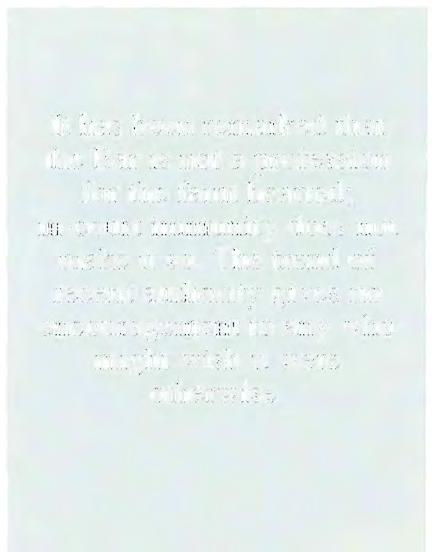
note at the outset that it is very rare for such a ground to be found to have substance. It has been remarked that the Bar is not a profession for the faint hearted; in-court immunity does not make it so. The trend of recent authority gives no encouragement to any who might wish it were otherwise.
This brings me to the third matter, which is the role of the appellate process in providing redress for the failings of counsel.
In this paper, I propose to note the foundations in public policy upon which the immunity rests, to note the extent of the immunity and to examine in more detail the way in which the law, through the appellate process, may deal with cases in which it is claimed that counsel's lack of proper care has affected the outcome.
It will be apparent that I have taken the topic of in-court immunity to cover only immunity from suit for negligence. There are of course other immunities, conferred in the public interest on those engaged in the administration of justice, whether as judge, juror, witness, party, counselor solicitor, in respect of what they say in court. 14 The high reasons of public policy underlying the existence of these immunities are abundantly clear and do not appear to be under challenge.
The immunity of barristers from suit on account of their conduct of a case in court has
been recognised in England for more than 200 years.l 5 The foundations in public policy of the modern law were comprehensively examined in Randel v. Worsleyl6 where five distinct grounds were considered by the House of Lords. They may be summarised as follows: 17
1. Duty: The concern that if counsel could be sued for negligence, they would be tempted to prefer the interests of their clients and would be deflected from observing their duty to the Court;
2. Defensive advocacy: The adverse effect that the fear of litigation may have on the barrister's efficient conduct of the court proceedings;
3. The "cab-rank" principle: The principle whereby a barrister is not free within his field of practice to choose whether or not to act for a person who desires his services and can pay his fee;
4. Privilege: The special character of the judicial process wherein judges, jurors and witnesses are immune from civil action; and
5. Finality: The threat to the public interest centred in the finality of litigation.
Varying weight has been given to these policy grounds by different judges. In the leading Australian case, Giannarelli v. Wraith,18 decided by the High Court of Australia in 1988, Mason CJ considered that of the various public policy factors that had been put forward to justify the immunity, only two warranted serious examination.l 9 The first related to the peculiar nature of the barrister's responsibility when appearing for a client in litigation and the second arose from the adverse consequences for the administration of justice which would flow from the re-litigation, in collateral proceedings for negligence, of issues determined in the principal proceedings. His Honour placed particular emphasis upon the peculiar feature of counsel's responsibility in owing a duty to the court as well as to the client and in the duty to the client being subject to the overriding duty to the court. 20 Wilson and Brennan JJ also emphasised the importance of the ground of public policy based upon counsel's duty whilst Dawson J placed little weight on the ground, giving greatest weight to what I have termed (it is a simplification) the "privilege" ground.
The differences in weight accorded to the various grounds should not obscure the fact that they are all based upon considerations of public policy and, as Mason CJ said in Giannarelli, the exception the law creates is not to benefit counsel but to protect the administration of justice. 21
The boundaries of the immunity were considered by the House of Lords in Sail Ali v. Sydney Mitchell & Co.2 2 where the issue was whether the immunity extended to advice given by a barrister about the parties to an action in a motor accident case. By a majority, the House of Lords, whilst accepting that the immunity was not confined to what was done in court and included some pre-trial work, rejected any unrestricted immunity. There are, however, no precise boundaries. In Giannarelli Mason CJ summarised the position as follows:
"The problem is: where does one draw the dividing line? Is the immunity to end at the courtroom door so that the protection does not extend to preparatory activities such as the drawing and settling of pleadings and the giving of advice on evidence? To limit the immunity in this way would be to confine it to conduct and management of the case in the courtroom, thereby protecting the advocate in respect of his tactical handling of the proceedings. However, it would be artificial in the extreme to draw the line at the courtroom door. Preparation of a case out of court cannot be divorced from presentation in court. The two are inextricably interwoven so that the immunity must extend to work done out of court which le a ds to a decision affecting the conduct of the case in court. But to take the immunity any further would entail a risk of taking the protection beyond the boundaries of public policy considerations which sustain the immunity. I would agree with McCarthy P in Rees v. Sinclair [1974] 1 NZLR 180, at p. 187, where his Honour said: ' . .. the protection exists only where the particular work is so intimately connected with the conduct of the cause in Court that it can fairly be said to be a preliminary decision affecting the way that cause is to be conducted when it comes to a hearing. '
This persuasive statement of the limits of the immunity was indorsed by four members of the House of Lords in Saif Ali."23
It is clear then that there is no "blanket immunity" for out of court work. In Sail Ali Lord Salmon, after pointing out that a barrister is under no duty to be right, but only under a duty to exercise reasonable care and competence, and that the fact that his view may turn out to be wrong certainly did not mean that he had been negligent, continued: "In my opinion, however , it can only be in the rarest of cases that the law confers any immunity upon a barrister against a claim for negligence in respect of any work he has done out of court ... ".24
It has been suggested that most paperwork done by counsel will not be covered by the immunity25 but the example Lord Salmon gave of advice for which the barrister would be immune should be noted. The circumstances contemplated were those in which, in an advice on evidence, counsel stated that he would not
call a particular witness, whom he believed his client wished to call solely to prejudice his opponent. In such a case the advice would be so closely connected with the conduct of the case in court that it should be covered by the same immunity.
The immunity extends to solicitors acting as advocates.26 The same public policy grounds, except the "cab-rank" ground, apply to solicitors acting as advocates.27 In Giannarelli, Mason CJ, Wilson, Brennan & Dawson 11 drew no distinction between barristers and solicitors on the issue of liability for in-court negligence, an important consideration in jurisdictions where the profession is fused. Wilson J28 noted that in Randel and in Saif Ali the majority of the House of Lords, "speaking of the common law of England and Scotland", held that a solicitor acting as an advocate has the same immunity from an action for negligence as a barrister and Wilson J also accepted this reasoning. In respect of out of court work by solicitors, however, there is no immunity.
Thus the boundaries of the immunity are no wider than the public policy considerations that underlie the immunity required.
The capacity of the appellate process to correct error is indispensable to the administration of justice. The reach of the appellate process needs to be, and is, very wide. But how far











A solicitor an advocate same immunity from an action for negligence as a barrister. In respect of out court work by solicitors, however, there is no immunity. Thus the boundaries of the immunity are no wider than the public policy considerations that underlie the immunity required.

does it extend to provide a remedy for the failings of an advocate?
The idea that the appeal process may provide a remedy for blunders is by no means new. The existence of a remedy through the appellate process for counsel's error causing a miscarriage of justice was referred to briefly by Lord Denning MR in Randel v. Worsley.29 I pause to note that this case did not involve an ideal plaintiff. The plaintiff was an enforcer for a slum landlord known as "Freddie the Ear" due to his propensity for biting off ears in the course of his employment.3 0 True to form, Freddie was charged with biting off the ear and tearing the hand of a doorman at one of the landlord's premises. The plaintiff claimed to have used only his bare hands and told the judge at first instance: "I tore his hand in half and bit part of his ear off". Before the Court of Appeal "he exulted in his achievement" and said "It sounds difficult in cold blood, but I can demonstrate it". Lord Denning observed: "We did not accept the offer": Randel v. Worsley)l The defendant, the plaintiff's counsel, received a dock brief to represent the plaintiff. Six years later, the plaintiff attempted to sue him for negligence.
In the course of his judgment, Lord Denning powerfully stated the case against re-litigation. His Lordship said of the plaintiff, Worsley: "He has already been tried by a jury and been convicted. He has already put his complaint against his counsel before the Court of Criminal Appeal. If there had been any miscarriage of justice, the court would have taken steps to correct it. They were satisfied that there was none. They rejected his application. Is he to be allowed to canvass his guilt or innocence again in a civil court? And try the case afresh in an action against his own counsel? I cannot think that this would be right. Once a man has been convicted by a jury of a crime, and his appeal has been rejected, he should not be permitted to challenge it again in a civil court. He cannot sue the judge saying that he misdirected the jury. He cannot sue a witness saying that he committed wilful perjury. Nor should he be permitted to sue his own counsel, saying that he was negligent. Test it this way. Suppose he were to succeed, as between himself and his counsel, in showing that he was wrongly convicted. The Crown would not be bound by that decision. We would have a criminal court sentencing him to imprisonment on the footing that he was guilty, and a civil court awarding him damages on the footing that he was not gUilty. No system of law could tolerate such a glaring inconsistency. The Home Secretary would be bound to refer the whole case to the Court of Appeal, as he did in Hinds' Case. (unrep.) ... The Court of Appeal might still affirm the correctness of the conviction, as in Hinds' Case. So you would have the spectacle of a man, found affirmatively to be guilty, recovering damages
28
on the footing that he was innocent. That should not be allowed.
Finally, on public policy, I would say this. If this action were to be permitted, it would open the door to every disgruntled client Every convicted prisoner who blamed his counsel could at once bring an action for negligence. Rather than open the door to him, I would bolt it."
In dealing with the same question in the House of Lords, Lord Morris of Borth-y-Gest32 said:
"A system which is devised so as to provide adequate and reasonable safeguards against the conviction of innocent persons and to provide for appeals must nevertheless aim at some measure of finality. If the system is found not to be adequate then it can be altered and modified: it can be kept continually under review. I cannot think, however, that it would be in the public interest to permit a sort of unseemly excrescence upon the legal system whereby someone who has been convicted and has, without success, exhausted all the procedures of appeal open to him should seek to establish his innocence, (and to get damages) by asserting that he would not have been convicted at all but for the fact that his advocate failed to exercise due skill and care."33 (My emphasis.)
In Giannarelli Brennan J34 observed that it was better to maintain the immunity "and to rely upon the publicity of court proceedings, judicial supervision, appeals, peer pressure and disciplinary procedures to prevent neglect in the performance of counsel's duty and to avoid any injustice which might result therefrom in an individual case". In the same case Wilson J35 and Dawson ]36 recognised that the way in
The existence of a remedy through the appellate process for counsel's error caUSIng a miscarriage of justice was referred to briefly by Lord Denning MR in Rondel v. Worsley. I pause to note that this case did not involve an ideal plaintiff.
which a trial has been conducted by a practitioner appearing for an accused may afford a ground for appeal if it results in the miscarriage of justice. Each of their Honours cited Re Knowles.37 In the judgment of the Full Court of the Supreme Court of Victoria in Wraith v Giannarelli38 the court, having discussed the policy grounds supporting the immunity, observed:
"The possibility of an accused person's suffering an injustice by being wrongly convicted through the negligence of his counsel is reduced by the fact that, if it can be shown to the Court of Criminal Appeal without, of course, any questioning of the jury, such a thing is likely to have happened, that Court will set aside the conviction."39
Over sixty years earlier, in R v James McCa1l 40 one of the grounds of appeal against a conviction for wounding with intent to murder was that at the trial the accused's defence was not fully or properly stated, as was said to appear from affidavits filed in the appeal. The appeal was dismissed but Cullen CJ said: " . if the Court can see that either by some remissness, or defect of jUdgment, or neglect of duty, either on the part of the accused or of his couns el, testimony has been omitted which is seen to be of a kind suggesting that in its absence a miscarriage of justice had occurred, the Court would never hamper itself by any rule of practice so as to prevent a person wrongly convicted, or on sufficient grounds suspected to have been wrongly convicted, from having relief before the Court of Criminal Appeal." (My emphasis)41
Re Knowles 42 was such a case. The Full Court of the Supreme Court of Victoria (Crockett, McGarvie and Gobbo JJ) set aside a conviction for murder on the ground that counsel's error had brought about a miscarriage of justice. The Court considered McCall and other Australian and English authority and stated the position to be that provided the case is seen to be an appropriate one, the Court may interfere to protect an accused person from his own counsel and from the result of bad management or misconduct of his case at trial.
It was observed that the course to be taken in the conduct of the defence of an accused person was left to the judgment of the defence lawyers and that a trial would not be regarded as having miscarried if the accused had been afforded a proper opportunity for choice and a choice had been made by his legal representatives on his behalf. But amongst the various defects or omissions which may lead a trial to become unfair and to amount to a miscarriage of justice were circumstances which may be treated as vitiating the volition or choice by an accused or his lawyers to follow or refrain

The accused an wrongly the counsel is reduced by the fact that, if it can be shown to the court of Criminal Appeal . .. that such a thing is likely to have happened, that court will set aside the conviction.


from following some course at the trial:
"Some factors capable of amounting to vitiating factors, which are mentioned in the cases, are fraud, mistake, surprise, malpractice and misfortune and , with particular reference to defence lawyers, inexperience, remissness, defect of judgment or neglect of duty."43
The Court concluded that where there was a vitiating factor of this nature there might be circumstances where a failure to call important evidence which was available or could by reasonable diligence have been available to the defence, could amount to a miscarriage of justice regardless of whether it amounted to "fresh evidence" which, ordinarily, the failure to call would not involve the trial being unfair.
Knowles was not a case in which there was an attack on what might be characterised as a tactical decision by counsel. The error made by counsel was one of law and it was to the effect that evidence of fundamental importance to the defence was inadmissible and without prospect of being admitted. There was no forensic reason the court could see, other than error of law, that would have led counsel to decide not to call the evidence. The miscarriage of justice occurred because the evidence that was not led would have changed the defence position from one where, as a matter of forensic reality, the

prospects of acquittal were minimal to one where there was a real prospect of obtaining an acquittal. 44 The accused, in other words, was deprived by the error of his counsel of the chance of acquittal fairly open to him.
In the considerable number of reported Australian cases in recent years45 in which the conduct of counsel has been considered by courts of criminal appeal, the courts have continued to emphasise the very wide scope for the exercise of counsel's judgment in tactical and other matters affecting the conduct of a trial which cannot be a ground for legitimate complaint.
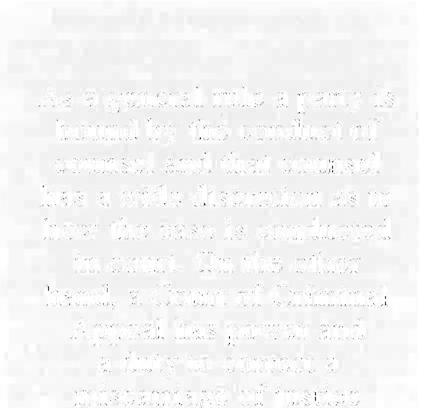

But whilst emphasising that the ultimate question is whether there has been a miscarriage of justice, the courts in Australia and New Zealand have not imposed any requirement that the conduct of counsel must be characterised as "flagrant incompetence"; rather, at least in some of the Victorian cases that apply Knowles, the question has been whether the conduct could be characterised as "remiss, or inappropriate or negligent,"46 or whether counsel's decision resulted from any error of law (as it did in Knowles) or was "the result of bad management or misconduct or inexperience".47
Similarly, in New Zealand it has been said that the cases do not turn on whether or not there has been negligence. In R v. Pointon 48
30
Cooke P, having stressed that a mere mistake in tactics does not afford a ground for a new trial and that the court had to be on guard against any tendency of accused persons who have been properly and deservedly convicted to put the result down, not to the crime committed, but to the incompetence of counsel: "But it is established that rare cases do arise in which it becomes necessary to hold that in the conduct of the defence there have been mistakes so radical that the ground (miscarriage of justice) is made out. Such cases do not turn on whether there has been negligence. That is not the issue. Miscalculations occur for which counsel, perhaps making tactical decisions under pressure, is not necessarily to be criticised. Nevertheless they can force an appellate Court to treat the trial as unsatisfactory."49
The "flagrant incompetence" of counsel was referred to in the leading New South Wales case of R v. Birks50 as something that may cause a miscarriage of justice such as to attract the intervention of an appellate court, but as an example and not as a condition. In Birks, inexperienced defence counsel failed to crossexamine the complainant regarding two vital limbs of the defence case, as to which he had received instructions. The prosecution and the trial judge addressed the issue of inferences which could be drawn from the lack of crossexamination on these points. Upon realising his mistake, and not knowing what else to do, defence counsel made a statement to the court (after the jury had retired) that he had failed to cross-examine on these relevant matters through oversight but the trial judge refused to discharge the jury. The Court of Criminal Appeal held that there had been a miscarriage of justice and ordered a new trial. Gleeson CJ noted the options that were available to defence counsel before the conclusion of evidence: for example, counsel could have called his instructing solicitor to support the appellant's evidence as to the instructions he had given, or even have returned his brief and given evidence himself.51 However, counsel simply did not know what to do.
The court emphasised that as a general rule, a party is bound by the conduct of counsel, and that counsel has a wide discretion as to how the case is conducted in court. 52 On the other hand, a court of criminal appeal has power and a duty to correct a miscarriage of justice where it is appropriate to do so. Gleeson CJ summarised the relevant prin'ciples as follows: 53 "1. A Court of Criminal Appeal has a power and a duty to intervene in the case of a miscarriage of justice, but what amounts to a miscarriage of justice is something that has to be considered in the light of
the way in which the system of criminal justice operates.
2. As a general rule an accused person is bound by the way the trial is conducted by counsel, regardless of whether that was in accordance with the wishes of the client, and it is not a ground for setting aside a conviction that decisions made by counsel were made without, or contrary to, instructions or involve errors of judgment or even negligence.
3. However, there may arise cases where something has occurred in the running of a trial, perhaps as the result of 'flagrant incompetence ' of counsel , or perhaps from some other cause, which will be recognised as involving, or causing, a miscarriage of justice. It is impossible, and undesirable, to attempt to define such cases with precision. When they arise they will attract appellate intervention."
"Flagrant incompetence" can be readily recognised, but as the summary of the principles by Gleeson CJ emphasises, however the fault is characterised, the critical question is whether it may be recognised as involving or causing a miscarriage of justice.
It must of course be said that as with an appeal on any ground, the appellate process does not compensate a person for time spent in custody if the conviction is set aside and no new trial is ordered, or if there is an acquittal on a retrial. But the appellate process can , and where there has been a miscarriage does, provide a remedy for counsel's error.
The question to be raised now is whether the approach adopted in criminal cases does or should extend to civil cases. It might be said that as a matter of policy the same considerations ought to apply to allow redress through the appellate process to a litigant who has suffered loss as a result of the incompetence of his counsel in court and who, for reasons of public policy, cannot sue to recover that loss. But civil cases raise a distinctive issue. As well as the interest of justice in the finality of litigation, a party in a civil case would doubtless complain that it was quite wrong that, having acted properly, having been competently represented, and having won the case, he or she should nevertheless be deprived of a favourable result because the other party was incompetently represented. Such a person is unlikely to be persuaded by the answer that, if the incompetence of counsel on the other side had produced a miscarriage of justice, success in the litigation was in the nature of a windfall, gained because basic assumptions of competency, inherent in the adversarial system according to which the case was conducted, were not fulfilled.
Contrast criminal cases, where the Crown has no interest in maintaining a conviction if there has in fact been a miscarriage of justice; in a criminal case all would agree that if the system has failed in this way, the error should be corrected, even if long after the event.
The question to be raised now is whether the approach adopted in criminal cases does or should extend to civii cases. It might be said that as a matter of policy the same consideration ought to apply to allow redress through the appellate process to a litigant who has suffered loss as a result of the incompetence of his counsel in court ...
As in the criminal law, the notion that the appellate process has a role to play in civil cases where mistakes have been made by counsel is not new. In Bright v. Sampson & Duncan Enterprises Pty Ltd,54 Kirby P said of the failure of counsel adequately to take a point at the trial:
" Although it is conveni e nt and conducive to finality of litigation to limit the parties to matters that have been raised by their legal representatives at the trial, such an approach makes a large assumption about the conduct of litigation and the capacity of legal representatives. This assumption must succumb, in appropriate circumstances, to the 'demands of justice'. This much was made plain by Dixon J, as he then was, in Burston v. Melbourne and Metropolitan Tramways Board (1948) 78 CLR 143 at 167;55 see also Samuels JA in Burchett v. Kan e [1980] 2 NSWLR 266(n) at 270, 274 Although in this country, unlike the United States of America, there has not been developed a coherent doctrine of appeal rights grounded in an incompetent or inadequate representation at the trial, the recent trend of authority appears to acknowledge the supervisory obligations of appeal courts: see e.g. Re Knowles [1984] VR 751."
There are of course examples of appeals

being allowed where a trial has been affected by the improper conduct of the successful party. Thus in Meek v Fleming,56 Holroyd Pearce LJ said: The Bar must constantly review and develop its methods of training advocates and of assisting the less experienced to avoid pitfalls by maintaining ready access to the Bar's corporate experience. By this means the occasions when the existence of in-court immunity will have a practical significance or in which the appellate process may need to be invoked will remain rare.
whether a new trial should be ordered in such a case.
Cases of this nature reflect the notion that it is unfair for a party to gain from his own misconduct, and in Commonwealth Bank v. Quade the court considered that the degree of culpability of the successful party and any lack of diligence of the unsuccessful party were factors to be taken into account by the appellate court in deciding whether to order a new trial. Where the other party is innocent, powerful considerations of fairness and the public interest in the finality of litigation support the stringent rule applied in fresh evidence cases. 59
But may it not also be unfair that as between the parties in dispute, one should win because the other, through no personal fault of his own, had his case marred by a blunder? May it not seem more unfair still if the party who lost the case cannot, because of a higher public interest, recover what he has thus been lost from the person who caused the loss? Cases can be imagined in which a blunder becomes obvious immediately and within the time during which an appeal can be brought on any available ground (commonly an error by the judge, not error by counsel), and before the other party has altered its position. Such cases may be seen to raise quite different considerations to those in which there is delay and a substantial change in position.
"Where a party deliberately misleads the court in a material matter, and that deception has probably tipped the scale in his favour (or even , as I think, where it may reasonably have done so), it would be wrong to allow him to retain the judgment thus unfairly procured. Finis !ilium is a desirable object, but it must not be sought by so great a sacrifice of justice which is and must remain the supreme object. Moreover, to allow the victor to keep the spoils so unworthily obtained would be an encouragement to such behaviour, and do even greater harm than the multiplication of trials. In every case it must be a question of degree , weighing one principle against the other. "57
In Commonwealth Bank of Australia v Quade 58 the High Court of Australia held that where misconduct on the part of the successful party has the result that relevant evidence in his possession has remained undisclosed until after the verdict, an appellate court must assess what will best serve the interests of justice in considering whether to order a new trial. The Court considered that it was neither practicable nor desirable to enunciate a general rule which could be mechanically applied to determine
32
Even in cases of delay, if it is recognised that incompetence causing loss may be a ground for the intervention of an appellate court , the application for an extension of time to bring the appeal could be determined according to ordinary principles These recognise that the discretion to extend time is given for the sole purpose of enabling the court to do justice between the parties and require regard to be paid to the history and nature of the litigation, the conduct of the parties and the consequences for the parties of the grant or refusal of the application. The prospect of success is also an important factor. 60 Extensions of time to appeal are of course granted in appropriate cases where the delay has been the fault of a party's solicitor or counsel; saving a party from the consequences of a lawyer's mistake where justice requires it is not novel.
There is in fact old authority in Victoria for granting a new trial on the ground that a miscarriage of justice had been caused by counsel's mistake, albeit one that may have been contributed to by the other party. The case is Warburton v. Alston. It came before Higinbotham CJ, Kerferd and A'Beckett JJ in 1889. 61
The case involved a declaration of trust in
respect of certain lands, and an account by a trustee. The defendant trustee set up a counterclaim but because of a mistake by his counsel no evidence was called on counterclaim. There was a misconception about where the burden of proof lay; the defendant's counsel thought it rested on the plaintiff and so declined to call evidence. The plaintiff's counsel called no evidence on the point either, which the court concluded might have contributed to the defendant's counsel's conduct. The court summarised the situation:
"There has been something like a mistrial and a failure of justice between the parties, inasmuch as the real question which the parties came to Court to try has never been heard and determined by the Court. 62
.. . the obscurity of the plaintiff's reply may have contributed to the defendant's mistake , and we clearly think that the failure of justice is owing to the defendant's mistake in declining to accept the burden of proof cast upon him by these pleadings
We think it clearly wrong to permit a failure of justice of this kind to stand, and that a new trial ought to be granted, and we have no doubt whatever that we have power to grant it."63
The courts relieve parties in civil cases from the consequences of the procedural blunders of their lawyers and from blunders during the trial of criminal cases where a miscarriage of justice has resulted. May it not now be the time to consider whether, on a case-by-case basis and on appropriate terms, the consequences of other blunders in the trial of civil cases may attract the intervention of appellate courts?
The attraction of such an approach is that it would allow for the correction of errors for which a collateral remedy is denied Moreover, the experience in Victoria since at least 1984 when Knowles was decided suggests that, in criminal cases, a remedy through the appellate process has not threatened the values that the immunity from suit for in-court negligence is intended to protect. After Knowles was decided it was, for a while, quite common for a convicted person to fill in a form of notice to appeal alleging, as a ground of appeal, that he had not received a fair trial because of the incompetence of his counsel, whereby a miscarriage of justice had occurred. The door to which Lord Denning referred was not bolted against notices of appeal. Such grounds continue to be advanced, in Victoria and elsewhere. There has nevertheless been no evidence that defensive advocacy has emerged and there is no reason to suppose that criminal trials have become longer because of a fear that, if no stone is left unturned, incompetence might be alleged as a ground of appeal. Nor do I think it can be said that counsel have been
deflected from observing their overriding duty to the court by such considerations. If the approach in criminal cases were extended to appeals in civil cases the experience should be no different. Particularly is this so when it is recalled that defensive advocacy was not apparent in civil cases in Victoria during the period of high professional indemnity insurance premiums when, until they were dispelled by the decision of the High Court in Giannarelli, doubts were felt about the existence of the immunity in Victoria. Those doubts became a reality after the decision at first instance in Giannarelli by Marks J in May 1986.64
I do not pretend that the extension of the approach in criminal cases to civil appeals would be without problems. I have referred to some of them and there are practical problems as well. How, for example, ought costs to be dealt with? Ought counsel to bear the costs, and if so by what mechanism? Should there be an indemnity fund to cover such cases? But problems of this nature are not insuperable and they should not, I suggest, stand in the way of the conferral of a remedy - albeit not a perfect one - in cases where it can be seen that there is fault occasioning loss but a remedy in damages is not available.
Before concluding, I take the opportunity to draw attention to a consequence of the immunity for the Bar and to draw attention to ,what the Bar has done, and is doing, to minimise the risk of blunders of the type I have been discussing
The duties of counsel to the court and to the client are such that, of their own nature, they demand that counsel strive to attain very high standards. Immunity from suit for in-court negligence merely serves to underline obligations that are already of the highest order.
It is nevertheless plain that the Bar must constantly review and develop its methods of. training advocates and of assisting the less experienced to avoid pitfalls by maintaining ready access to the Bar's corporate experience . By this means the occasions when the existence of in-court immunity will have a practical significance or in which the appellate process may need to be invoked will remain rare.
Much has been done in recent years by the constituent bars of the Australian Bar Association to develop formal courses of instruction for newcomers to the Bar as an important adjunct to the system of pupillage. Over the past ten years growing attention has


been paid to education in advocacy; readers' courses have become a familiar part of the life of the Bar. This development has been wholly beneficial, not least because of the extensive involvement of senior members of the Bar, and judges in those courses. For example, the experience in Victoria has been that in each of the three month full-time readers' courses conducted twice a year by the Bar, well over 100 practising barristers and judges have contributed to the course in various ways. No doubt the pattern is the same elsewhere. A more recent development has been the establishment of the Australian Institute of Advocacy, a body whose primary aim is to improve the standards of advocacy throughout Australia and to provide an Australia-wide forum in which ideas and experience in advocacy and advocacy teaching can be shared and developed.
The founding Chairman, Hampel J, is here today.
One of the benefits of the bar readers' courses has been to develop in new barristers a strong appreciation of the support available from the Bar as a collegiate body. This would not otherwise be easily achieved in the bars of New South Wales and Victoria, each of which has in excess of 1,000 members. In the context of the present discussion, the importance of the Bar as a collegiate organisation lies in the immediate access it gives inexperienced barristers to guidance from those who are very experienced, including the leaders of the Bar. Critics of the Bar tend to overlook the inestimable value of the firm tradition that allows any barrister access, at virtually any time, to the most experienced members of the profession. The commitment of the Bar to that tradition, and to the structure of the Bar that allows it to be effective, remains of fundamental importance.
Viewed in its proper perspective, immunity from suit ought not fairly to be a focus of criticism of the Bar. The law does not "reward incompetence with immunity". Counsel are not the intended beneficiaries of the immunity and as the development of the law relating to appeals in criminal cases shows, there is no immunity from that against which no policy of insurance can protect, namely, searching and public scrutiny in the courts of conduct that is alleged to fall below proper standards.65 In criminal cases a remedy - albeit incomplete in some cases - is available to an aggrieved client where a miscarriage of justice is seen to have occurred. If, as I suggest in this paper,
developments in the criminal law may be extended to appeals in civil cases, counsel will be at the forefront of that development, as they present the arguments.
I. The present text has been revised to include additional matters presented orally in Edinburgh.
2. Sir Arthur DEANE, 'A Multitude of Counsellors' p. 227
3. Sir Robert Gordon MENZIES, 'The Measure of the Years', 1970 p. 254.
4. Edward Lloyd Q.C told me about Maxwell's address when I read with him in 1964. I can find no written support - but it must surely be true.
5. (1991) 52 A Crim R 64, at 71.
6. Lloyd Q.C may have invented the term; he disapproved of the style as lacking in artistry.
7. Sir Robert Gordon MENZIES, op. cit. p. 254-255.
8. Randel v. Worsley [1969] I A C. 191; Saif Ali v Sydney Mitchell & Co. [19801 A.C. 198.
9. Rees v Sinclair [1974]1 N.Z.L.R. 180.
10. Giannarelli v. Wraith (1988) 165 CLR 543.
II. Demarco v. Ungaro 95 DLR (3d) 385. a decision of the Ontario High Court of Justice. Krever J said at p 404: "I have come to the conclusion that the public interest in Ontario does not require that our Courts recognize an immunity of a lawyer from action for negligence at the suit of his or her former client by reason of the conduct of a civil case in court. It has not been , is not now, and should not be, public policy in Ontario to confer exclusively on lawyers engaged in Court work an immunity possessed by no other professional person " This decision has been regarded as settling the position in Canada: see G.A. Smith, 'Liability for the Negligent Conduct of Litigation: The Legacy of Rondel v Worsley' 47 Saskatchewan Law Review 211. See also comments by Wilson J in Giannarelli v. Wraith (1988) 165 CLR 543 at 577-578: "The decision of Krever J appears to have received general acceptance from commentators in Canada and has been followed in other Ontario courts."
Dawson J at 596 also referred to the different Canadian experience.
12. The maintenance of the immunity has not, of course, been met with universal acclaim. See for example the Law Reform Commission of Victoria ' s Discussion Paper No. 24 : Accountability of the Legal Profession. In an article in the Australian Law Journal in 1968 it wa s said:
" ... we have the law saying to the ordinary man: If you pay a man to do a job and he fails to take reasonable care and as a result you suffer loss , you may come to the court, which is a marvellous institution run by lawyers, and recover your loss from him. That is, of course, unless he happens to be a lawyer himself."
See HEEREY, PC, 'Looking over the Advocate 's Shoulder: An Australian View of Rondel v Worsley' 42 Australian Lawfournal3 at p 7.
13. I am grateful to Mr. J. Gaffney , Registrar of Criminal Appeals, Victoria, and Mr. N. Papas, Crown Prosecutor, for providing me with information about the frequency with which 'counsel's error' grounds appear in notices of appeal.
14. See Mason CJ in Giannarelli v Wraith at 557 and per Dawson J at 597.
15. See Fell v Brown (1791) Peake 131, Swifen v. Lord Chelmsford (1860) 5 H&N 890, 157 ER 1436, Batchelor v. Pattison (1876) 3 R (Ct of Sess.) 914.
16 [1969] 1 A.C. 191. See also earlier Court of Appeal judgment: [1967]1 Q.B.443; and decision by Lawton J [1967]1 Q.B. 443 at 452.
17 See Wilson J in Giannarelli v. Wraith (1988) 165 CLR 543 at 572
18. (1988) 165 CLR 543.
19. at 555.
20 . at 555-557 .
21. at 557.
22 [1980] A.C. 198
23 at p. 559.
24. at 231.
25. See ZANDER, M., 'The Scope of an Advocate's Immunity in Negligence Actions' (1979) 42 MLR 319. See also J Doyle, 'Professional Liability of Barristers', Univer s ity of Adeltlide Law School Continuing Education Papers No 23 : " It is my opinion that pre- trial immunity envisaged by their Lordships is more limited than Gme e st In my opinion it is limited to mancrs clos ely connected with the conduct of the trial itself (as distinct from the constitution of the action and the pleading of the cause). It probably does not extend generally to preparation for trial e.g. advice on evidence But where a pre-trial decision or advice is a decision which would otherwise have to be made at trial e g whether to call a witness, it will be protected although made before trial".



26. Somasundaram v. M. Julius Melchor & Co [1989] 1
All ER 129 is authority for the proposition that where the immunity is extended to solicitors, it is limited to the occasions when they were acting as advocates. But see Donnellan v. Watson (1990) Aust Torts Reporter 81-066 in which the NSW Court of Appeal rejected immunity where a solicitor had made an error in the uncontested mention of a matter in court. Note that Handley JA upheld the validity of a claim against the solicitor based on agency, and considered what would happen if the solicitor briefed an incompetent counsel, namely himself?
27. In any event , the client for whom counsel might prefer not to act is not necessarily the client who would sue. Moreover , as a practical matter, a solicitor with a practice in appearing in criminal cases in a particular district might well be subject to something very like the 'cab-rank' principle.
28. at 570.
29 [1967] I Q.B. 443 at 503-504.
30. See 'Recent Cases' - (1968) WA Law Review p. 242.
31. [1966]3 All ER 657 at 660.
32. See Rondel at 250.
33 See also at 253 : "There can be procedure and machinery for appeals and the effectiveness of appeal procedure can be kept under review, but the attainment of finality must be the aim of any legal system."
34 . at 580.
35 at 574.
36. at 595.
37. [1984] V.R. 751.
38. [1988] V.R. 713.
39. at 727.
40. (1920) SR (NSW) 467
41. at 470.
42 [1984]V.R.75J.
43. at 770.
44. at 769.
45. The recent Australian cases include Armstrong (1983)
35 SASR 356 (CCA SA) (allegation that conduct of counsel denied opportunity of giving evidence on oath, ground not established); Abbott (1984) 17 A Crim R 355 (NSW CAl (insufficient material put before sentencing judge; additional evidence admitted on appeal, sentence reduced); Re Knowles [1984] VR 751 (error as to admissibility of evidence leading to critical evidence not being called, miscarriage of justice, conviction for murder set aside); Lewis (1987) 29 A Crim R 267 (CCA NT) (complaint about counsel's conduct of case, tactical decisions, application refused); Swan (1987) 27 A Crim R 289 (CCA Qld) (miscarriage of justice resulting from a combination of factors, new trial ordered); Smith (Unreported, CCA Vic 11/12/87) (decision not to call alibi evidence and to advise accused not to give evidence, tactical decisions, application dismissed); Perrier (1990) 50 A Crim R 122 (CCA Vic) (conduct of counsel in opening issue of accused's character, application dismissed); Cameron (1990) 2 WAR 1 (tactical decision by inexperienced counsel not to call expert witnesses, application dismissed); Birks (1990) 19 NSWLR 667 (CCA NSW) (inexperienced counsel failed to cross-examine on vital matters, failure to exercise 'damage control', miscarriage of justice, new trial ordered); Dib & Dib (1991) 52 A Crim R 64 (CCA NSW) (alleged failure to adequately challenge credit, application dismissed); Malkoun (Unreported, CCA Vic 25/2/91) (evidence not objected to, allegedly inadequate advice, application dismissed) and Dudkowski & Punicki (Unreported CCA Vic 17/4/91) (no evidence called for accused, tactical decision, application dismissed).
A similar approach is taken in New Zealand. See Horsfall [1981]1 NZLR 116 esp at p. 123-124, (failure to object to evidence, no miscarriage of justice, appeal dismissed); Stringfield [1982] 1 NZLR 233 (tactical decision of counsel) ; McLoughlin [1985] 1 NZLR 106 (counsel acted contrary to instructions in abandoning alibi defence and in calling no evidence, new trial ordered) and Pointon [1985] 1 NZLR 109 esp. at 114 (failure to call accused and alibi witness, cumulative effect of aspects of counsel's conduct, miscarriage of justice, new trial ordered).
46. See AI at 262 per Crockett J.
47. R. v. Dudkowski Court of Criminal Appeal, Victoria, per Crockett, Gobbo & Smith JJ, unrep. 17 April 1991 at 15; cf R v Ensor (1989) 1 WLR 497 at 502.
48. [1985]1 N.Z L.R. 109.
49. [1985]1 N.Z.L.R. at 114
50. (1990) 19 NSWLR 667.
51. p. 683
52. Per Gleeson CJ at 683.
53. at p.685
54. (1985) I NSWLR 346 at 350.
55. Dixon J in Burston at 167: 'The court's jurisdiction to order a new trial depends on the demands of justice'.
56. [1961]2 Q.B 366.
57. at 379.
58. (1991)65 ALJR 674.
59. at 676.
60. Se e Gallo v. Dawson (1990) 93 ALR 479; Jess v. Scott (1986) 12 FCR 187.
61. (1889) 15 VLR 94.
62. at p. 108
63. at p. 109.
64. See the report of the decision of the Full Court in Wraith v Giannarelli [1988] VR 713 at 715.
65. cf Brennan J in Giannarelli at 580.
D.R. Meagher Q.C., Victorian Bar
[This paper was delivered to the ABA Conference in London in July this year.]l
THE APPOINTMENT OF A JUDGE attracts comment within the profession, and especially within the Bar. There are public expressions of goodwill, but irrespective of the worthiness of the new judge, there is often private criticism and expressions of disquiet. Much of this is to be expected, for the appointee will have been widely known in practice and many will be able to recount personal incidents that, at least in the telling by the commentator, will reflect either to his credit, or with greater titillation, to his discredit. If the appointee is not known, or should it be a person who has not practised at the Bar, then that alone will be sufficient to generate more passionate concern.
When asked to give this paper, I reflected upon what was required of me. I recalled many a lunch in the Bar Common room where the merits, or lack of them, in appointments had been made over the years, and wondered whether my taskmaster had in mind a public expose of the last thirty appointments to the Bench in my State. Given the ritualistic execution of new appointments at the annual Bar dinners, I realised this delightful task was already discharged.
I gave consideration to other aspects of the appointments. Should I undertake the task of identifying essential qualities that one should require before making an appointment? There lay a fruitful field, for all one need do is to reflect upon the difficult times in court over the years, attribute those difficulties to some deficiency in the Judge rather than oneselfwhich places little strain as it is a natural ability I have honed to perfection over the yearsand thus produce a listing of qualities to the applause of all those who have experienced similar difficulties. Regrettably the identification of judicial qualities has already been
undertaken by a former Chief Justice of Australia,2 and any departure would be unlikely to be sustainable.
There was another difficulty. A paper on such a matter, if at all controversial as it would be if it suggested that appointments of the past were anything less than perfect, would be likely to draw the response that there was an element of envy, and that such comment should be discounted accordingly. Even more so would this be suggested should this conference endorse the views expressed in the paper, for even if the author was seen to be free of such vice, it would be said that many present were not. Since this paper is critical of the practice presently adopted in Australia, and therefore of the selection of judicial appointments, it is desirable that this be answered at the beginning.
There is a community belief that barristers, especially senior members of the Bar, hanker for judicial appointment. Such views are found in the community at large, and are supported by some popular English and Australian television programmes which portray the pleasure that is enjoyed and honour that is granted by appointment to the Bench. It is undoubtedly true that there are some at the Bar who desire such an appointment.
However, it is not true that all, or even a preponderance, of those practising at the Bar are enthusiastically seeking an appointment to the Bench. For every appointment that is accepted, there are many who refuse the invitation. The reason is not difficult to find. If success at the Bar is a guide to comparative worthiness, then it provides a barrier. Those more successful, and therefore better fitted for appointment, are well rewarded and arrange their affairs accordingly. This allows them to adopt a style of living, and provide for their retirement, in a fashion that is denied to those of lesser success. Acceptance of appointment to the Bench requires the abandonment of that, and acceptance of a far lesser standard of living, even though it may remain better than most in the community.
Further, there is a significant change in work satisfaction. Whereas the barrister is

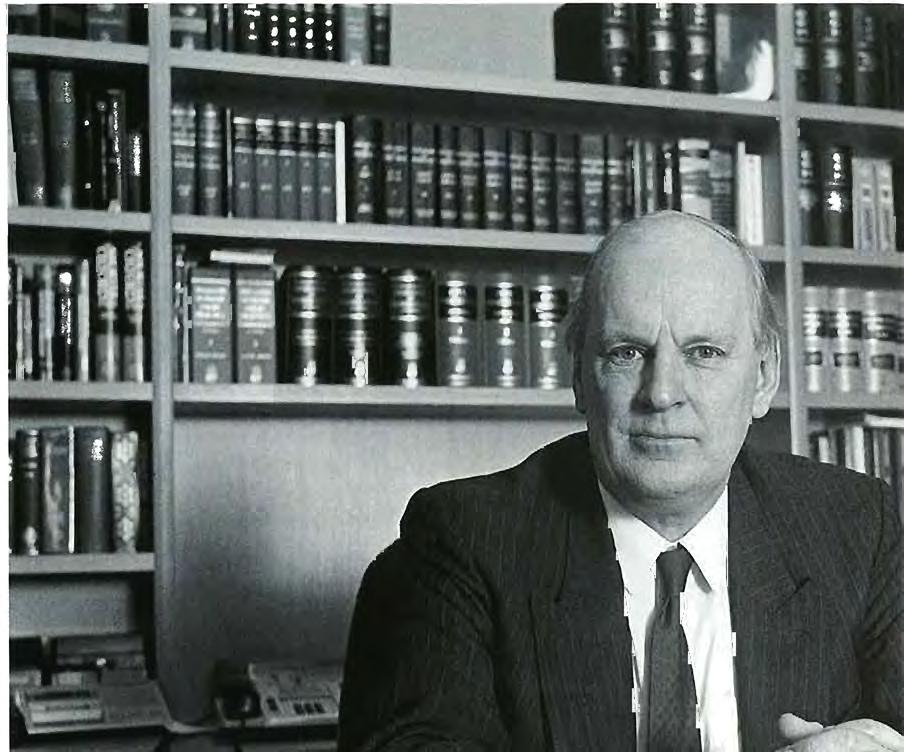

Meagher Q.C.
engaged in combat, usually as the leader with widely acknowledged skill in conduct of the case, on appointment he must put that to one side and become, instead, a neutral umpire. There are those who have accepted appointment who have said the change is for the better, and to them, pleasant, as the tension of battle is put behind them. But there are others who enjoy the battle, who find great satisfaction in success against the odds, and who do not wish to forgo it. Many do not understand this. Within the profession it is becoming understood, and many is the time that I have heard senior judges pleading with eminent counsel to sacrifice themselves for the public
good by accepting an appointment. Such entreaties more often than not fall upon deaf ears.
The compensation once offered was a high level of prestige and satisfaction in the discharge of an important public service. I can recall times when our superior courts were acknowledged as amongst the finest in the world, and an offer of appointment was then seen as a fitting end to a career at the Bar. Once appointed, Judges were treated with a high level of respect, and portrayed to the public as persons of great dignity. There was recognition of their worth by the conditions of their employment, by the grant of civil hon-
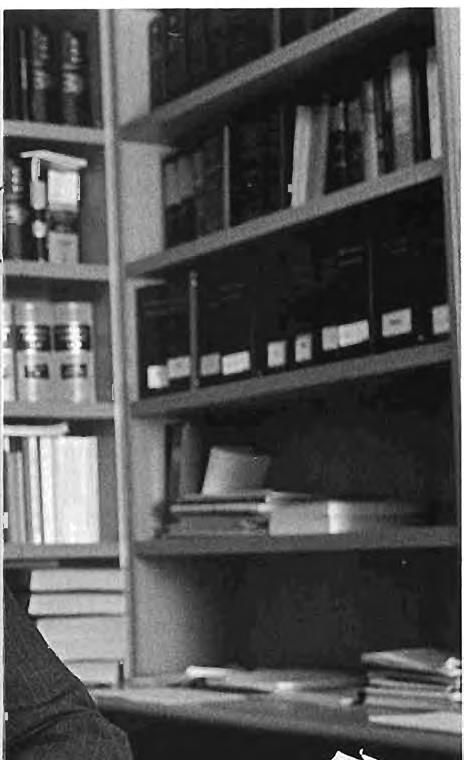
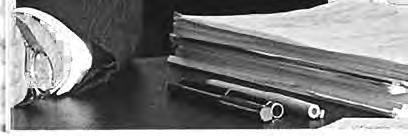

ours, and by public expressions of gratitude and support by the Government. Controversial decisions were supported by the AttorneyGeneral, and any deficiency in the law was seen as a problem to be rectified by the Legislature, and not by criticism of the Bench. Regrettably, those times have passed. With the pos s ible exception of our High Court, our judges are no longer treated with this degree of respect. They are the constant butt of criticism, being accused of failing to discharge their duties with expedition or to public satisfaction. They are no longer honoured, and their courts are treated with indifference. Indeed, throughout the States of Australia 3 there is a legisla-
tive and executive strategy of removing their jurisdiction and placing it in tribunals to which, so it is said, more appropriate appointments may be made. Decisions which offend the current political passion are attacked often on the ground of the composition of the Court. Thus quite recently a decision perceived to fail to meet the objectives of the feminist movement was attacked on the basis that the court comprised only men. Whilst the Government did not join in the attack, neither did it defend the court. All that was heard was an unattributable but well publicised rumour that the Government would soon appoint a woman to the Court, followed by a comment by the Premier that she would like to see it occur. The absence of support, plus the declaration of intent to appoint a woman, could only result in the denigration of the Court. This is but one of a number of instances in recent years where the Government has treated the judiciary more as a political competitor than as a separate arm of government whose proper function is vital to the health of a democracy.
This becomes even more evident when a Government perceives that it may be subjected to criticism for its failure to support the judiciary. In such circumstances, rather than accept its responsibility, the Government has chosen to divert the blame by attacking the courts. For example, ever lengthening court lists are attributed to a judiciary unable, so it is said, because of the age of its Bench to embrace the technology which would cure the problem . This diverts attention from the failure of the Government to provide greater funding to allow an expansion of the judiciary to meet the greater work load brought about by an expanding population It also leads to serious inroads into judicial independence. In one State this has led to the Government appointing a nonjudicial administrator with some authority to dictate to the Judges what cases they will hear, and what work they will do. 4
This attack on the judiciary has had an effect. It has placed it under a heavy strain. That has resulted in a lesser standard of judicial performance and a significant loss of morale. Not only has there been a withdrawal of public recognition of their work, but there has been a denial of support when matters of controversy have arisen. Conditions of work have been far below those enjoyed by prominent members of the community, be they in the law, in Government or private industry, and to the extent that they are being or have been rectified, it has been achieved only by public campaigning by the Judges, and submissions to remuneration tribunals. Even so, as recently as
1989 an eminent former member of the High Court and Governor-General of Australia wrote: 5
"If substantial security of tenure is one aspect of the formal structure needed to support judicial independence, it is often suggested that another is economic security, and certainly the Act of Settlement itself recognised the need to declare that judicial salaries should be 'ascertained and established'. It must be beyond dispute that continuing inflation makes a mockery of any provision that a judge's salary shall not be reduced during his term of office. There are a number of good reasons, questions of recruitment of suitable candidates to judicial office, of their retention once appointed, of public respect for the judicial office in a community that tends to measure most things in money terms, and perhaps even questions of placing judges in a financial position beyond the reach of temptation, all good reasons for ensuring proper and, in real terms, secure salaries and, for that matter, pensions for judges.
In circumstances such as these, it is not surprising to find senior members of the Bar, financially well rewarded, and gaining great satisfaction from and public recognition of the quality of their work, refusing judicial appointments.
The evil of this erosion of judicial salaries will continue as a threat to judicial independence so long as sporadic and partial correction of the process of erosion is left to depend upon the very arms of government of which the judiciary should be independent - it being dependent upon the executive for effective initiation and upon the legislature for implementation. "
The consequences are to be expected. We have had judges retiring within a year or so of their appointment. Many of those who remain are disgruntled, and measure their time on the Bench by the number of years necessary to gain the judicial pension. This being ten years, we find an increasing tendency for judicial appointment to be seen as a short-term office. Thereafter the judge enjoys his retirement, or makes himself available for occasional judicial
40
work as an acting judge, or work on some commission of inquiry.
In circumstances such as these, it is not surprising to find senior members of the Bar, financially well rewarded, and gaining great satisfaction from and public recognition of the quality of their work, refusing judicial appointments. The only surprising matter is that there remain some who do take appointments. However, it cannot be ignored that increasingly these are junior to many of comparative or greater merit, and who, presumably, have been offered and rejected appointments.
Thus no conclusion can be drawn that the profession has such a vested interest in judicial appointments as to allow peremptory rejection of its criticisms, though in the present climate there will be many who will do that. To the contrary, it would be understandable if the profession turned its back upon the matter, and concentrated upon exploitation of the sad state into which the judiciary has fallen.
I move, then, to consider whether this matters. After all, it cannot be doubted that even under such circumstances as presently prevail, there are those who accept appointment. Some do so because of a commendable willingness to make the sacrifice in order to discharge a public duty; some because they are attracted to the security of the appointment; some because they find such power and prestige as remains in the office to be attractive; yet others because their legal practices have diminished. Does it really matter that they are not the best available? For that matter, does the quality of the appointee, so long as he or she has some knowledge of the law, really matter? If it does matter, what criteria should, or should not, regulate an appointment? Finally, since the rating of individuals is subjective, and so dependent upon the perception of the person making the assessment, who should undertake this task? That is the most important question of all.
The qualities necessary in a judge have been the subject of essays by others and I do not wish to compete with them. Many are applicable to other significant positions in our community and they provide little insight. A Canadian Bar Association Committee Report 6 identified them as being:
High moral character
Human qualities: sympathy, generosity, charity, patience
Experience in the law
Intellectual and judgmental ability
Good-health and good work habits
The same may be required of an appointment to a Legal Aid Commission, to the Directorate of Public Prosecutions or to any
Government Solicitor's office; or to many other high offices of Government.
An Interim report of the Ontario Judicial Appointments Advisory Committee,7 sets out a number of criteria; some are significant but others are mundane. It mentioned good writing and communication skills, politeness and consideration for others, and good health, all of which are needed just to practise law, let alone demonstrate fitness for judicial appointment.
The Ontario Advisory Committee deals with judicial appointments at all levels, and perhaps such criteria help in appointments at magisterial level. I am more concerned with superior courts of record, and there are no appointments in my recollection that criteria such as this would have excluded any appointee.
What , then, should be brought to account, or should be excluded, in the selection of judges? In order to answer that question, it is necessary to reflect upon the role courts have in our society
At a conference such as this, little persuasion is required that the prime purpose of the Courts is to uphold the rule of law . Most accept that the task of a judge is to ascertain the facts, identify and apply the law, and thus give judgment. This is to be done impartially, irrespective of who the litigants may be. The judge is not a legislator, and save for the highest appellate court, little is done by a judge that is capable of being construed as making new law. The judge is not an instrument of social change, but rather an impartial applier of the known law.
Yet to state this in such terms is to lessen the significance of the court's role. Society comprises individuals constantly seeking power over their fellows , and that has been so throughout history. The great advantage of modern democratic society is that the process by which political power is gained is by the ballot box, and the frequency with which it must be employed. By that means, the transfer of power by other means, usually violent, has been avoided. When the ballot box is used, the result is a grant of power to the majority in Parliament, which in turn places the power in the hands of the Executive. For whatever time is allowed by the constitution, the executive enjoys the fruits of its electoral success and deploys its power to secure its political ends. The democratic society is not one in which power is denied, but rather, one which allows for an orderly challenge to and transfer of the power.
What holds the democratic state together is the law. Without effective rule of law there would be only one election. The executive, if
At
State level any assertion of judicial independence is dependent upon the qualities of the Judge hearing the particular matter, and even then, such power is markedly constricted by the laws enacted by the legislature. It is different in the Federal sphere, where the Constitution allows the striking down of laws that infringe upon independence.
able to ignore the law, would deny another election. Thus there developed the concept of the separation of powers, at least between the judicial and legislative/executive arms. I leave the legislative/executive arms in close embrace, for we are concerned with the fundamental proposition that whatever may be said about their division, certainly the law must be separated and its independence sustained.
This concept of a division between the judiciary and the others is enshrined in the Australian Constitution where referendum would be necessary to diminish it. Such is not the case in respect of the States. Under State constitutions there is no entrenched division of powers, with the result that a State Parliament may expand or diminish the role of the judiciary as it pleases, subject only to an ultimate appeal to the High Court whose independence is sustained by the Constitution.
Thus, at State level any assertion of judicial independence is dependent upon the qualities of the Judge hearing the particular matter, and even then, such power is markedly constricted by the laws enacted by the legislature. It is different in the Federal sphere, where the Constitution allows the striking down of laws that infringe upon independence, whether by imposition upon the judiciary or by removal of its jurisdiction.
Those who seek and gain political power readily admit to their desire to employ it to
their political ends. Since under our system of Government, their accession to power is by reason of their domination of the lower house of Parliament, the legislature is not an inhibition on the power, but little more than an irritant. Often there is a hostile upper house, but any constraint imposed by that is met with indignation, and claims that control of the lower house provides a right to control Parliament absolutely. For most of the past twenty years in Australia, this claim has not been seriously challenged. To the contrary, ways and means have been explored so as to diminish the effective power of a hostile upper house to block legislation or imperil the existence of the Executive.
The result is that the Executive is not restricted in its exercise of power by Parliament in any meaningful way. I note, however, that in recent times some Australian Parliaments are challenging the domination of the Executive and are proposing greater independence 8 By use of the committees of inquiry, and the power to examine public servants, they are compelling disclosure of that which Governments would prefer to keep secret. It remains to be seen whether they will succeed in altering the imbalance that presently exists with the Executive.
It follows that the most significant arm of government that inhibits or restrains executive power is the judiciary This is most certainly so in the federal jurisdiction, where the judiciary has constitutional authority over both the Executive and Parliament. It is so, too, in the States though without meaningful constitutional support. This is by far the most significant of all the powers enjoyed by the judiciary Without it, there is no guarantee of the continuation of the democratic state. There is no other guarantee of the democratic state not being usurped by dictatorship.
Consequently the most important characteristic of an appointee is his or her willingness and ability to accept and discharge this task. It requires a knowledge of the law; it also requires a demonstrated willingness to apply the law irrespective of the personage of the litigants or the popular clamour of the day. In short, it requires an assurance of independence.
I have cast my argument by reference to the preservation of the democratic state. It is rare that issues present themselves to courts in terms that raise such fundamental considerations. It may be that the rarity of such cases is because of the demonstration of independence of our judiciary over many years. However, it should be recognised that the Executive is a constant litigant in the Courts, appearing in a
42
vast number of cases. It can be put no better than was done by Mr Justice Estey of the Supreme Court of Canada when he said:9
"Whether there is a constitution al dichotomy in the establishment of courts or the appointment of judges, it is necessary to establish a single and paramount administrative authority over the non-adjudicative functions in the court. There are but two choices. That authority may be part of the executive branch of government or it may be a part of the judicial branch of government. The reality and perception of impartiality of a court and the independence of the court system from the government of the day makes it unacceptable to the public to assign the paramount authority over the running of our courts to a member of the executive . This is publicly unacceptable today for a number of reasons. The State today is a party before the courts in the vast majority of all cases, criminal and civil. The executive branch exercises the prosecutorial function in the criminal law under our system of government. The executive branch is the tax collector, the disciplinaria n and the administrator in many factors of community activity. All these executive functions lead but to the courtroom. The perception of imp artiality is mortally wounded, if not destroyed, when the executive is, in reality the day-to-day manager of the courts The public cannot be expected to discriminate between adjudicative management and operational management. Indeed, the law profession itself will not make that distinction."
Mr Justice Estey's comments are directed at the employment of judicial administrators supplied by the Executive; it has even greater force where the appointment of judges is seen to be in the exclusive hands of the Executive.
Given the interest of the Executive in the exercise of power, and the restraints the application of law by the judiciary may impose, it must be assumed there is political interest in expanding executive power and diminishing the power of the judiciary to interfere with its exercise. It is said that long English legal tradition is to maintain the independence of the judiciary, and that its politicians are committed to that cause. My understanding of English legal history does not support that view, but to the contrary, suggests that there has been a long and significant conflict between the judiciary and the Executive over the past 1,000 years. Australian history gives little comfort that there is a political acceptance of the primacy of judicial independence, and recent experience reveals an Executive constantly striving to find ways of diminishing judicial power, and thus expanding its own powers.
Perhaps the most pervasive strategy of the Executive has been the creation of administrative tribunals with consequential curtailment of judicial power. There have always been some
administrative tribunals, and a number are truly administrative in character and therefore unexceptional. However, there is a rapid drive towards the creation of tribunals with a broader charter that infringes upon and curtails judicial power. These tribunals often have extensive powers beyond those that may be exercised by the Courts, and frequently granted in the vaguest of terms. Equal Opportunity Boards, and anti-discrimination tribunals have the capacity to interfere in many aspects of a civilian's life, stopping short only of imprisonment.
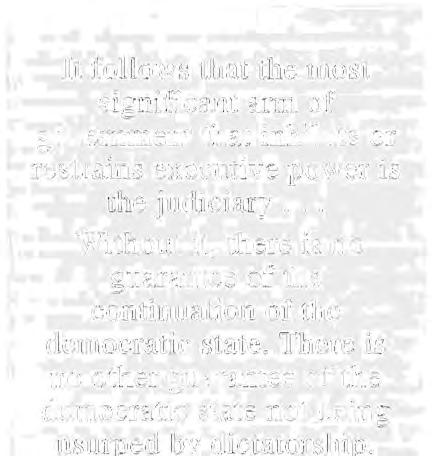
Other tribunals are established with exclusive powers to determine disputes between citizens, with markedly little guidance as to the law they apply, and a severe restriction upon the rights of the litigant to be represented, to challenge the evidence, or to appeal the result.
Appointees to these tribunals, without hesitation, are selected for their philosophical commitment to the political cause that led to its creation. By this means the executive dramatically increases its power at the expense of the judiciary, for it relies on its appointees to achieve its ends not by the application of specific laws enacted by Parliament, but by the exercise of discretionary powers. Such appointees are usually for a limited period of time, and any expression of independence in thought or deed by the incumbent is implicitly threatened by the short term and necessity for renewal. The Executive's power to replace
with someone seen as more committed to implementation of current government policy is only too evident.
Often these tribunals are given the trappings of judicial authority. Those appointed to office are given the status and conditions of a judge, and sometimes they are presented to the public and operated in a fashion that may deceive many into believing they form part of the judicial system. In truth they are not, for their appointees have not been selected for the qualities of independence, and should any show signs of acting independently, they may soon be replaced.
This strategy has caused serious alarm to the members of the Supreme Court of Victoria, and led to a report by the Bench being submitted to the State Parliament in 1988 and summarised by one of the judges in these terms: 10
"The wholesale move by Governments to have legal disputes of the kind traditionally decided by courts, transferred to administrative tribunals, has a mixture of motivations. These include having disputes of a specialised type decided by those with experience and expertise in the activity from which the disputes arise; reduction in the time and expense taken in the decision-making process; the exercise of patronage in appointing people to tribunals; and the appointment of people who, because of their cast of mind and their awareness that re-appointment at the end of a fixed term will depend on them then having government approval, will be inclined to interpret and apply the law in accordance with current government policy. The extensive by-pass of the courts in this way in recent times gives real cause for concern."
The incessant quest for ultimate power by the Executive finds its expression in the Federal jurisdiction as much as in the States. We observe the removal of three senior judges from the High Court of Malaysia in 1988 may be seen by some as explicable in terms of the Executive in Malaysia having a lesser commitment to judicial independence than is the case in Australia. Yet it has been suggested that similar lack of commitment to judicial independence is to be found in the Queensland Judges Retirement Act 1921, which compelled the retirement of the Chief Justice and two other judges though they had been appointed for life. I I More recently the difficulty posed by one appointment to a semi-judicial industrial tribunal who had, albeit in the eyes of many without good reason, performed his duties in a fashion that ignored the norm, was met by abolition of the tribunal and its replacement by a new body without his appointment being transferred In that way, his quasi judicial power was brought to an end by denying the old

tribunal any jurisdiction. The alternative was his removal by vote of Parliament, a course which the Executive was unwilling to take.
More recently, the new industrial tribunal has been the centre of controversy when one of its leading members resigned, charging the Government with making appointments that were not independent, but which favoured a particular political philosophy. The incident was made more remarkable by the fact that the critic had previously belonged to the trade union movement, and the loss of independence of which he complained was the appointment of too many from the trade union movement. The attack led to debate about whether there had been impartiality in the appointments. Suffice it to say that the very occurrence of the debate, irrespective of the ultimate outcome, brings into focus the question of whether appointment to the tribunal ought to be the sole preserve of the Executive.
It is not surprising that judicial power should come under pressure from the Executive. History shows that it has always been so, whether it be the history of the English speaking world or of any other part of the world. Those who exercise Executive power more often than not are blinded by the righteousness of their cause , and are intolerant of obstruction in its exercise. Power is a heady thing, and once gained is turned to use with alacrity.
It is not just the politician who seeks free exercise of power untrammelled by law. There are many who have economic power, and who would justify their absolution from the rule of law by reason of possession of that power. Nor is it limited to the ultimate holder of economic power; frequently the lieutenants are as much swayed by the power as their superiors. How often does one hear of indefensible decision s being justified as being company policy. Amongst this group are those who sneer at the law, and see it as a tedious obstacle without any intrinsic merit. They will ignore the law, and if brought to account, will attack it with venom. In this instance, the Judge may well find that the control of his Court is questioned, and many devices employed to undermine his authority or subvert his judgment.
So too with those who promote causes. Indeed, in this quarter there is a quite open attack on the judiciary by complaint that supporters of the cause are not represented on the judiciary, treating it as if it should be a representative body like a legislature.
In that regard, we have not been well served by the practices in the United States in the selection of judges for its Supreme Court.
44
There is acceptance of the propriety of a President fashioning a Supreme Court by selection of conservatives or liberals as his philosophical approach demands. That is an invitation to such appointees to interpret the laws in accordance with the political philosophy that led to their appointment, and that is the antithesis of judicial independence. Regrettably, the American approach is being accepted as guidance to Governments in Australia, and there ought to be no surprise at that. It provides the final answer of the Executive to the constraints of the judiciary, that being that they be overcome by suitable appointments.
I advance the proposition that the essential criteria for appointment to the Bench are a demonstrated capability to uphold the rule of law, and to act in a truly independent manner. Such a person is unlikely to be an appointee that a Government will find attractive, for on appointment he will see to the enforcement of the law no matter who is before him, and may often frustrate the designs of the Executive, or of those who support the Executive. It follows that in my view there is a natural tendency for an Executive to seek out those of not so independent a mind. Yet we entrust the Executive with exclusive power to make the appointments. Therein lies the difficulty.
Some years ago Lord Hailsham, then the Lord Chancellor, stated his policy in selecting candidates for the Bench in England. He said: "My first and fundamental policy is to appoint solely on merit the best potential candidate ready and willing to accept the post. No considerations of party politics, sex, religion, or race must enter into my calculations and they do not. Personality, integrity, professional ability, experience, standing and capacity are the only criteria, coupled of course with the re quirement that the candidate must be physically capable of carrying out the duties of the post, and not disqualified by any personal unsuitability. My overriding consideration is a lways the public interest in maintaining the quality of the Bench and confidence in its competen c e and independence."J2
I emphasise his final words relating to competence and independence. They are matters of the greatest significance, and transcend all other considerations. Without those two objectives being established to the satisfaction of any impartial observer , the appointment is wrong. Thus if there are two candidates for appointment, of equal competence, but one is publicly known for participation in political activities favoured by the Executive, or is known to be of a philosophy in accord with the Executive, whilst the other is neutral on both accounts, then that other should be preferred.
There has been increasingly a view propounded in the media that the Bench should reflect sections within society. It is said there should be representation of ethnic groups, or a woman should be appointed in preference to a man since they are "under-represented", or not represented at all; or that appointments should be made from the left and right of politics, perhaps in sequence so as to achieve "balance"; or that the Bench ought to comprise people whose background reflects the mix within society. Such considerations receive more attention than they merit. The Bench is not a legislative body, where policies are developed and enacted . Its prime role is to ensure that the people of our country continue to enjoy their freedom to choose their Government and Legislature from time to time, and that once chosen, the Executive is held to the democratic charter of the country, and made to comply with its laws. The judiciary does not need to reflect divisions within our society in order to do that; what is needed are judges committed to independence from the Executive and competent in their judicial roles.
On examining appointments made in the past few years, it is not readily apparent that the overriding consideration has been the maintenance of independence. Rather it has the appearance of seeking to place on the Bench a sociological mix, so as bring together a collection of people of different philosophies. I say nothing about competence save to remark that whilst there are none about whom it could be said that it is absent, nor can it be said that the era is one of unrivalled excellence. That may not be so significant; what is significant is the prevailing attitude of the Government that it is desirable that the judiciary be composed on such a mix. That suggests that the Government sees the judiciary as having a sociological role in our community, a role that goes beyond the impartial interpretation and application of laws and into a different realm. In this new realm, it seems that it is expected that the Judges will apply the laws in accordance with their philosophies, presumably with applications that differed depending upon the judge allocated to hear the case This is contrary to and fatal to the independence of the judiciary, and we can only hope that having been appointed, such judges will put that aside and develop the fierce independence that is necessary for a truly free democracy.
That brings me to the process by which such appointments are made. In Australia it is by the Executive, as it is in England. The question is whether there can be confidence that the Executive will discharge this task by applica-
tion of proper considerations. Whatever may have been the situation in the past, I do not believe that there can be confidence that it will do so in the future. It may be that in England there can be confidence, but English traditions and practices, perhaps unfortunately, no longer hold the influence they once had in Australia. I point to the attacks made on judicial independence to which I have referred, and to the prevailing political attitudes. There is no reason for anyone to be complacent.
This is demonstrated in part by the marked change in the office of Attorney-General that has occurred in the past twenty years Previously the Attorney-General stood apart from the Executive, albeit that he participated in Cabinet discussions. The last AttorneyGeneral in Australia to emphasise his independence from the Executive was possibly Mr Ellicott, in the Federal Government led by the Right Honourable Malcolm Fraser. He resigned when he believed that the independence of his office was being compromised. An account of the circumstances is unnecessary, save to say that the Prime Minister insisted that certain court proceedings be terminated contrary to what Mr Ellicott believed was proper. There were highly political considerations.
Since that time we have seen an AttorneyGeneral of the Commonwealth Government holding office concurrently as Deputy Prime Minister, acting as Prime Minister when the incumbent was overseas. In Victoria, the Attorney-General also holds office as Deputy Premier, and acts as Premier when occasion demands.
There has been no public outcry about this combination of office, and I observe that no politician has been so moved by the consequent loss of independence of the office of Attorney-General to complain in either Federal or State Parliaments. It must be concluded that it is accepted in Australia that the office of Attorney-General is no more than another ministerial portfolio within the Government, charged with the implementation of Government policy - in other words, with the full deployment of Executive power. Any reservations are removed when it is recognised that the previous incumbent of the office of Attorney-General in Victoria was not trained as a lawyer, but as an architect. Plainly, he was not expected to bring to bear considerations of constitutional or legal propriety on any issue, and was ill equipped should he have tried to do so.
In such circumstances there can be no assurance that the Attorney-General will be as


committed as Lord Hailsham to the preservation of the competence and independence of the courts. Rather, it is likely the commitment is to the American practice of seeing that appointments to the Courts are, at least in substantial part, of people committed to the same philosophies and objectives of the Executive. Some attention may be paid to public confidence in the Courts by the occasional appointment of persons not known for their pro-government tendencies; or even of people known to be adverse to the Government (which is no better than the appointment of those favourable to it). However it is done, it is destructive of the independence of the judiciary. Yet, it is done with little public notice or criticism. That is because of the commitment of the legal profession to upholding the judiciary, withholding criticism, seeking to ameliorate the effect by support. Yet the profession ought not to be put in that position, and advantage should not be taken of it, so as to fashion a Bench that is of lesser constraint on the exercise of Govern-ment power.
I conclude that the time has come for the removal of the power of appointment to the Bench from the exclusive domain of the Executive.
There remains consideration of what should replace it. Concern as to maintenance of judicial independence by some method of appointment other than by the Executive is not confined to my observations. l3
The United States of America sought to overcome the problem by popular election. That does not produce judges of independence, but rather judges likely to pursue the cause which saw them elected. It is notable that enthusiasm for this process has dwindled in that country.
In Canada, and some States of the United States, there are "Nominating Commissions". These comprise persons who produce a short list from which the Executive then makes its choice. I referred to one such committee earlier, being the Judicial Appointments Committee of Ontario. It comprises nine members, six being non-lawyers, one a Judge and the other two practising lawyers. The AttorneyGeneral appoints all but the Judge and one lawyer, the Judge being appointed by the Ontario Judicial Council and the lawyer by the local Law Society. It recommends appointments at all levels, and to that end, invites applications for appointment. In its 1990 annual report it notes that its recommendations are always accepted, and it may be assumed that if they were not, there may be public disquiet.
46
However, this is not constitutionally sound. The Executive makes the appointments to the committee, and all it achieves is to compel the Executive to dissipate its power so that it is exercised through its appointees. The heavy emphasis upon non-lawyers would make it likely that assessment of competence and independence would be more difficult for the committee than it would if there were experienced members of the profession in a majority.
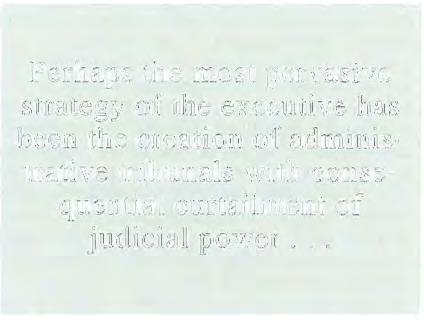
In some States in the United States, and in Switzerland, appointments are made by a joint sitting of the two houses of Parliament. That would be an improvement on the process presently employed in Australia, but may well descend into a political quarrel over the philosophies of the nominee such as has been seen in the United States.
Another technique is that employed in appointments to Federal Courts in the United States. The nomination is by the President, but subject to confirmation by the Senate. The Senate is denied power of nomination, so it can only frustrate the President's choice. The nominee must undergo what for some, such as Judge Thomas, must be a shocking ordeal and that does not seem conducive to the appointment of persons committed to independence and competence.
The International Bar Association has dealt with the matter in its Code of Minimum Standards of Judicial Independence. 14 It provides that participation in judicial appointments and promotions by the Executive and Legislature is not inconsistent with judicial independence provided that appointments and promotions of judges are vested in a judicial body in which members of the judiciary and the legal profession form a majority. Thus it envisages a judicial appointments commission comprising a majority of judges and lawyers,

but with representation of the Executive, making the appointments.
The International Bar Association does allow judicial appointment by a non-judicial body where such practice operates satisfactorily with a long history of democratic tradition.l 5 As I have observed earlier in this paper, I do not believe that can be any longer said of Australia.
Israel appears to have adopted this procedure, with a judicial selection committee comprising nine members made up of three Supreme Court judges (elected by their brethren), two lawyers elected by the Bar Association, two members of Parliament elected by the Knesset, and two Ministers one of whom is the Minister of Justice who chairs the committee.
The time has come to adopt something like this in Australia, especially in the States. I propose a selection committee chaired by the Governor-General or Governor, as the case may be, comprising a majority of members drawn from the judiciary and the profession as stipulated by the IBA standard.
For many years in Victoria there has been strong opposition from the Bench and Bar to a system of judicial promotion. The reason has been that it would be by the Attorney-General, and would threaten judicial independence. Its absence has disadvantages. It means an appointment is the end of the career for the lawyer, who is deprived of any opportunity of advancement. That can be demoralising for some, and may contribute to reluctance in taking an appointment. It also means that there is little opportunity to tryout a lawyer as a judge to see if he is suitable for appointment. Thus in Victoria we have rejected the suggestion of acting appointments, or of the Recorders so much used in England.
However, if the appointment of judges, and their promotion, was vested in a committee of the sort I propose, those objections would lose their substance. Indeed, if the power of appointment is vested in a body independent of the Executive and of Parliament, then there are excellent reasons for a system of acting appointment, and judicial promotion once appointed.
Thus I conclude my paper. I am critical of appointments to judicial office made in Australia. It may well be that those appointed would have been appointed under any system, and that they do represent the best available and are truly committed to independence. It is the case that the field is severely restricted by reason of many declining appointments. Undoubtedly, the quality of the Bench will be enhanced only by a change in the support
given and recogmtlOn by Government. acknowledge all of that.
I suggest, however, that the far greater problem is the threat to judicial independence by politicians who no longer accept that their powers should be constrained notwithstanding their election to office. I suggest that the rule of law is in jeopardy in Australia, and that we should act to strengthen it. An appropriate starting point, though only that, is removing from the Executive the exclusive power to appoint judges. Another step is the implementation in the States of the same constitutional safeguard for the rule of law as is found in the Australian Constitution. A further step is a substantial improvement in the recognition of our judges for the work they do, and their public support by Government. All of these things must be done if democracy in Australia is to be preserved.
I. There have been some modifications made to this paper for the purpose of publication in the Bar News.
2 The Right Honourable Sir Harry Gibbs, G.C M.G , K.B E. in an addre ss to the Fifth Seminar of the Australian Institute of Judicial Admini s tration , 23 August 1986.
3. It cannot be done in th e Federal jurisdiction due to th e Constitution
4. This subject i s w e ll developed in a paper by The Honourable Mr. Justic e McGarvie entitled "The Ways Available to the Judi c ial Arm of Government to preserve Judicial Independ e nce" de livered to the Supreme Court and Federal Court Judges' Conference 1991.
5. The Right Honourable Sir Ninian Stephen A.K., G.C.M.G., G.C.V.O., K.B.E on ' delivery of the Inaugural Annual Oration in Judicial Administration entitled Judicial Independence, 21 July 1989
6. The Appointm e nt of Judge s in Canada (the Canadian Ba r Association Committee Report) at pp. 25-26.
7 . Interim Report of th e Judicial Appointments Advi sory Committee of Ontario, Se ptember 1990, at pp. 17- 18
8. See th e Report of a Joint Committee of the Hou ses of Parliament of New South Wales entitled Mana g ing Parliam e nt (1992) The Speaker and President of the Houses of the Victori an Parliament published a report to similar ends in 1991.
9. "The North American Experience: a Theorem on Judicial Administration" in G.J Moloney and G. Fraser Semin ary on Constitutional and Administrative Responsibilities for the Administration of Justice: the Partnership of Judiciary and Executive AIJ A Melbourne 1986.
10. McGarvie J op cit. at pp 8-9
II. McGarvie J op cit. at pp 9- 10
12. Law Society Ga zette , 28 Augu st 1985 at p. 2335 .
13. In what follow s , I acknowledge my indebtednes s to the works of Profess or Shimon Shetreet , LLB, LLM, Hebrew University of Jeru sa lem MCL, DCL University of Chicago as set out in hi s papers: Who Will Judge: Reflections on the Process and Standards of Judicial Selection presented to the Judges Annual Se minar of the Australian Institute of Judicial Administration 23 August 1986 and later reported in 61 ALJ 766.
14. Code 3(a) developed in Lisbon and Jerusalem and confirmed in New Delhi
IS See Standard 3(b)

[Our Reporter, Tina Giannoukas, interviews the Honourable Mr. Justice Harper and the Honourable Mr. Justice Hayne]
Q: WELL, HOW HAVE YOU FOUND LIFE on the Bench?
Harper I.: I'm thoroughly enjoying myself. At the same time, the pressures are greater than I expected. They are very different from those which I experienced at the Bar.
Hayne I.: It's the difference in the pressures that really strikes me. At the Bar you can chart your own course knowing that someone else is going to correct it. Here, you chart your own course full stop.
Harper 1.: Yes. Undoubtedly the most intense pressure is that which comes at the end of the case, when you are faced with the necessity of making a decision knowing that if it's wrong, it's likely to go on appeal. Your judgment will then be examined by three of your colleagues, who are probably a lot older and wiser than you are and will look with interest, not to say astonishment, at what you've done.
Hayne I.: But the pressure I find at the moment is that I am working every bit as long, possibly a bit longer, than I was at the Bar. Now that's probably a mark of my inexperience and uncertainty.
Harper 1.: I've been here a lot longer than you have, and I have faced precisely the same problem. I'm working at least as hard as I was at the Bar.
Hayne 1.: The most annoying thing is when somebody says to you, especially when they meet you socially, "Ok well then I suppose you are working 10 to 4 these days". I am afraid the first few times that was said I found it mildly amusing and a little irritating, now I just find it infinitely annoying.
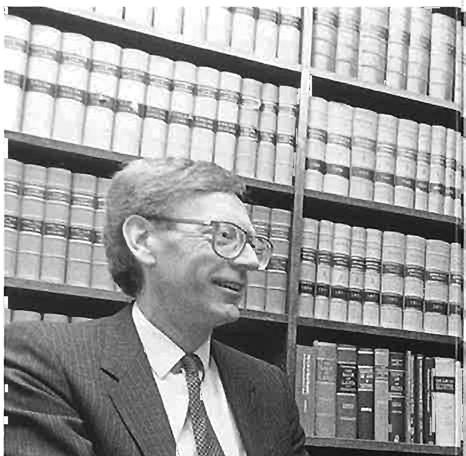
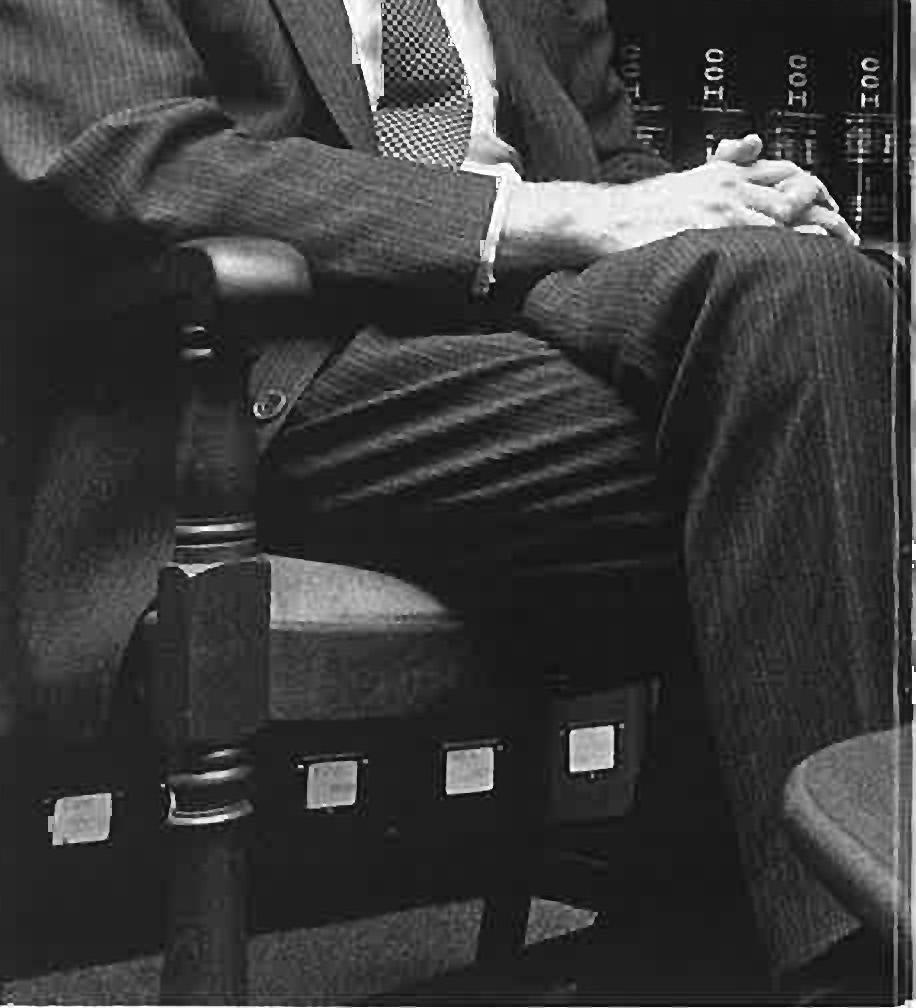
Harper 1.: On the other hand, the intensity of the pressure isn't generally as great. There are times, particularly I found in the Practice Court, when, because of the urgency of the case, an ex tempore judgment was required. One has to instantly assess the merits of the several arguments being put, summarise them and then by synthesising them, provide an answer. That pressure, for one not used to it, is Tina
considerable. On the other hand, that happens relatively infrequently. One doesn't have the very real pressures that impinge upon barristers who are about to start a new case. And I found that any case of any substance tends to have a life of its own after a while. One is always being met with the unexpected and one has to meet the unexpected on the run. That kind of pressure doesn't occur nearly as often here.
Hayne 1.: You don't have the pressure of standing on your feet 10.30 next morning with something to say and it's that which I think is
the pressure at the Bar. Next morning there is going to be a new witness, or series of witnesses, or a new case, or something to do and you are going to have to stand on your feet and say something.
Harpel' J.: Yes.
Q: Suddenly you are both looking at the world from a different perspective?
Hayne 1.: Very different!
Harper 1.: Extraordinarily different! It's those rather more superficial impressions that strike one with most immediacy when you



come over here. Suddenly people that you have known as "Your Honour" all your life are calling you by your Christian name. Other people that you have known as members of the staff, and who have regarded you with appropriate disdain in the past, are suddenly calling you "Your Honour". Even before you get installed into your own room, everyone in the building is walking past saying "Good morning, Your Honour" or "Good afternoon, Your Honour". That's very strange indeed.
Hayne I.: Yes, Quite remarkable.
Harper I.: Then as you say there is the totally different perspective you get from the Bench.
Hayne 1.: Especially from the bench of the Banco Court at your welcome where the perspective then, through the haze of fear, is very, very different.
Q: Haze of fear? That's very interesting. Why haze of fear?
Hayne I.: It is the most awe-inspiring occasion, I think, that I have encountered. "Terrifying" is quite the wrong word. But it really was, I found, intimidating. I can't capture the word.
Q: Awesome?
Hayne 1.: Ah. Yes! A remarkable occasion. The courtroom is filled. Everybody is there, or you hope everybody is there, wishing you well and not coming simply to laugh. I found it a very remarkable occasion.
Harper 1.: For some purposes at least this is the occasion when you first confront your new persona, and you confront it in company with those who have been your colleagues and your friends for twenty years or more. You wonder what on earth they're thinking as they look at you in this new garb with this new set of responsibilities. You wonder how you will relate to them in the future and, of course, you wonder how you will cope with a totally new way of life.
Q: How do you cope with a new way of life?
Hayne J.: One survives.
Harper J.: Well, I've thoroughly enjoyed it. The most important criterion is the number of appeals that are taken and succeed. I have my grave fears about that, egpecially when you have been in the Practice Court for six weeks.
Q: The life of a barrister compared with life on the Bench is far more carefree?
Hayne I.: Do you think that's right?
Q: Well, especially as a judge you have to be far more careful, don't you?
Hayne 1.: No.
Harper 1.: I've not felt that I've been deprived of any facility that I once enjoyed. If
50
you talk about going to pubs or going down the local footy club after a match on Saturday, well, if that's the sort of behaviour you commonly pursued at the Bar, you no doubt have to exercise a certain amount of discretion about it when you come to the Bench. But these days there are very few, even unstated, restrictions on what judges should do in matters of that kind. One was once told that judges should not be seen in the public bar of a hotel. I think that that's no longer an absolute rule - although I haven't been in the public bar of a hotel for fifteen years or so. It's just not my scene.
Hayne I.: The thing is I think that as a barrister, certainly as a reasonably senior barrister, one you are so jolly busy there is no chance of being indiscreet. The second thing is that, by and large, senior members of the Bar they, too, ought not to do anything that would be regarded as indiscreet. So I don't see much of a change.
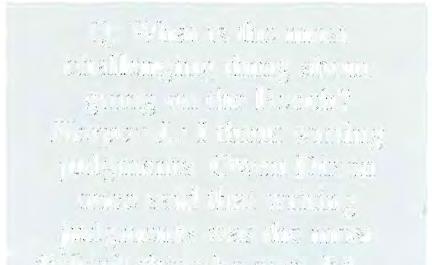
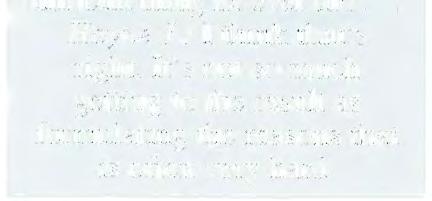
Q: As a barrister you can be a lot more forthcoming on your views on Government and so forth?
Hayne J.: True!
Harper 1.: Well, yes, that certainly is something one has to be aware of and careful about. The organisations that judges can appropriately join are limited by the need not to be associated with an overtly political body. If one were minded to join an organisation of that kind, you would be expected to discuss it with the Chief Justice first.
Q: As a barrister you can come along and suggest to the court and try new ideas. As a
judge you're limited by the counsel before you?
Harper J.: I've occasionally thought counsel weren't up to scratch. I've also thought that the great majority of counsel who have appeared before me, in my very short experience, have done a very good job. I once read [it was Megarry J. - later Vice-Chancellor] that the counsel a judge has to be careful of are those who are incompetent and those who are very bright and very good. Incompetent counsel leave you with the need very often to ensure that, if justice is to be done , then the incompetencies must to a certain extent be neutralised. On the other hand, very good counsel can put an argument to you that they can make appear entirely sound when, if given closer analysis, one can see it is not sound at all. The danger is that the artificial or superficial attractiveness will overwhelm one and make one go along with it when, in fact, there are flaws that counsel's skill has concealed.
Q: How often have you seen that? Do you agree?
Hayne 1.: I probably have not had enough time in my experience to offer anything useful. Except that I had always thought at the Bar that most of the work of the Bar was done pretty well. I have seen nothing that would make me think otherwise now. Obviously some work is done better than other work, of course. But, by and large, it is done pretty well.
Q: What is the most challenging thing about going on the Bench?
Harper J.: I think writing judgments. Owen Dixon once said that writing judgments was the most difficult thing he ever did. If he didn't find it easy, it's not surprising that I don ' t find it easy. I enjoy the work in court. I enjoy listening to arguments back and forth. I found it much easier than I expected to make rulings about matters of evidence as they occur in the running, largely because, although I know far less about these things than I ought, you are largely guided by common sense and by the rudiments which you learned years ago and which somehow spring back, I hope, appropriately. At least I don't think my rulings have been taken any further and, so far as I can tell , they've satisfied counsel and they've enabled the trial to go on. That I found easier than I expected, and I've enjoyed it more than I expected. The cut and thrust of trial can be enjoyed just as much on the Bench, if not more, than from the Bar table.
Hayne J . : I think that's right. It's not so much getting to the result as formulating the reasons that is often very hard.
Harper J .: That's certainly right. I think it's

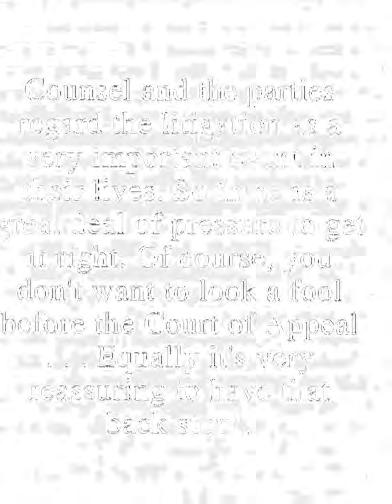
very often easy at the end of a case to say, well, I think there is very little doubt that the answer is so and so, but then to formulate your reasons for judgment in a way which will satisfy the intellectual requirements of the job is quite difficult.
Q: Is there a sense that the Appeal Court is looking over your shoulder?
Hayne J.: It's not so much that. I think it's the self-discipline of doing it right. It's not the fact that the Appeal Court will be critical of what you've done. You yourself must be satisfied with what you've done
Harper 1.: I agree. The Appeal Court is very comforting in one way, of course, because you know that if you do get it wrong, then there is the chance that it will be corrected on appeal and, as the CJ used to say, no case is unimportant. One is certainly struck with the fact that in this court, and I'm sure in other courts as well, counsel and the parties regard the litigation as a very important event in their lives. So there is a great deal of pressure to get it right. Of course, you don't want to look a fool before the Court of Appeal, either. Equally, it's very reassuring to have that backstop.
Q: What's the biggest challenge facing the judiciary today?
Harper 1. : I think overall to maintain its independence. That doesn't mean going out into the streets; it doesn't mean taking any political stance; but I do think that the judiciary cannot stand back and leave those questions, those issues, to the Bar and the solicitors

to look after on its behalf. The judiciary must, it seems to me, be constantly on the alert in the same way as in the quote: "the price of liberty is eternal vigilance". One does have to be vigilant in that sense. There have been some extraordinary attempts in recent times to undermine the judiciary; and I think the Australian bench, although not under any immediate threat, must be aware of trends in other parts of the world and must not for a moment ignore the potential dangers.
Hayne 1.: I think the other challenge that faces the courts and the profession is the manner of disposition of litigation. By that I mean costs, time, effort.
Harper 1.: I agree. That is of more immediate concern than the question of independence. I don't see any real or immediate threat to the independence of the judiciary in Australia. But there is obvious concern in the community about the cost of litigation.
Q: The community. Is there a "Let's get it through quickly" attitude?
Harper I.: Well, there are cases where the parties want a decision and it doesn't matter what that decision is so long as they get their decision. Those cases you would think would be few and far between. Generally, the parties don't just want a decision, but the right decision. My experience as a barrister was that parties, once involved in litigation, will go to all sorts of lengths to put forward the best case they possibly can. It seems to me litigation

principally is not lawyer-driven, it's clientdriven. It's the client who urges you to call that extra witness. It's the client who urges you to ask questions (a), (b) and (c) even though you might think they're not particularly relevant. It's the client who will be upset if you continually tell him or her that you don't intend to pursue an issue because you think it's irrelevant. If the client thinks it's relevant, the client will want you to pursue it. In the end, if you don't and you lose, the client will almost inevitably blame you for the loss. This is where the independence of the barrister from the client gives rise to hard choices. Of course, barristers must not simply become mouthpieces for clients. They must exercise independent judgment. On the other hand, as a matter of reality, one cannot divorce oneself from the client.
Q: What is the responsibility of the judge. Should the bench be more interventionist?
Hayne 1.: There are certainly two schools of thought, aren't there? The court should manage the litigation, or the court should let the parties manage the litigation. I think there would probably be many opinions on the subject.
Q: What about counsel prolonging matters?
Hayne I.: One of the things that one needs to bear steadily in mind is that often, if not always, you know a jolly sight less than does counsel about the case. While it may seem at one point that counsel is going off on a frolic of his own, one can never be quite sure what it is that counsel knows about the case.
Harper 1.: I agree. One of the significant experiences that I've had since being appointed is just that kind of experience. I had a case last year where I thought that the judge had failed to perceive the issues. Had he perceived them he would have shortened the case by a matter of weeks. I resolved when I was appointed that I wouldn't allow that to happen. Having had the few short months that I've had in this job, I'm now not nearly so confident that I can appropriately intervene and significantly shorten any case before me. I've been struck precisely by the sort of considerations that Ken just spoke about. I've opened my mouth on a couple of occasions and I've been very quickly convinced that my initial views about the relevance of an issue were incorrect: that, although I personally thought counsel were wasting time by following a line of cross-examination, indeed, there was something in it, and that I would be doing an injustice to the parties, certainly to the party represented by the cross-examining barrister, if I interfered. My experience generally has been that one shouldn't intervene; one shouldn't open one's
mouth unless there is very good reason. If there isn't, then don't say anything.
Q: What quality does a new judge need?
Hayne J. : I really don't know. Ask me at the end of one year, I'll give you one answer. Ask me at the end of five years, I'll give you another answer.
Harper 1.: I think one of the dangers that we all face at some time is the temptation to look back and remember our days at the Bar through a golden haze. That's a danger that you've got to recognise and guard against. I feel that I'm committed to this job now. I don't expect to have any other job in my working career and I won't be doing myself, or anyone else, any good if I started to hanker after the life which I led at the Bar and which I thoroughly enjoyed.
Q: Thirty years ago I don't believe any new judge would have spoken to Bar News. We have changed, haven't we?
Harper J.: Yes, and I think probably for the better. Society is more relaxed these days about a lot of things and, generally, I think that should be welcomed.
Q: Do you develop a "them" and "us" mentality?
Harper J.: Well, I don't think I have yet and I hope I never do. I've put that into the danger area and have told myself if I ever start to think there is some magical division between judges and barristers, other than divisions that obviously and necessarily exist, then I should very quickly turn myself around and be sensible.
Hayne J.: The adversary system is a system where the Bar provide the adversaries not the Bench.
Harper J.: The Bench and the profession ought to be natural allies.
Q: Let's talk of the privileges. There's the gold pass.
Harper J.: I've always travelled by public transport. I continue to do so. I hope one day I can take free advantage of the gold pass and go to Mildura first class. There are a limited number of court cars and the senior judges have first call on them. That's entirely appropriate. We can get court cars for court business when they're not being used by the more senior judges. But that's not a privilege, that's a necessity. You can't be expected to pay for the trip yourself. It's either a court car, or a taxi, paid for by the Government.
Q: Would you advise colleagues to come to the Bench?
Hayne 1.: Everyone has got to make their own decision. Everybody must sit down and write their own list of pros and cons. I have no
regrets at all about coming to the Bench. Apart from anything else, it would be silly. In the end I sat down and wrote out the pros and cons. In the end, there was a sense of obligation. I remember Dixon's farewell speech from the High Court, where he says something to the effect that, when you're at the Bar you can sometimes feel that you're doing something good, but the work of a judge is hard and unrewarding. That a man should say that at the end of a judicial career as illustrious as his is a very signal warning to anybody who says "yes" to the Attorney-General. That's not to say that there are regrets.
Harper 1.: I think temperamentally I am better suited to this job than I was to that of a barrister. To put what Ken just said in another way, in a sense, it's an enormous privilege. There are some callings which I think you can properly say have noble purposes. Teaching is one, medicine is another. There's no doubt that one of the fundamental needs of human kind is the need for justice. As a judge you have a greater opportunity than anyone else in the community to see that justice is done on a daily basis. When one stands back and looks at the job in those terms and tries to see where the real purposes lie, I think, yes, in a way you can get inspiration from that. You can see that the job is one that you ought to take pride and enjoyment in. That I think is a very real pro.
Hayne 1.: The pride and enjoyment comes from trying to do it well, and time will tell.
Q: One final question. Should the court become more open?
Hayne J.: It's important that the court not become embroiled in the day-to-day cut-andthrust of politics, in the day to day controversies of particular decisions. It's important that the court be, and be seen to be, removed from those two things.
Harper 1.: I agree. And this gets back to what I mentioned before about the preservation of judicial independence. Once the court descends into the arena, then it puts its independence at very real risk. On the other hand, the court has, I think, an obligation to explain itself to the community by way of judgment and occasionally by other means. Generally speaking, the greater the judge the easier the judge's judgments are for the ordinary person to read. But the hardcore judgment is not going to be read with ease by the man on the street. There are many Supreme Court judgments that fall into that category by necessity. No matter 'how lucidly you express them, no matter how well they are written. In such circumstances, and in some other instances, it may be appropriate to issue explanatory material.




THE 1992 CONFERENCE OF THE AUSstralian Bar Association was held in London and Edinburgh in July of this year. Despite the inconvenience of visiting the northern hemisphere during the depths of the Australian winter, 215 members of the Australian Bar undertook the long and arduous journey.
When the Conference opened England was in the midst of what was locally described as a "drought". It must be admitted that some of the grass in the paddocks, sorry, fields, had a slight brownish tinge. However the advent of rain makers from Australia solved this problem. The cricket match against the English Bar was washed out. Jeff Sher who had obtained tickets to the Wimbledon semi-finals found that play was cancelled but that he could use his tickets next year. The garden party which the English Bar put on at the Middle Temple was held not in the garden but in a beautiful old hall part of which had apparently been damaged in the Blitz; but which had been painstakingly restored.
The formal sessions in London canvassed such tantalising questions as advertising, appointment of judges, fusion of the profession, the use of computers.
The English participants in the conference found it had to accept assurances from Victorians that fusion of the profession did not equate to the end of the civilised world. When we drew attention to the fact that we had had
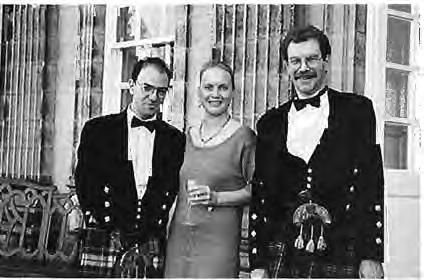
Australian Bar Association Conference, Edinburgh: Temi Artemi, Corrie Searle, Rob Cameron.



formal fusion for over 100 years, the response was: but your situation is not ours. Certainly, since the introduction of direct briefing (we believe that some 22 professions may in certain circumstances directly brief members of the Bar) the impact of fusion on the English profession may well be quite different from its impact in Victoria last century. This aspect of the conference highlighted to at least some of us the fact that the essential distinction between a barrister and a solicitor is that the barrister does not deal with the client direct. If that distinction goes, and barristers do not have a monopoly on appearance work in the higher courts, it is difficult to know what the distinctive criteria of a barrister are.
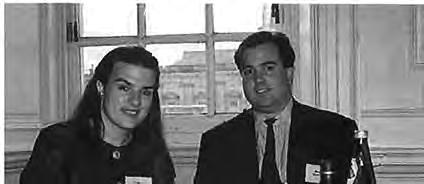



Certainly, in England, it would seem that fusion would result in a large part of the criminal practice of the Bar being taken over by the Crown Prosecutor's Office .
In Edinburgh the Bar were entertained by the college of advocates, in whose home, the old Scottish Parliament building, the formal sessions of the conference were held. The papers on "In Court Immunity" delivered by Chief Justice Black and Lord Prosser at the Edinburgh sessions of the conference were perhaps, with Doug Meagher's paper on Appointment of Judges, the most thought provoking (one of the editors has informed the
writer that although Meagher's paper caused some muttered disagreement from some participants, it was brilliantly delivered).
At an informal level the highlight of the conference must have been the dinner held at Hopetoun House on 10 July At that dinner at which genuine pipers and genuine Scottish dancing were to be heard and seen, a surprising number of delegates impliedly claimed Scottish ancestry. Men with very unScottishsounding names appeared resplendent in kilts.
Our cover shows part of the facade of Hopetoun House. A piper is about to lead the A .B .A . to dinner.

YOUR OPPONENT HAS SPRUNG AN UNanswerable legal point on you and it's against you? The bench is grilling you without mercy? You feel like a pinned butterfly? No worries! With the following cases in your court book you are more than a match for your wellresearched learned friend or the playful judge entertaining him or herself at your expense (q.v "Junior Silk's Speech" per Crennan Q C.: (Winter 1990) 73 Vic . BN 16 at 24) .
When Salomons came out of his retirement to argue the question of interference of State laws with Commonwealth instrumentalities, he protested to the High Court that "no lawyer would ever support" the proposition he was opposing. Griffith said somewhat sternly: "Y ou are forgetting that the Judges of this Court have already so held". Salomons replied, "I did not say no Judge would say so, I said no lawyer would say so"
A.B. Piddington, Worshipful Masters (1929) 203.
DON'T WAIT TO BE ELEVATED TO CREATE NEW LAW
" .... Mr. Wakefield, in one of the Chancery Courts, referred to what he described as an anonymous case [not yet reported]; and the matter for the time passed of. When Mr. 56
Bethell, however, came to reply, he said, "I have to inform your Lordship that that case has been overruled in the House of Lords". Thereupon Mr. Wakefield, somewhat losing his temper, retorted, "There never was such a case".
J.W. Norton-Kyshe, Dictionary of Legal Quotations (1904) 175.
One of the greatest equity judges of the last half century was the late Sir George Jessel, the first and so far the only Jew who had been raised to the English Bench. Jessel's appointment was received with a certain amount of misgiving, not on account of his attainments, which were unexceptionable, but by reason of an undesirable audacity which had occasionally marked his conduct of cases at the Bar. There is no doubt that at a pinch, in order to score a point, he was not above "improving" the actual text of the report which he purported to be quoting, and I well remember that this practice produced quite a dramatic little scene when, having sprung upon a particularly painstaking opponent some cases which apparently demolished the latter's argument, that learned gentleman, with an almost apoplectic gasp, requested that the volume might be passed to him. The result of his perusal was more satisfactory to himself than it was to

Mal Park.
Jessel, who, however, treated the matter as a mere trifle not worth fussing about and calmly restarted his argument on a new tack.
In this undesirable habit he resembled an eminent predecessor who, on investing some obsolete case on which he was relying with a complexion peculiarly favourable to his argument but quite new to the presiding judge, the latter quietly asked him to hand up his volume of reports. After a moment's critical examination the judge handed the volume back with the scathing rebuke: "As I thought, Mr. ---, my memory of thirty years is more accurate than your quotation".
Extract from Personalia (1903) by 'Sigma' reprinted in "The Lighter Side", 17 The Green Bag 499-500 (1905).
TO TALK TO A BUNCH OF DAMN FOOLS THAN TO LISTEN TO THEM
Sir Richard Bethell was once (so Sir Frederick Darley told me) rebuked in the Court of Appeal for too much speaking. The rebuke took the form of the significantly uttered question, "How long did this case take in the Court below, Sir Richard?" Bethell made a show of whispering with his junior, and then said, "I
was not in the case belo'w, Your Lordship, and I'm told it lasted two days, but there were no interruptions from the Bench." Bethell, of course, was famous for an imperturbable hardihood. When he became Lord Chancellor Westbury, his horses bolted, and his coachman called out over his shoulder, "My Lord, I'm afraid the horses are out of hand, what shall I do?" "Drive into something cheap!" was the callous reply.
A.B. Piddington, Worshipful Masters (1929) 235.
Lord Westbury (formerly Sir Richard Bethell) when delivering judgment against some unfortunate trustees said: "I am profoundly sorry for the embarrassment in which these gentlemen now find themselves placed. Had they taken the most ordinary precautions, had they employed a firm of reputable solicitors, had they taken the opinion of a member of the Bar, they would never have been enmeshed in the snares which now hold them".
This was a little too much for the learned counsel, whose brief contained an opinion dated some years back and signed "R Bethell", in which his clients were advised to follow the identical course they had pursued with such disastrous consequences. "My Lord," he said, "there is a paper here which I am unwilling to read in open Court, but which I would beg to submit to your Lordship".
"It is a mystery to me", continued the Lord Chancellor, with unabashed countenance, when he had perused the document, "how the gentleman capable of penning such an opinion can have risen to the eminence he now has the honour to enjoy".
Sir William Ball, Lincoln's Inn: Its History and Traditions (1947) 174-5.
A somewhat milder version found its way into the American reports:
Lord Westbury ... it is said, rebuffed a barrister's reliance upon an earlier opinion of his Lordship: "I can only say that I am amazed that a man of my intelligence should have been guilty of giving such an opinion".
per Jackson J., McGrath v. Kristensen, 340 US 162 at 177-178 (1950).
However, when they [Porter and Arnold] brought the document to the Supreme Court building, the court's clerk, a man nicknamed "Mr. Justice" Cullidan, said that he could not accept their plea. It had no docket number, he

argued. "Well, take any number from one to ten," responded the whimsical Thurman Arnold, "we don't care." But Cullidan insisted that all the formalities must be observed. "Well, now, look, Mr. Cullidan," said Porter, "we will effectuate a lodgment." As severe as this sounded, Porter didn't have the slightest idea what a lodgment was, except that he remembered hearing about this obscure pleading in a law course he had taken years ago at the University of Kentucky.
Murphy, Fortas: The Rise and Ruin of a Supreme Court Justice (1988) 94.
DISPUTATION - Jason Magnus and Barth Socinus, two eminent lawyers of Pisa in the fifteenth century, held frequent disputations on law subjects. One day Jason found himself driven hard by his adversary, and cited a law that he had that moment forged, which turned the dispute on his side. Socinus, not less quick and ingenious than his opponent, served him the same trick. Jason, who had never heard of that law, called upon Socinus to quote the passage. "It stands in the same page with that you have just cited," replied Socinus with great gravity, and without hesitation.
Jacob Ie Duchat. Willock, Legal Facetiae (1887) 248.
Continuing in the style set by his mentor, Frankfurter presented, in addition to the legal argument, the social one - the detrimental effects of long hours and low wages on labourers and the conditions which had led to the passage of the legislation in Oregon and other states. At one point McReynolds turned on him:
"Ten hours! Ten hours! Ten! Why not four?"
Frankfurter pause'd for a moment, then made his way slowly and dramatically to where McReynolds was sitting.
"Your Honour," Frankfurter replied, "If by chance I may make such a hypothesis, if your physician should find that you're eating too much meat, it isn't necessary for him to urge you to become a vegetarian."
Holmes was delighted with his young friend. "Good for you!" he exclaimed loudly and "embarrassingly", as Frankfurter remembered it.
Baker, Felix Frankfurter: a biography (1969) 128-9.
58
In a case he [Paul Freund] once argued for the government before the Supreme Court, the justices, in questions to the opposing counsel, brought up everything he had planned to say. Freund rose and said, "May it please the court, there is a typographical error on page ten of our brief." He corrected the error, and added, "If there are no questions, the government rests." The justices ruled unanimously for the United States. For years afterward, Felix Frankfurter told friends about that triumph. "Since I've been on the Court, I've heard learned arguments, I've heard powerful arguments, I've heard eloquent arguments," he used to say. "But I've heard only one perfect argument."
Notes and Comment, 'The Talk of the Town' column, The New Yorker (February 24, 1992) 27.
Responding to a defence submis-sion, the State Prosecutor [in Commonwealth of Massachusetts v. Lizzie Borden (1893)] William Moody said:
"I say of what my learned friend is pleased to call his argument - it is magnificent but it is not law."
London (ed), The Law as Literature (1960) 288.
Judge Hanecy was impatient as Darrow argued. The judge tried to stop him: "You might as well know, Mr. Darrow, what you are saying is going into one ear and out the other".
Darrow's unorthodox retort was in keeping with the irritation he felt towards the judge: "I'm not surprised, Your Honour. Maybe it's because there's nothing to interfere with the passage, Your Honour". Surprisingly enough, he was not charged with contempt.
In the same case Darrow cited authorities who had, in earlier proceedings, acted in opposition to Judge Hanecy's decision. He produced a law book with a flourish to give it added importance. Then he said, "Now, Your Honour, I want to cite this specific case which resembles the one at bar in four important respects: one, it is a contempt case; two, it's a constructive contempt case; three, it was an appeal from the Honourable Elbridge Hanecy; and four, it was reversed by the Supreme Court as I expect this case to be".
Weinberg and Weinberg, Clarence Darrow: Sentimental Rebel (1980) 81.

Charles P. Thompson who served on the US Supreme Court (1823-1843) at one time in his practice had a client named Michael Dougherty, who had been arrested for the illegal sale of liquor. The police had no evidence except one pint of whisky, which their search of his alleged kitchen bar-room revealed.
In the Superior Court this evidence was produced and a somewhat vivid claim made of prima facie evidence of guilt by the prosecuting attorney. During all this Mr. Thompson was silent. When his turn came for the defence he arose and said: "Michael Dougherty, take the stand". And Mike with his big red nose, unshaven face, bleared eyes and a general appearance of dilapidation and dejection, took stand. "Michael Dougherty, look upon the Jury. Gentlemen of the jury, look on Michael Dougherty," said Mr. Thompson. All complied. Mr. Thompson himself, silently and steadily at for a moment, slowly and with solemmty turned to the jury and said: of the jury, do you mean to say to thIS and to me that you honestly believe that MIchael Dougherty, if he had a pint of whisky, would sell it?"
It is needless to say Mike was acquitted. From The Green Bag magazine.
Mr. Paris Nesbitt, K.C., who was in the habit of living and talking dangerously, caused a flutter in the High Court on the hearing of an appeal in which he acted as counsel. In the course of his argument, he made some statement relating to the law of trusts.
"That sounds rather startling," said Sir Samuel Griffith; "what is your authority for that proposition?"
" "I have thought," Nesbitt replied, that It ,:"as unnecessary to require authority for anythIng so obvious." Turning to the solicitor instructing him, he said, "Get me a textbook the Law of Trusts from the Supreme lIbrary." As the solicitor was approachIng the door leading out of Court, Nesbitt called out, in the hearing of everyone, "Any elementary book will do!"
Jacobs, A Lawyer Tells (1949) 153.
As Jacobs says, it takes courage to do a thing like that. Good luck and, by the way, make sure you've boned up on Lloyd v. Biggin [1962] V.R. 593 relating to contempt of court by counsel.
The narrator is Sir Hubert Ostler retired Justice of the NZ Supreme Court: ' " as I read I lit my pipe, shook the match and, thinking it was out, dropped it into the wastepaper basket, which happened to be fairly full. But the match had not been extinguished, and presently I heard a noise and on looking ro.und found a merry fire, the paper being well alIght. I promptly picked up the basket and dropped it out the window, and on looking out to watch the result I saw it descend on to the head of Mr. Justice Cooper, who had just emerged from the door. There was no time to warn him. It landed on his hat, and blazing papers were shot out and showered around him like Greek fire. He let out a yell and jumped !ike a fright.ened horse. He must have thought It was the fIery chariot of Elisha. I never saw such a mingled look of fear and anger as was on his face when he gazed up and found that I was responsible, and it took quite a lot of tact and humility to persuade him that it was not an prank." [Ostler had not yet been appoInted to the Bench and was a practitioner at the time.]
Portrait of a Profession: the centennial book of the NZ Law society (ed R. Cooke 1969) 71. '
Mal Park
Stress and Tension Relief, Relaxation, Sports Injuries, Aoupressure, WorkCare-Accredited
B. App. Sc., CM (VSM), MSCM
Downtown Aerobics
Rear 500 Bourke Street, Melbourne
Phone: (03) 670 9291
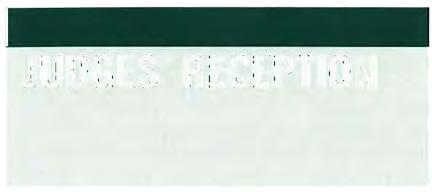
ON WEDNESDAY 19 AUGUST THE BAR
Council hosted a reception for judges. It was attended by representatives of all Federal Courts and all Victorian Courts other than the
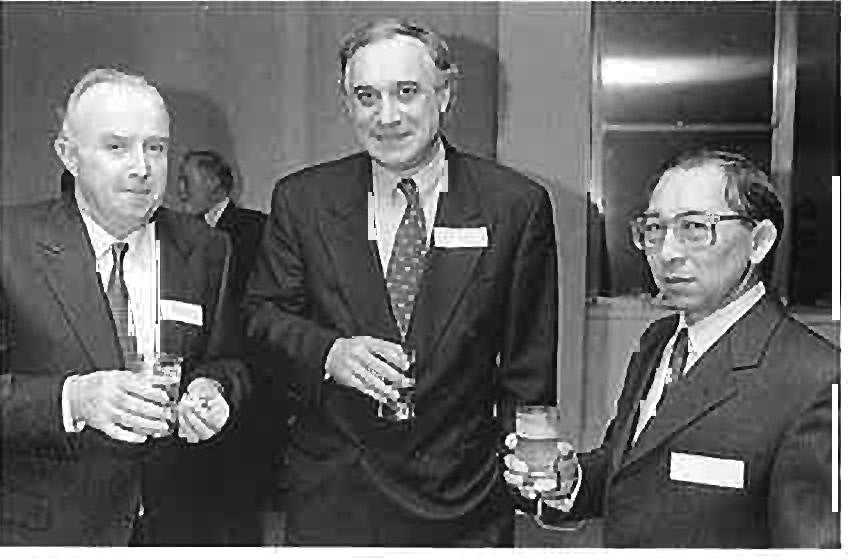

Magistrates Court and by the sole representative of this Bar on the International Court of Justice.
The Bar News photographer attended to obtain candid shots of the judiciary letting its hair down and of barristers in appropriate obsequious poses.
On the same evening our photographer took some photographs in the street outside Owen Dixon Chambers East (apparently with a view to informing the Irish Bar of how we dress and behave). At least one of the photos so taken indicates an appropriately serious approach to the frivolous side of life.
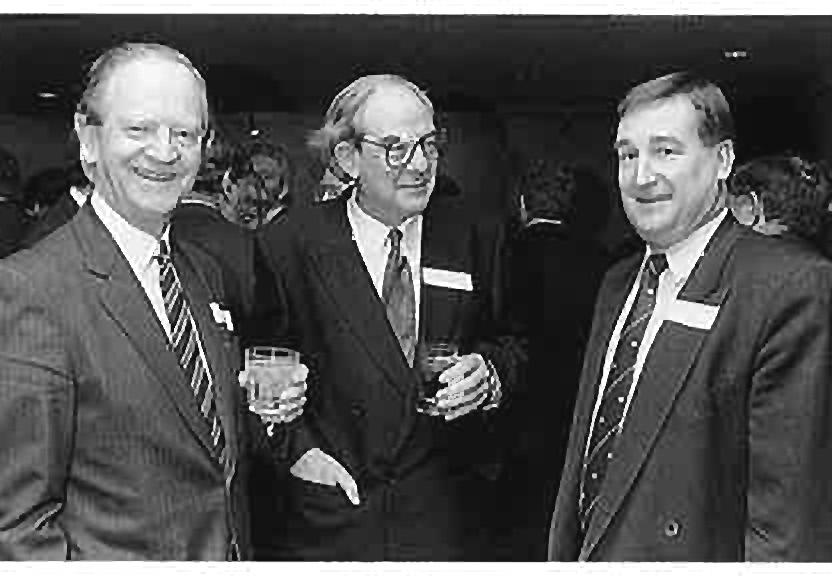


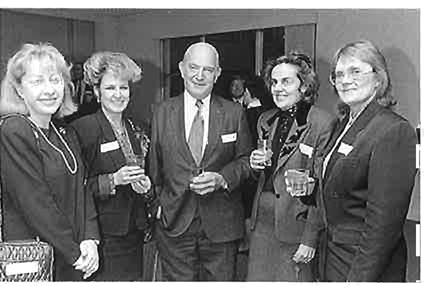
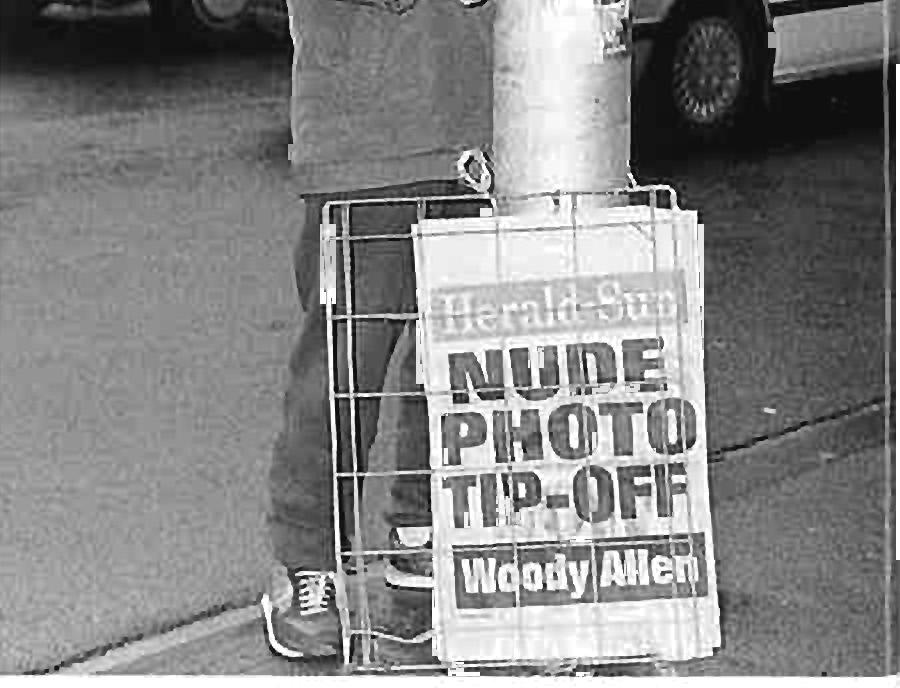

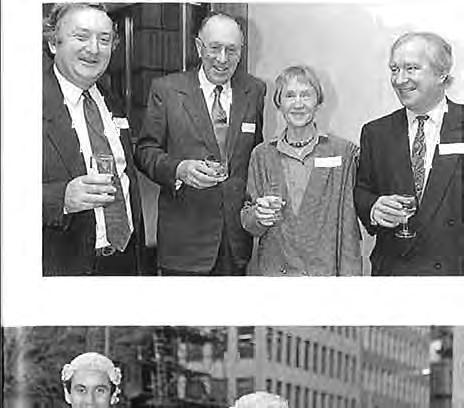
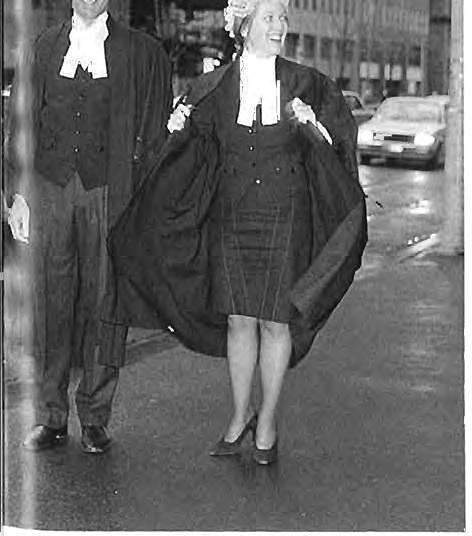
A RECENT SURVEY IN ENGLAND CONtains good news for balding barristers. It may not be possible to replace lost hair. If the clients have their way, however, baldness can still be disguised, at least in court.
In The Times of 3 July 1992, under the heading "Criminals Tell Rumpole To Keep His Hair On", Frances Gibb describes the result of the survey as follows.
Rumpoles were celebrating in every corner of the Temple yesterday as the first verdicts were delivered on whether judges and lawyers should keep their traditional horsehair headgear. The resounding view from defendants, who get closer to wigs than anyone, is that they should stay.
A survey by Counsel, the journal of the Bar Council of England and Wales, found that crown court defendants topped the list of those who wanted lawyers to hang on to their robes. Even the most dirty, greying or moth-eaten wig and scruffy gown, the daily uniform of Rumpoles up and down the country, was preferable to the drab garb of a pin-striped suit.
The message from the dock was that the wig conferred dignity and the stamp of authenticity: "I want to be represented by a proper barrister with a wig." Eighty-four per cent of defendants felt "more confident" when their barrister dressed up in his wig and gown, and 77 per cent when the judge did so.
The survey makes gloomy reading for wigless solicitors aspiring to breach the Bar's sanctum of the crown court. When defendants were asked whether they favoured the wearing of robes in court, 89 per cent were for and none against. Among all court users, including witnesses and friends, 79 per cent favoured the retention of wigs and gowns.
Two weeks ago, the Lord Chancellor, Lord Mackay of Clashfern, announced that he was putting the issue of wigs out to public consultation. The Lord Chief Justice, Lord Taylor, 61

has pronounced himself in favour of their removal, but judges are divided.
The public, it seems, has no doubt about the matter. The survey, conducted at Oxford courts over three days, tapped the views not only of defendants but of parties in county court disputes, witnesses in crown and county courts, relatives or friends of someone in court, and others such as press, court staff and probation officers.
Defendants were the most enamoured of the benefits bestowed by robes, followed by county court witnesses (82 per cent), parties to county court disputes (79 per cent), crown court witnesses (77 per cent) and relatives and friends (71 per cent). Robes, it was felt, lent dignity to court proceedings and emphasised the importance to witnesses of telling the truth. Defendants were less happy about this proposition, with 58 per cent agreeing. Among crown court witnesses, 84 per cent agreed.








This week, while hearing the case of the anorexic l6-year-old girl, the judges of the Court of Appeal, headed by the Master of the Rolls, Lord Donaldson of Lymington, removed their wigs because of the heat. Perhaps it was a foretaste of things to come, Lord Donaldson commented.
Not, it seems, if the public has anything to do with it. Itchy, antique, ridiculous and unhygienic they may be, but wigs would appear to be here to stay.
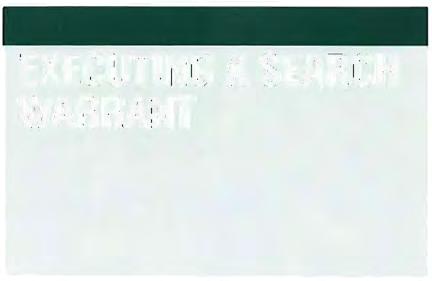
[The following extract is taken from the reasons for judgment in R v. B (Full Court of the Federal Court, unreported, 22 April 1992), where the Court canvassed the manner in which officers of the Australian Federal Police executed a search warrant.]
The Crown case as given in evidence was that on 17 June 1990 members of the Australian Federal Police attached to the Special Operations Team, dressed in combat gear, attended premises at 7 Holden Place, Flynn, entered the premises with the use of a sledge hammer on the front door and proceeded to execute a search warrant issued pursuant to the Drugs of Dependence Act 1989. Constable Andrew Kevin Brown used the sledge hammer on the front door and as he did so said in a very loud voice the words "Police, get down, get down." He and other police went through the doorway, again saying the same words. Four officers entered the house. The other members of the police force were also using the same words, or "Police. It's the police" in a very loud voice.
Constable Brown moved down the hallway of the premises then turned towards the bathroon. He looked in the bathroom and there was no one located there. He said in a loud voice the word "Clear". He then opened the door to a bedroom. Constable Rath was behind Constable Brown and just before the door was opened, Constable Rath tapped Constable Brown on the shoulder and said the words "With you". Constable Brown then opened the bedroom door with his foot. Immediately upon forcing the door open, Constable Brown said again the words "Police, get down, get down" in a very loud voice. As the door commenced to open he saw the accused approximately in the middle of the bedroom. He again said the words "Police, get down, get down" in a very loud voice.
We set out Constable Brown's evidence as to what happened next:
"What did the accused do? - At the time I first saw the accused, he was moving in a manner deliberately progressively towards myself; he continued with that movement.
"Did you notice anything about him other than he was moving towards you? - Ye s , I did. I noticed he was approximately 6 foot tall and of very large build. He had a white shirt on, it was unbuttoned and he had black pants on . I saw that his right arm was extended at this shoulder height and held in his right hand was a knife.
"Now, what then happened? - The momentum of opening the door caused me to move approximately a pace, or half a pace into the bedroom The accused still continued to move towards my location in the doorway area I again called on him, "Police, get down, get down" again, in a very loud voice and I then discharged a shot into the chest area of the accused."
Constable Brown's estimate of the time lapse between first entering the house and first seeing the accused was ten seconds approximately.

attended this year's Bar Dinner will recall that His Excellency the Governor there mentioned the proposal of the Hawk's Nest Road Ratepayers' Association to commemorate His Excellency's appointment as Governor in an appropriate fashion.
With His Excellency's permission the letter from the Hawk's Nest Road Ratepayers' Association is set out below.
"Dear Mr. Justice McGarvie,
As you are a former resident of the Hawk's Nest Road (or McGarvie's Road to be exact), the Ratepayers' Association would like to congratulate you on your appointment as Governor of Victoria.
To celebrate the event we decided to take up a collection and provide a marker in front of the Pomborneit East School. We envisaged a plinth of local stone with a brass plaque set into it saying: "Mr. Justice Richard McGarvie, Governor of Victoria 1992-19? attended this school."
However, the collection along the Road only raised $1.71, so we have had to modify our ideas. With a little more fundraising (we thought we would raffle a bag of spuds), we hope to make enough to buy a can of spray paint and write "Dick wos ere" on the school wall. We have a young man lined up to do the job. He assures us he has done a lot of that sort
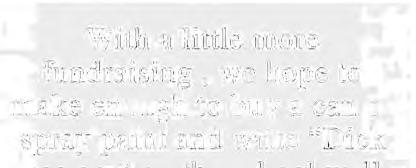
was ere" on the school wall. We up

of work on the trains down in Melbourne. He's now into alternative farming and grows some sort of strange Asian vegetables in small plots between the barriers.
We have not, as yet , approached the owners of the school but as it is badly in need of a coat of paint I'm sure they won't object.
We hope this plan will meet with your approval.
Our regards to Mrs. Justice McGarvie and all the little Justices McGarvies.
Yours faithfully, Lorraine Black Secretary H N.R R.A."

THOSE WHO FOLLOW THE ON-COURSE fortunes of our colleagues' race horses will be aware of Jim Merralls' most recent out-ofcourt coup. He is the part-owner, as well as the breeder, of two horses that won races on the same programme at a mid-week meeting in Geelong on 20 August.
Jim's promising three-year-old filly, Walnut Tree, won the 1500 metres race for fillies. Ridden by Craig (aka "Gunga") Dinn, Walnut Tree was disconcertingly tailed off by a sufficient margin literally to be out of the picture during most of the Sky Channel telecast. As the field approached the turn the filly made up ground but looked to be facing an impossible task. When she straightened she gamely threaded her way through the field and took the prize by a short half head.
Two races later the familiar black and tan silks were perched atop the handy seven-yearold stallion Molson. Tommy Nikolic rode a superbly controlled race positioning Molson no more than half a length behind the leading horse. In the straight he patiently held Molson together, and with 200 metres to go, gave him his head: the flashy black ran away to score a most convincing win.
Both horses share the same sire, Watney, a
stallion Jim bred, having raced his sire, Beer Street. In a distinguished racing career, Beer Street won eight races including the Caulfield Cup and the Herbert Power Handicap. Watney was an excellent sprinter-miler of the early 1980s and as a sire has produced some good winners from limited opportunities. One of his best is Molson, who at the time of going to print, has won eight races. Walnut Tree, out of Elderberry, is a full sister to Watney' s best son to date, Double Gin, who has won in excess of $300,000. The breeding of Double Gin and Walnut Tree is unusual for the fact that their grand dam, Gin Lane, is a full sister to their grand sire, Beer Street.
Merralls' greatest surprise came some time later during a small celebratory lunch to which The Age racing journalist, Cathy Walker, was invited. Impressed by his knowledge of racing, Cathy accorded Merralls the rare distinction of inviting him to be part of her team at an upcoming racing trivia competition.
We wish Jim good luck during the coming spring carnival and we also warn the stewards of the trivia quiz to be on the lookout for a well informed tall dark horse who speaks no Latin or Greek.
Kurt Esser

NOT SO LONG AGO, AS A RESULT OF considerable financial assistance from other members of the family and an uncharacteristic moment of benevolence from his bank, Clive Penman was able to attend the Penman family reunion in Paisley, Scotland.
Clive took his trusty, although somewhat aged camera with him, and managed to use 3 1/2 rolls of film whilst in bonnie Scotland. Unfortunately, and unaccountably, only 3 photographs came out: Bar News is extremely fortunate to have secured the world wide
exclusive rights to those photographs. Although they came without captions, Bar News is able to provide a transcript of Clive's description of their contents.
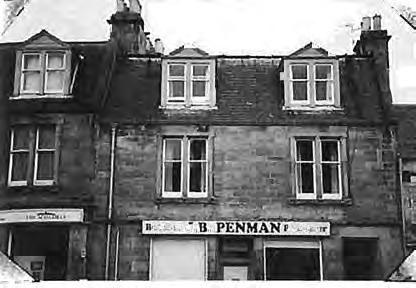
"This is great-uncle Jimmie's shop. Greatuncle Jimmie is the success story of our family. We all look up to him and hope to emulate his feats. He has been highly organised all his life. As you can see he has divided his shop into two parts. Through the left hand door is his butchery and through the right his poultry business. His son, Jimmy Junior, helps in the business. It seems that when Jimmy Junior has the day off great-uncle Jimmie spends a lot of time dashing from one shop to the other. He keeps saying that winter will be the death of him. I suppose that is because business isn't so good them."
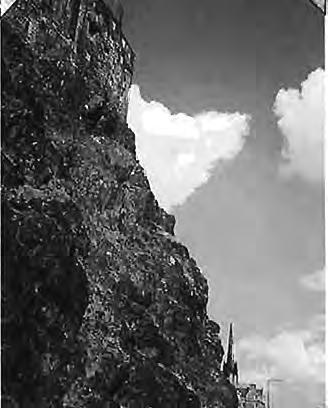

"This is Edinburgh Castle where they have the Edinburgh Tattoo each year. You can just see George Street at the bottom. It took me
nearly all day to climb up to the Castle. I suppose it would have taken me longer if it had been steeper or smoother. I was very surprised that I was the only person going up to look at the Castle. As it was during the tourist season, the weather was uncharacteristically fine - for Scotland - and the Castle is so famous you would have thought others would have been interested in going to the Castle. Maybe it was because the Queen was down in London trying to sort things out with her daughter-in-law. Anyway, by the time I got up to the top it must have been after closing time because I couldn't find the doorway. It was certainly well camouflaged when shut!
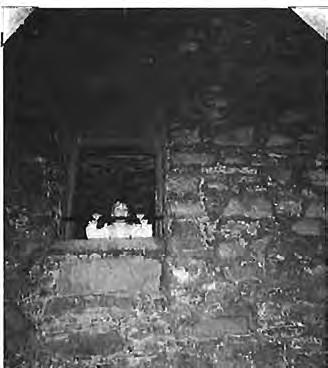

"Just as I was nearing the top I heard this voice from the wilderness calling out 'Daddy, Daddy'. It sounded like one of the twins. I am not sure which one. I always have trouble telling them apart. Anyway, when I looked down I could see a head poking out of one of the dungeon windows. It was one of the twins. I don't know how she got there. I was too pooped and in too much of a hurry to hang around talking. She said something about a mesne entrance. I still don't know what she was talking about. She does have some nice pictures of the inside of the Castle but I don't know where she got them. She says she took them. Like a good Barrister I did not press her to make further admissions to me."


JACK WANT: ATTORNEY-GENERAL, Yachtsman, Shooter and Benefactor of Tom Dudley
An advertisement in a recent edition of Australian Law News briefly recounts the facts of R. v. Dudley and Stephens (1884) 14 Q.B.D. 273.
"A yachtsman, Tom Dudley, wanted to emigrate to Australia. He accepted a commission to captain a 52 foot yacht, the 'Mignonette', sailing from Southampton to Sydney, with a crew of three others".
As is well known, after being shipwrecked in a South Atlantic storm, the crew escaped in a dinghy where they suffered days of acute thirst and starvation. Driven by hunger, three of them killed and ate the fourth. His name was Richard Parker. Dudley and Stephens were subsequently tried for murder and Holmes was tried for manslaughter. All were convicted and notwithstanding the death penalty imposed both Dudley and Stephens were released after serving six months.
What is not generally known is that the purchaser of the "Mignonette" who had commissioned Dudley to find a crew and to sail her to Australia for him was the eminent Sydney bar-
rister Jack Want on a visit to England. Upon Dudley's release Want assisted him to emigrate to Australia and was helpful in Dudley establishing a new life here.
"At a time when Jack Want was Attorney-General of NSW and was at Wagga on circuit, he had permission of a station owner to shoot over his paddocks. He took Jim Gannon out with him and they proceeded to shoot, whereupon a boundary rider, who did not know the twain or that they had permission to shoot and would not believe Gannon's assurance that permission had been granted, very roughly and rudely ordered them off the place. The Attorney-General cheerfully said, 'Shoot the swine, Jim -I won't file a bill'." Wilfred Blacket, May it please your Honour (1927) 22l.
Another little known "fact" relating to Dudley and Stephens is that in 1838, Edgar Allan Poe published a short story called "The Narrative of Arthur Gordon Pym" (see The Complete Works of Edgar Allan Poe, ed. Harrison, Vol. iii), which told of how four men survived in an open boat after a shipwreck, until, driven by hunger, three of them killed and ate the fourth. His name was Richard Parker.

[In an article by Miles Kington published in the London Independent on 9 July 1992, a case is made out for deregulation of (at least) the medical profession. The article also highlights the futility of persisting with crossexamination of some witnesses.]
ONE OF THE MOST INTERESTING TRIALS taking place in London at the moment is that of Colin Stimpson, who is accused of conspiring to deceive the NHS.
66
The charge is that, completely without medical qualification, he did for 20 years hold down a series of major posts in a London hospital that now wishes to remain anonymous. Stimpson admits the charge, but pleads his actions were entirely justified. This extraordinary stance emerged yesterday when he came under cross-examination for the first time
Couusel: You are Colin Stimpson? Stimpson: No. I am Dr Colin Stimpson.
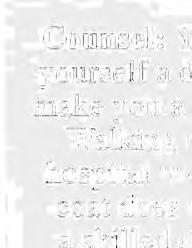

Yes, but calling doctor not a surely? up down wards white not you diagnostician, does it?
symptoms they are presented with and know how to deal with them. The same is true of bogus doctors, of course .
Counsel: And how, pray, maya bogus doctor recognise real symptoms?


Counsel: The court has already heard that you have no right to call yourself doctor.
Stimpson: A man may call himself anything he chooses. If that were not so, Screaming Lord Sutch would be in the Tower of London by now
Counsel: Yes, but calling yourself a doctor does not make you a doctor, surely? Walking up and down hospital wards in a white coat does not make you a skilled diagnostician, does it?
Stimpson: No more or less than walking in and out of law courts in a wig and gown makes you an adequate judge of human behaviour.
Judge: I think this is not an argument you are likely to win, Mr Gascoigne. I suggest you get on with it.
Counsel: Very good, my Lord. Now, Mr Stimpson, would you not agree that for the last 20 years you have been pretending to know what is wrong with your patients? You have masqueraded as a curer of ills you did not always recognise?
Stimpson: All true.
Counsel: Does this not make you a bogus doctor?
Stimpson: Certainly not. The same is true of all real doctors.
Counsel: Are you seriously suggesting that qualified doctors would pretend to be in charge of a situation when in fact they did not know what was going on?
Stimpson: Not all the time. All doctors from time to time find that they recognise the
Stimpson: Oh, but most symptoms are not real at all. The vast majority of patients I see have symptoms which are either bogus or passing. Do not forget that the body is a selfhealing mechanism, and a high proportion of illnesses will clear up by themselves. Treatment might only exacerbate the condition.
Counsel: Are you saying a real doctor might make a mess of a case that you would treat more adequately by leaving alone?
Stimpson: Of course. There is even a word for it, "iatrogenic". It means "of an illness caused by doctors".
Counsel: I see. And is there a word meaning "of an illness caused by a bogus doctor"?
Stimpson: I doubt it. There is not much need for it. Bogus doctors have to be very careful. They are much more likely to be caught out than real doctors, so they have to do less damage.
Counsel: Are you saying that you would be safer seeing a bogus doctor than a real one?
Stimpson: Absolutely no question. A real doctor may occasionally spot a genuine condition, but it takes a bogus doctor to spot an unreal one.
Counsel: Meaning?
Stimpson: A great many patients who seek treatment through the NHS are not genuinely ill at all, but seeking comfort, or advice and a caring ear. They may be suffering from pychosomatic disorders, or malingering, or faking illness to get off some arduous task. They may recently have read about some disease in the Sun, or heard about it on the Esther Rantzen show, and have convinced themselves they have the symptoms.
They are all, in one way or another, bogus patients, and who better to treat them than a bogus doctor?
Counsel: Are you saying that many ordinary people are guilty of approaching the NHS on false pretences?
Stimpson: Guilty is the wrong word. It is not against the law to be a bogus patient. If it were, our prisons would be full of people wheezing and coughing and saying: "A doctor, quick - I'm dying!"
Judge: I'm sorry, but I shall have to adjourn the court. All this talk has made me feel unwell.
Stimpson: Shall I take a look at you, my Lord?
Judge: No, no! Keep him away from me!
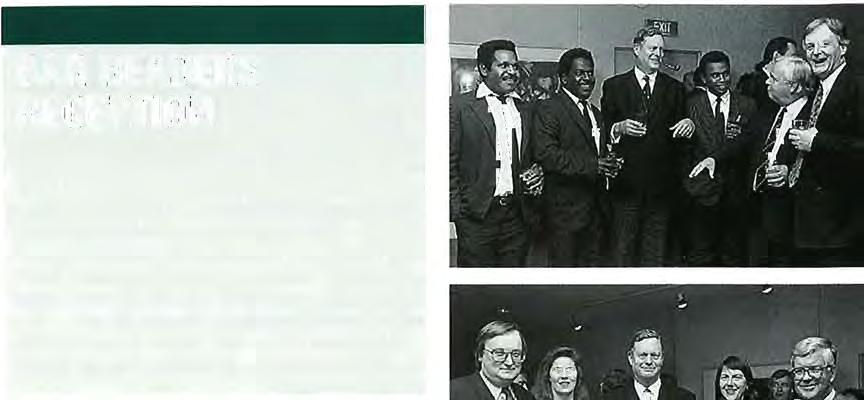
THEY ARE STILL DOING IT. BUT THERE are not so many of them. Twenty-eight or so brave souls to be precise. Twenty-eight folk throwing themselves into the breach - the September intake of Bar readers to be precise. They were welcomed by the Bar at a reception in the Essoign Club on 1 September. This will be their last free drink for a long time.
The new readers were given the opportunity to mix with members of the judiciary and those who put in a lot of work ensuring that the readers course remains at its high standard. As the photographs on this page testify all present had a thoroughly enjoyable time.
All the stories of doom and gloom obviously have not diminished the faith of these hardy characters to succeed at the Bar. The Bar welcomes them and trusts that they will continue on practising in a separate and independent Bar.
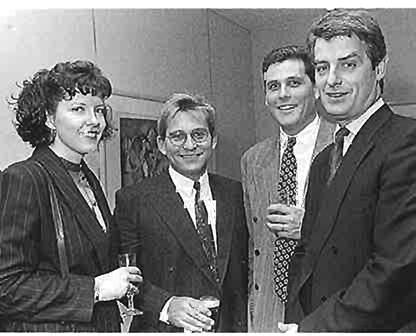
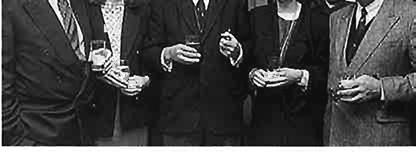




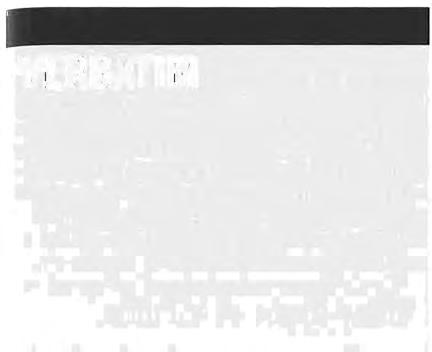
Coram: Phillips J. 19 June 1992
Shears v. Chisholm
Phillips J.: I am concerned to know what you say [Beaudesert Shire Council v. Smith (1966) 120 C.L.R. 1451 decides, because I am bound by it.
Sher: Three things have to be established: it has to be a positive act, that is to say you have got to actually do something, not refrain from doing something; it has got to be intentional in the sense that what you do is the conscious exercise of a decision to do it.
Phillips J.: Conscious, voluntary and deliberate.
Sher: That is it, like murder. And finally, it has got to cause damage.
Phillips J.: That would do away with the law of negligence. I drive a car intentionally, I intend to drive it; if my driving causes damage to someone, I am gone on this principle, no need for a duty.
Sher: I suggest Your Honour drive with more care.
The following letter was recently submitted by a defendant in person to a Local Court in New South Wales.
"Dear Mr. Credit Manager,
In my view you are an idiot.
If you did your job properly as a credit manager you would have shown the common courtesy of telephoning an alleged debtor prior to issuing proceedings. The fact that you did not makes you officious and aggressive, but not an idiot.
If you did your job, you would have spoken to your people in Melbourne and have established that no contract has ever existed or was even proposed between my company and your company. The fact that you did not speak to them implies you are auto-
cratic and probably selfish or at least lazy, but still not an idiot.
If you did your job you would realise that the only contract ever proposed was between myself personally as trustee for my personal trust and your employer. At the time of negotiations, my company did not even exist, having been incorporated on 7 April 1992. This makes you careless or incompetent, but still not an idiot.
If you had done your job properly you would know that I signed an offer to purchase your employer's services and then withdrew that offer some 7-10 days later. You would therefore know that the offer was withdrawn some 2 full weeks prior to the Melbourne office posting out their standard acceptance letter meaning that the letter of acceptance was worthless. You should know that an offer lapses if not accepted within a reasonable amount of time. Ignorance of the law does not make you an idiot, but nor is it an excuse.
So, according to me you have more than a fair quota of character faults none of which I can help you with.
I will not let you get away with hanging a shitty bum rap at CRAA and Dunn and Bradstreet for my company. I demand that your incompetence be expunged from the records of the reporting agencies. So what makes you an idiot. Well you would be a bloody idiot if you think I am joking and don't rectify the damage recklessly caused by you.
Yours sincerely,"
In commenting on the decision in Beach Petroleum NL v. Johnson the CCH Australian High Court and Federal Court Practice, Report 159 said:
"The case deals with the degree of probability of inability to pay which will be sufficient to enliven the section [Corporations Law s.1335 dealing with security for costs]. It applies the test that there be credible evidence that there is reason to believe there is a real chance that in events which can fairly be described as reasonably possible the applicant will be unable to pay on service of the allocatur".
Coram: Judge Kimm and a jury of six 6 May 1992
Guiton v. Collingwood Community Health Centre
Monahan to medical witness: "Doctor, don't you think it would have been preferable for the plaintiff to have been examined using a proctoscope?"
Witness: "I am using hindsight".

Cor: Wallwork J. and jury 16 July 1992
The Queen v. Cisinski
Maxwell for the Crown Percy for the accused Percy: "Do you remember my friend asking you questions about that?"
Accused: "Your friend - could you please ... " Percy: "My friend Mrs. Maxwell"?
Accused: "Yes. I didn't know she was your friend" ..
Percy: "It doesn't seem like she is my friend from time to time, but it is what we call each other in the court".
Cor: Johnston M. 5 August 1992
Informant, asking for a remand/rebail of defendant who had previously failed to appear: "Miss Lewis has come in off her own velocity to explain why she failed to appear "
Cor: Harper J. 26 August 1992
Pickins Echuca Equipment Pty Ltd. v. Echuca Insured Housing Loans Pty. Ltd.
Hardy: "The third case, Your Honour, is a decision remarkably by Vasta J. constituting the Supreme Court of Queensland. I went to law school with Vasta J.".
Harper J.: "Only one of your many points of distinction, Mr. Hardy"
Coram: Byrne J. 8 July 1992
Kennedy v. Grabner Meldrum Q.c. and Tobin for Plaintiff
P.D. Elliott for Defendant
(Cross-examination of a former employer of the plaintiff as to the plaintiff's attitude to the employer):
70
Elliott: Did you get on with him?
Witness: Did I get on with John? Yes? Yes.
Elliott: You see in evidence - excuse the language, Mr. McDonough - he called you "a little prick" in the evidence that he gave, and that he said that you wanted too much. "He wanted a tradesman and I wasn't a tradesman and I told him that." What do you say about that?
Witness: Well I might be "a little prick" but I mean, what boss isn't.
Coram: Judge Spence
25 August 1992
Lee for D.P.P.
McKenzie for Defendant
Lee: We will need an interpreter sworn first, your Honour.
Tipstaff: He has understood so far what I have said.
His Honour: Yes. What is your name?
Witness: Peter Athanasakis.
His Honour: Where do you live?
Witness: 75 Blyth Street, Brunswick.
His Honour: Are you working?
Witness: Yes.
His Honour: What is your job?
Witness: I am an amusement operator.
His Honour: Metal?
Witness: Amusement.
His Honour: That is my error, not yours. Do you own a motor car?
Witness: Yes. Monte Carlo.
His Honour: What sort of motor car?
Witness: Monte Carlo Amusements.
His Honour: Do you own a motor vehicle. Witness: Yes.
His Honour: What model?
Witness: It's games for people, people games. His Honour: Do you own a motor car? Do you drive a motor car?
Witness: No motor car. The name for my business is Monte Carlo.
His Honour: You don't have a motor car?
Witness: Yes.
His Honour: (a little later) Look, we will have the interpreter.
Coram: Judge O'Shea 16 March 1992
Jahangier Ahmadi, sworn on Koran and examined:
Sullivan: Would you state your full name, please?
Jahangier Ahmadi .
His Honour: How do you spell all this? J-a-h-a-n-g-i-e-r A-h-m-a-d-i.
Sullivan: Would you state your address, please Flat 209, Brighton Road, Elwood Your name is not Feda Eqbal? No. Your Honour there appears to have been a bit of a misunderstanding I do not propose to lead evidence from this witness because he is not the person I was planning to call.
Coram: w. Gibb M . 4 August 1992
In making a plea on behalf of a young man on a charge of use and possession of cannabis Cantwell (for the defendant). "T he co-accused ha s gone to Tasmania where the grass is greener".
His Worship: "Meaning the grass you mow I hope?"
Cantwell: "Ah! Yes, your Worship!"
27 August 1992
Tan Lonie, solicitor for the City of Malvern Robert Osborn, for an objector to the proposal
L onie: (Explaining reason for interjection): "I was just endeavouring to assist Mr. Osborn ". H. Turnbull (panel member): " He's from the Council, Mr. Osborn, and he is here to help you".
Coram: Judge Barnett
28 July 1992
R. v. Mlinerevic
[Defendant was charged with digital penetration rape]
Ms. J. Nicholson, prosecuting, in her opening address (whilst discussing the burden of lJ roof): "Members of the jury , the accused does not have to lift a finger to prove anything".
Coram: Judge Dyett R. v. Komlj e novic Lasry pro sec uting. Parsons for the accused
Accused: I don't know what the point is to argue about it Your Honour. I'm not familiar with the point I should perhaps be arguing with but I don't know, can he do that?
Mr. Lasry: Your Honour, can I perhaps assist.
His Honour: Yes.
Mr. Lasry: I think the argument against it, if I may say so, is that it would be pointless because the jury won't understand - they may never unde rs tand what the witness is talking about and it may lead them to guess about what was said by Mrs. Wallace and that in the end instead of attending upon the evidence they will be wondering if they pay attention to the evidence, they will be wondering what Mrs. Wallace told him and what it was that was so important that then led him to make contact. That would be the argument I think I would be putting if I were on the other side of this case.
On the other hand ...
His Honour: If you were the judge and you had to make a ruling , how would you rule ?
Mr. Lasry: No question about it. I'd rule in my own favour and I would award costs and congratulations.



,-f
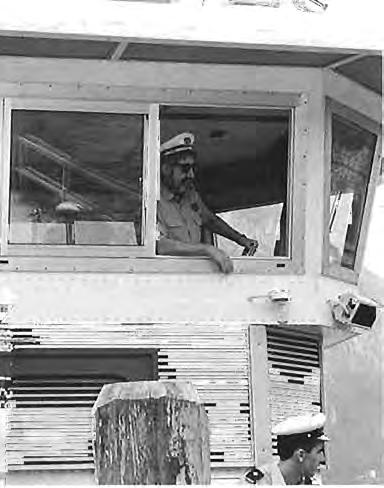


whilst I tell you about the VicBees. Much has happened since we were last together.
As you know VicBees are closely related to the SollyBees. Although SollyBees are far more common and generally look like the VicBees very few of them affect the stark black and white plumage of VicBees. Generally speaking SollyBees do not gather in large colonies although there are a few around the centre of Melbourne. Unlike the utilitarian Hives of the VicBees the larger of the SollyBee Hives feature large amounts of marble, glass and vestibules.
There are many among the ranks of VicBees who sincerely believe that SollyBees constantly hanker to become VicBees. Far too many VicBees even think they are better than SollyBees. Lots of SollyBees think they are better than VicBees. The Animal Sociology jury is still out on why more Solly Bees become VicBees than vice versa. Those who give credence to the notion of Solly Bees wanting to become VicBees recently found great support for their theory. SollyBees had to decide a major issue - should they continue to merely harvest great amounts of pollen or should they harvest large portions of the flowers themselves? Their elders decided on a referendum confidently expecting either apathy, a close vote or if anything support for the line of the elders. After all that is what VicBee elders always did. Imagine their surprise when apathy not only gave way to a large vote but to a large vote against the elders' preferred position. Just like their VicBee counterparts, however, the SollyBees elders not to be daunted ignored the results of their expensive vote and chose to go full steam ahead with their minority viewpoint. VicBees were also on the move. They wanted to make decisions too They decided that they desperately needed a new ClerkerBee. So they looked hither and thither and found a new ClerkerBee. The VicBee elders will need to give him lots and lots and lots of honey for a long long long time to keep him going. Unlike the older well established ClerkerBees he will not be able to rely on his friends each making him regular contributions from their own harvests but rather he will have to continue to help oet his friends with little immediate prospect
72
of reciprocation. A very small number of VicBees who think they are also clever VicBees thought it might be better if their elders gave lesser amounts of honey to existing ClerkerBees on condition that they used the honey to help maintain larger groups of apprentice VicBees.
Some VicBees are also quite concerned about the trouble they have in moving in and out of the two main entrances to their biggest hives. For longer than most of them care to remember those exits have been blocked by bits and pieces of old junk used to prop up a GovBee hive . To some it looks more like an untidy bower bird's nest than a properly maintained Hive. Although the junk was thought to have been only installed for one season as a sort of temporary thing many believe it will be there permanently. Others believe it is no more than the BankruptBee's Georges Pompidou Centre so beloved of ParisBees. As far fetched as that may sound, it appears that the fashion is catching on, for not far away from the VicBees biggest hive is a small TelecomBee Hive which has also taken on the Georges Pompidou Look and appears likely to stay that way for a long time.
Some philistine VicBees have gone so far as to say that the junk must go - that it is a BeeNuisance, it is BeeAwful, it blocks their movement in and out, it blocks the views from their hive and it has caused their hive to lose a great deal of its dignity. Unfortunately, it is the GovBees who put the junk there, the GovBees haven't any honey to give WorkerBees to take the junk away and of course GovBees don't like VicBees and don't really care what VicBees think or want.
I suppose no story about the VicBees would be complete without a tale about another attack on the VicBees. This time it is the TeePeeBees who are going to try really hard to find ways to make VicBees fight much harder among themselves over each and every flower. It seems that the TeePeeBees think that the flowers themselves are the best to judge which VicBee is best suited, experienced and skilled in collecting their particular pollen. Although many VicBees are still recovering from the injuries suffered in skirmishes with the ReformBees it seems that the VicBees are confident that they will not suffer as much at the hands of the TeePeeBees. You may think that is a little strange as the TeePeeBees' aims are not all that different to those of the ReformBees, even if their means are a little more subtle and a lot less crude. Only time will tell and time has run out for us tonight. Perhaps a little more on another night. (To Be continued).
Candidates have three hours to answer this paper. Each question is worth five marks. Five marks will be deducted for incorrect answers. This is a closed book examination.
1. It is 4.30 p.m. on a Thursday evening. You have no brief for the next day. Some of the group you came to the bar with have made a tentative arrangement to meet for lunch at the Essoign Club the next day. Do you:
(a) Hang around your telephone in case the Clerk rings?
(b) Pop down for a "casual" visit to check out your pigeon hole in the Clerk's office for the fourth time that afternoon?
(c) Wander down the corridor to chat with another reader?
(d) Ring your best friend to see if they want a coffee in the Four Courts Cafe?
(e) Go home?
2. You have found your way into the Clerk's office. The Clerk's third deputy assistant offers you a brief. "It's a crash and bash at Sandringham Arbitration. $3,000-5,000. Scale fee." Do you:
(a) Tell the Clerk you are going home ane' decline the brief?
(b) Tell the Clerk you don't know when Sandringham is and decline the brief?
(c) Tell the Clerk you have a policy of not taking other people's last minute hospital handpasses and decline the brief?
(d) Tell the Clerk you haven't got wheels and decline the brief?
(e) With a great show of reluctance accept the brief and inform the Clerk you expect a return of the favour next time?
3. Assuming that, against your better judgment, and induced by the representations made by your clerk's employee, you accept the brief. Do you:
(a) Immediately read the brief?
(b) Decide to read it after dinner?
(c) Leave it in your pigeon hole whilst you go off to have coffee with your best friend and rub in the fact that you are briefed for the next day and they aren't?
(d) Decide that it will be all right to read it at Court the next day?
(e) Give no further thought to the brief?
4. It is now Friday. Do you:
(a) Turn up to Cheltenham Court because that is where the Complaint was issued?
(b) Ring your instructor at 9 59 a.m. and say you are too sick to do the brief?
(c) Ring your Clerk at 9.59 a.m. and say that your car has broken down?
(d) Turn up to Court late?
(e) Arrive at Court without the brief?




Candidates have three hours to answer this paper. deducted for incorrect answers. This is a closed book examination.


5. You have arrived at Court a tad late. The co-ordinator makes some pointed comments. Do you:
(a) Tell him to "go reproduce himself" (or words to that effect)?
(b) Tell him that you were sent to the wrong Court and you have just arrived from Mordialloc Court?
(c) Blame Vicrail?
(d) Ignore his comments and demand to be put on first?
(e) Have a nervous breakdown and flick the brief to the nearest member of Counsel?
6. Now that you have booked in your appearance do you:
(a) Adjourn to the toilet to read the brief?
(b) Adjourn to a nearby deli for a cappuccino and a chat with a colleague who has arrived early for a midday pre-hearing?
(c) Locate your opponent and complain to her about the vicissitudes of life and especially those involved with this brief?
(d) Ring up your Mum to give her a report on your progress at the Bar?
(e) Go looking for your clients?
7. Eventually you deign to seek out your clients. They have been waiting for you for nearly an hour. They are beginning to fret. Do you:
(a) Tell them it was due to the Solicitor's incompetence that you were late?
(b) Shout at them?
(c) Tell them how lucky they are to have you represent them?
(d) Tell them they have the worst case you have ever seen in your vast experience at the law?
(e) Tell them to get things into proper perspective and that it is not a matter of life and death but rather all about money?
8. You have now opened the brief and discover that there is a Police Officer on subpoena. Do you:
(a) Rush off and tell your opponent you have an independent?
(b) Instantly forget all about the Police Officer?
(c) Put the rest of the brief away?
(d) Adjourn to the deli for another caffeine fix?
(e) Return to the co-ordinator demanding an early hearing so you can make it to lunch at the Essoign Club?
9. The co-ordinator tells you that the Third Party has arrived at Court and will be appearing in person. Your instructions had given you to believe he would not front up. Do you:
(a) Ring up your Solicitor and abuse her for misleading you?
(b) Panic?
(c) Decide that it is all too much and look for someone to whom to flick the brief?
(d) Seek the advice of Counsel for the Plaintiff?
(e) Ring the Ethics Committee to see if they can come up with a way to get you out of this brief?
10. Having eventually come to terms with the unexpected appearance of the Third Party do you:
(a) Go up and introduce yourself to him as Counsel for the Plaintiff?
(b) Ignore him and/or pretend he is not there?
74
(c) Introduce yourself to him, but do not inform for whom you appear and pump him for his case?
(d) Tell him that you there to help him and advise him in an apparently helpful manner that he hasn't got a ghost of a chance?
(e) Tell him he is free to leave the Court?
11. You are all summoned to the co-ordinator's counter to be told that you will almost certainly be sent off to Springvale Court in 15 minutes. Do you:
(a) Tell the co-ordinator that he can't do it to you?
(b) Complain to the other member of Counsel, in the hearing of the co-ordinator, about the incompetence of certain Court Officials?
(c) Enlighten all who will listen to you as to the misfortune that has befallen you since being given the brief?
(d) Ring up your instructors for instructions as to how you should react to that advice?
(e) Advise your clients of the news, being sure to denigrate the Court system and your opponent, and ask them what you should do?
12. Nothing happens for 30 minutes. You decide to fill in time by ringing your instructors, making sure that they are reminded that the brief is an almighty mess and that certainly is not your fault. It occurs to you that the Police Officer is not present. In the middle of the conversation you are told to hasten to Mordialloc Court where a Magistrate is waiting to start the matter immediately. Do you:
(a) Tell your instructors to get their finger out and get the Police Officer along ASAP?
(b) Abuse the co-ordinator for not putting you on at Sandringham?
(c) Criticise the co-ordinator for getting the destination wrong?
(d) Blame the co-ordinator for causing you to miss your very important lunch?
(e) Ring D24 and put in a missing person report on the Police Officer?
13. You and the other parties arrive at Mordialloc Court but neither the Police Officer nor your clients. Do you:
(a) Panic?
(b) Go off for lunch immediately?
(c) Advise the Court and your opponent?
(d) Decide to bluff your way through?
(e) Forget that you told your clients that it would be all right for them to have their lunch on the way?
14. Your matter is called on whilst you are again on the telephone to your instructors in an attempt to get instructions as to what you should do. Having ignored the call for quite some time you eventually wander into the Court still without clients and Police Officer.
'The clock has ticked over to noon. The Magistrate is champing at the bit. The Third party is muttering about wanting to get away for an urgent medical appointment. Counsel for the Plaintiff wants to get on with things. Do you:
(a) Ask the Court for a few minutes indulgence for unspecified reasons?
(b) Panic?
(c) Decide to try and bluff your way through?
(d) Fake a sudden stomach upset?
(e) Pretend that you have just heard the Counter-Clerk page you?
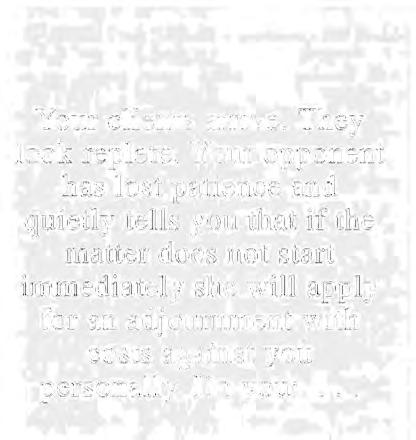

15. Somehow you manage to have the matter stood down again although the Magistrate makes it clear that he wants to start very soon and that he will most definitely not sit beyond Lj p.m. Do you:
(a) Sit around and do nothing?
(b) Panic?
(c) Ring D24 to put out a missing persons report for your clients as well?
(d) Ring your instructors and insist they produce the clients and the Police Officer immediately?
(e) Pop down the street for a cup of coffee?
16. The Clerk continues to inquire as to Whether you are ready. You've stalled him for 40 minutes. The Magistrate has lost patience and has the matter called on. Do you:
(a) Ignore the call and ring up your instructors, again making sure it is a lengthy conversation?
(b) Demand that the Magistrate disqualify him-
self on account of clear and unequivocal bias?
(c) Tell the Magistrate that it is all everyone else's fault and "it is all too much"?
(d) Tell the Magistrate that you are ready to proceed?
(e) Fake another stomach cramp?
17. Your clients arrive. They look replete . Your opponent has lost patience and quietly tells you that if the matter does not start immediately she will apply for an adjournment with costs against you personally. Do you:
(a) Burst into tears?
(b) Immediately ring up and report her to the Ethics Committee ?
(c) Abuse her and shout at the Third Party?
(d) Go and complain to the Bench Clerk about the injustice of it all?
(e) Smile sweetly, shrug your shoulders and affect an air of unconcern?
18. It is now 1.15 p.m. The Magistrate calls the matter on. You tell him and your opponent, at last, about the missing Police Officer. The Magistrate stands the matter down for 30 minutes and reminds the Court that he will not be sitting beyond 4 p.m. Do you:
(a) Do nothing?
(b) Read your brief fully for the first time?
(c) Get detailed instructions from your clients for the first time?
(d) Ring your instructors for instructions?
(e) Go and get a bite of lunch?
19. The matter is called on at 1.55 p.m (delayed because you have been on the telephone a number of times to your instructors)
When you go in again you are asked if you are ready to proceed or whether you wish to apply for an adjournment. Do you:
(a) Ignore the question?
(b) Ask the Magistrate for time to get instructions?
(c) Tell the Magistrate that you don't know and it is all "too much"?
(d) Accuse your opponent of suborning the Police Officer?
(e) Fake another stomach cramp?
20. The matter eventually proceeds. The Plaintiff's witnesses stitch up your client. The Third Party makes a better fist of cross-examination than you do although his facility with English is poor. Do you:
(a) Just go through the motions?
(b) Throw in the towel?
(c) Accuse the Magistrate of helping the Third Party too much?
(d) Renew your application for the Magistrate to disqualify himself on account of manifest bias?
(e) Decide to play for an "adjournment part heard"?



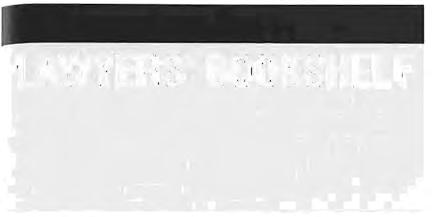
Author:
Kenneth Sutton publisher: Law Book Company Limited, 1991
1058 pp. Hard cover, $170
This book is the bible on insurance law in Australia. In the long-awaited second edition of his work, Professor Sutton has again covered the law of insurance in comprehensive detail.
The book deals extensively with the radical alteration of common law principles by the Insurance Contracts Act 1984 (Cth) and the Insurance (Agents and Brokers) Act 1984 (Cth). As a consequence of the far-reaching effect of this legislation, Professor Sutton has completely re-written his earlier (1980) text.
The text is broken up into four parts: the contract of insurance, the policy of insurance, payment under the policy, and motor vehicle third-party insurance, covered in a total of eighteen chapters.
In Chapters 3 and 5, which deal respectively with non-disclosure and misrepresentation and the law relating to insurance agents and brokers, Professor Sutton refers to the statutory code of remedies for misrepresentation contained in the Insurance Contracts Act 1984 and the unexpected shortcoming in that legislation which has the effect that statutory remedies for misrepresentation are not available to an assured, but are confined to remedies for the insurer in cases of misrepresentation by the assured or his agent (including the broker). Professor Sutton goes on to point out, however, that despite this significant omission, the common law rules continue to apply, providing remedies for an assured, and that an insurer or broker who is a corporation will also come under the ambit of either section 52 or section 53(g) of the Trade Practices Act 1974 (Cth).
The area of failure by brokers or agents to pass on premiums, thus leaving unwitting customers devoid of insurance cover, is an issue of current public concern. The author covers
such matters in detail, and in this context makes extended reference to the important decision of Gokora Pty Ltd v. Montgomery Jordan and Stevenson Pty Ltd (1986) 4 A.N.Z. Ins. Cas. 60-727, a decision of Wilcox J. in the Federal Court of Australia. This case dealt with a claim by an assured against his broker (being a company) and its employee for negligence in sending the proposal and premium payment to the wrong address, so that they were never received by the insurer. Nonetheless, the broker and the employee advised the assured that his motor vehicle was insured and that the policy would be sent to him. The vehicle was uninsured when it was damaged in an accident. The assured claimed damages from both the broker and its employee for breach of section 52 of the Trade Practices Act, alleging that there had been a false representation. Judgment was given against both defendants (although Wilcox J. pointed out that section 52 permitted recovery of losses which were consequential upon misleading conduct, but did not allow an a ward of damages designed to place the claimant in the position he would have been in had the representation been true).
Another area of particular relevance, in this case to insurers, is that of fraudulent claims. This area is given extensive coverage in Chapter 15, where the author refers to a number of important decisions, including the Victorian Full Court decision in Protean Holdings Ltd v. American Home Assurance Company [1985] VR 187, and the High Court decision in Advance (NSW) Insurance Agencies Pty. Ltd. v. Matthews (1989) 166 CLR 606.
The book achieves its purpose: it systematically covers the field, it is thorough, solid, definitive, and a required reference for all involved in insurance law.
Kim Baker
Author: Stephen Graw Publisher: The Law Book Company, 1990 355 pp. Soft cover only, $42
This is not a text to replace Greig or Cheshire and Fifoot as a full and comprehensive coverage of contract law. As the title states, it is an introduction to the law of contract aimed at the student market, written by a lecturer from James Cook University in Townsville.
The student nature of the text is underscored


by the inclusion of a question section at the end of each chapter. It always puzzled me as a student why textbook writers didn't produce a supplement containing answers or at least guidelines for answers to these type of question sections, as confirmation that at least you were on the right track.
The contents cover the standard topics: offer, acceptance, consideration, vitiating elements, exemption clauses, discharge and remedies. Each sUbtopic is dealt with in a point form. Cases are distinguishable by the use of smaller text and are handled concisely with a description of the facts and the decision.
You need never be embarrassed by not having a contract principle at hand in a far-flung Magistrates Court with this thin volume which can easily fit into any overcrowded brief bag.
Eugene O'Sullivan
Captain Lindsay Anderson
Ibex, 1989, pp. 1-224, Hard Cover $25.00
Captain Lindsay Anderson
Ibex, 1992, pp. 1-284, Hard Cover $25.00
This may seem an unusual place to review two books about pirates and buccaneers, although the Trade Practices Commission and the Law Reform Commission would doubtless detect the irony.
The reason for reviewing these books has as much to do with the circumstances of their recent reprinting as with their contents.
The Ibex is an endangered species of wild mountain goat. Its name has been borrowed as the imprint of the Heritage Book Group, whose aim is to help preserve endangered books.
Ibex is the brainchild of Pip and Julian Smibert. Their normal work has very little to do with publishing or, for that matter, sailing ships. But their passion is books. With their own savings, a small mailing list, two almost forgotten books and absurd optimism, they have published two beautiful facsimile editions of Anderson's adventures.
78
The books they publish are not available in shops. Anyone lucky enough to be on their mailing list receives advance notice of the next intended publication, and the print run is adjusted according to the orders received. By this means, the price of the books is kept to $25.00 per volume which, on any view, is extraordinarily good value.
Both of these books are factual accounts of voyages of Captain Lindsay Anderson in an opium clipper in the mid to late nineteenth century. Captain Anderson was a skilled sailor and a competent enough writer, although his writing style unmistakably belonged to the nineteenth century. These books are the most significant surviving first-hand accounts of the opium trade with China in the nineteenth century.
Captain Anderson's story begins in 1859, when he signed on as Third Officer on the Eamont. This was a highly specialised vessel. It was a topsail schooner built on the Isle of Wight, made almost entirely of mahogany. Its main boom was an extraordinary 110 feet long, which gave it not only beautiful lines but also immense power. She was armed with nine eighteen-pound guns and a sixty-eight pounder. Her crew carried the then recently developed Colt naval revolvers.
The combination of speed, strength and ordnance was demanded by the highly lucrative trade in which the Eamont was engaged. On any of its journeys, the ship carried a fortune in opium or in gold and silver which was the currency of the trade. To the usual hazards of navigation in uncharted waters was added the ever present risk of attack by pirates.
A charming feature of these books is the innocent matter of factness which Captain Anderson brings to the task of recording quite remarkable events. The trade, the hazards of the sea, the risk of attack by pirates - all are accepted by Anderson as the setting within which his narrative takes place, but otherwise called for little comment.
These are books which will appeal to those brought up on ripping yarns. But in addition, they should appeal to the sentiment of anyone who loves books. With luck, the Ibex imprint is not an endangered species. It deserves support and encouragement. Perhaps it will eventually reprint some of the near extinct legal books of past centuries.
Julian Burnside
(Members of the Bar interested in the Heritage Book Group may contact it at P.O. Box 154, Albert Park, 3206, Phone 690.7739)
"If you're fixed in your mind, you ' re gone. There are certain times when you've got to be daring."
ON SUNDAY, 26 JULY 1992 AT COMO Park, South Yarra, the Victorian Bar Football Team showed its new jumpers for the first time in its match against a team from Mallesons Stephen Jaques, Solicitors. Despite our fellows looking the better team, the final scores showed that on the day Mallesons was in fact the better team:
Scores by quarter were:
Mallesons Victorian Bar
4.2.(26) 1.3.(9)
6.7.(43) 3.4.(22)
10.8.(68) 16.10.(106) 6.5.(41) 6.10.(46)
Scorers for the Bar were: Phil Kennon (2), Mark Gamble (1), Peter Lithgow (1), Frank Parry (1) and Andrew Donald (1).
The umpires were Mark Gibson, Chris Wallis and Michael Maguire and goal umpire was Patrick Gilbert of the Essoign Club. Their competence ensured the game was played at a high standard.
Dennis Smith was chief tactician for the Bar while the coach was Damien Maguire. Spirited barracking for the Bar's team came from a small group of supporters. These included Jack Kennon Q.c. and Steve Wilmoth. Phil Opas Q.C. was his usual cunning self as he coached the Mallesons team.
Mark Hebblewhite dominated the ruck and was supported by a very fit James Elliott. Mordy Bromberg, enjoying his first game as captain of the Bar team, was a focal point at centre half-forward and Peter Lithgow made the most of limited opportunities at fullforward.
Mark Gamble was dominant at centre half-

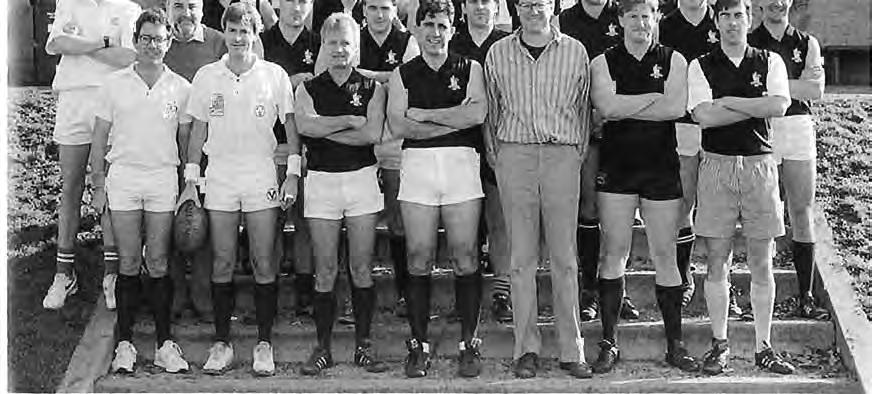
back and Sean Cash covered a lot of ground as winger and collected many kicks. Frank Perry and Lex Lasry Q.C. demonstrated their strength by taking many telling marks over the pack. Peter Rattray Q.c. and Phil Kennon were two of the oldest Bar players and both showed flashes of past brilliance.
Steve Pica on the wing and Joseph Tsalanidis on the halfback flank frequently had to beat superior numbers which they regularly achieved. Steve also pulled in some freakish marks and was sadly missed when he left the field with injury in the third quarter. Patrick Southey was in the centre and frequently went to the assistance of team mates in trouble and was another of our better players.
Rob Williams, Sean Grant and Andrew Donald were used to try and stem the frequent forward forays of Mallesons and they were still running when the final bell was rung.
Mark Thomasoni at full-back was one of our youngest players and without him, the Mallesons score would have been much higher. Andrew Laird roved all day for the Bar and won many kicks but lack of support often saw him single-handedly take on more numerous oppponents.
In summary, those older players in the Bar team, while slower than their younger opponents, kept putting their bodies in and were exhausted by three-quarter time. Our key players were superb but were overwhelmed by sheer weight of numbers. Both Dennis Smith and Damien Maguire remarked after the game that the Bar team did not have a bad player.
After the Mallesons game and after an appropriate period of rest and recuperation, the Bar team was to have had its second game on 23 August against Corrs. However, whether as a result of fear or indifference, Corrs were unable to field a side and further arrangements
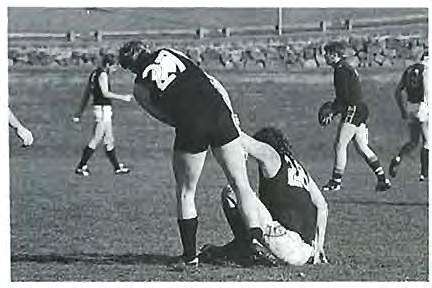
had to be made for the Bar team's second game to take place. In due course, the forces of Arthur Robinson & Hedderwicks, Corrs and Western Mining combined to take up the Bar challenge.
The second game took place at the Melbourne High School oval on Sunday, 30 August 1992. This proved an ideal venue, being a substantially smaller oval than Como Park and having a licensed bar available after the game.
There were substantial changes from the Mallesons game due to such factors as injuries, grandmothers' ninetieth birthdays, girlfriends' parents' birthdays, christenings and overseas trips. These factors resulted in a number of the Bar's better players being unable to take part in the second game and these players included Mordy Bromberg, Mark Gamble, Peter Lithgow, Mark Thomasoni, Steve Pica, Joseph Tsalanidis and Mark Hebblewhite. However, the usual stalwarts were in attendance and we were able to recruit a number of new players, including Steve Grahame, Chris O'Neill, Paul Scanlon, Will Alstergren and we welcomed the return of Savas Miriklis.
Upon entering the fray, the Bar team found that the opposition was attired in jumpers almost identical to ours which in due course, created a nightmare for the players and umpires. At one stage, Will Alstergren was
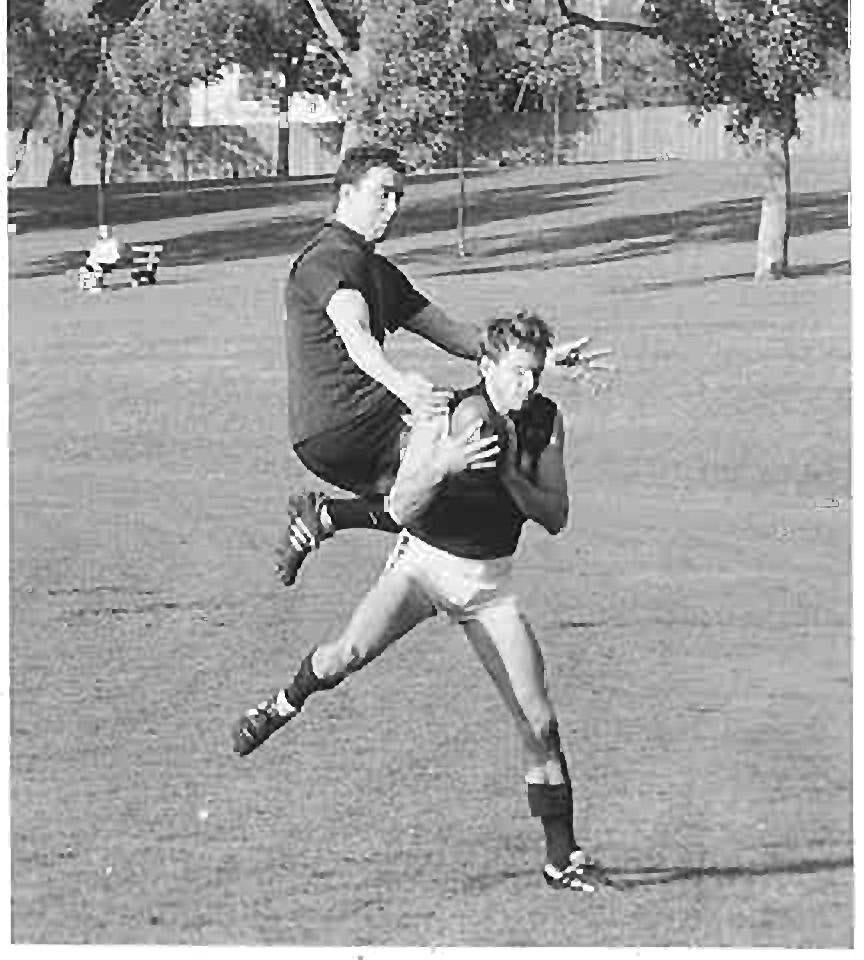
Patrick Southey marking solidly despite heated opposition.
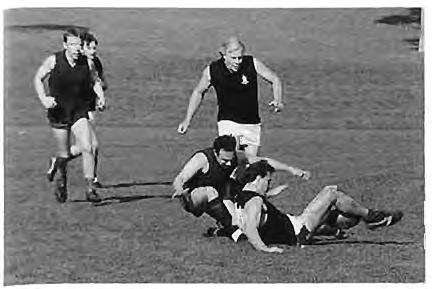
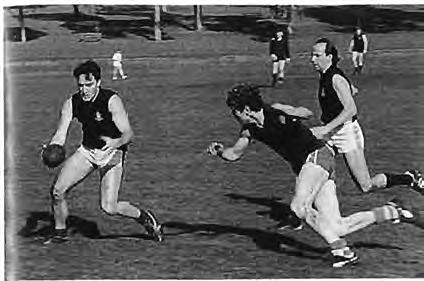
about to handpass to Damien Maguire who was in the clear a short distance from goal, when a Bar player who shall remain nameless, tackled Will and ensured that he was unable to get the handpass away to the team's captain-coach.
The game commenced with the opposition kicking with a strong breeze to the southern end of the ground. In an extraordinary quarter, the opposition kicked 13 behinds as a result of poor kicking and of course, the pressure placed on them by the members of the Bar team across the back-line. It need be said that the Bar's method of play in kicking against the wind left a lot to be desired; however, one behind was scored during the first quarter.
The second quarter saw the Bar team put on I goal 7 behinds, despite having many opportunities to score more goals and to go in at half-time with a handy lead. In fact, at halftime the scores were the Bar 1 goal 9 behinds 9 (14) to 15 points.

The third quarter the quarter in which the Bar lost the game. The oppo ition were able to score 5 goals 3 behinds to leave us in a difficult position at three-quarter time.

However, the game was there to be won and in a spirited last quarter, the Bar came home,
kicking 3 goals 2 behinds to 1 goal 2 behinds.
The final scores were: Victorian Bar Opposition 4.11.(35) 6.20.(56)
The goal scorers for the Bar were: Chris O'Neill, Frank Parry, James Elliott and Peter Rattray.
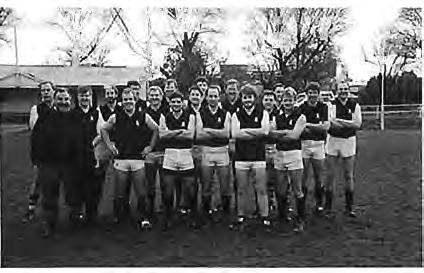
L-R: Lex Lasry Q. c., Dennis Smith, Chris O'Neill, Steve Grahame, Mick Bourke, Frank Parry, Ron Clark, Damien Maguire, Savas Miriklis, Sean Cash, Chris Howse, Andrew Laird, Paul Scanlon, Rob Williams, Andrew Donald, James Elliott, Peter Rattray Q.c., Patrick Southey and Michael Quinlan.
Ron Clark, Steve Grahame and Lex Lasry formed a powerful back line and it was as a result of their efforts that the opposition, particularly in the first quarter, performed so discreditably in front of goal. Mick Bourke and Patrick Southey performed well on the halfback line, Patrick putting in two excellent games which would have earned him the Best and Fairest for the year if there were such a trophy. On the other half-back flank, Chris O'Neill changed with Peter Rattray and Andrew Donald and Chris and Andrew were great performers on the day. The centre line of Sean Cash, Savas Miriklis, Chris Howse, making a comeback, and Will Alstergren, were fierce and competitive. James Elliott played at centre half-forward, running all day, picking up many possessions and being a keen focal point in attack. He was strongly supported by Michael Quinlan and Rob Williams on the flanks with Michael rucking the forward line to assist the ruckmen. When not on the ball, Peter Rattray was in the forward pocket and scored one goal by keenly scouting the pack, bringing back memories of his great days at Monash University. Frank Parry, Paul Scanlon and Damien Maguire shared the forward line and ruck duties and the general view was that the

Bar's ruck combination won out on the day. Last but not least, reference must be made to Andrew Laird, who in two games, roved all day without a break. He has been accurately and kindly dubbed, the Iron Man of the Bar team and it is rumoured that he is under thirty years of age.
The umpiring for the second game was performed to a high standard by Richard Tracey Q.c. and Mark Gibson, with Chris Wallis and Michael Maguire in the goals.
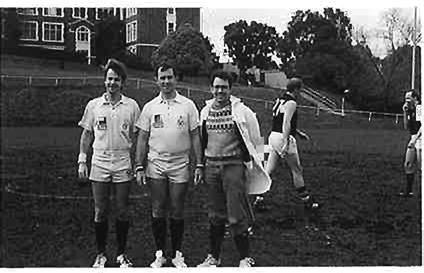
Mark Gibson, Richard Tracey Q.c., Chris Wallis with Lex Lasry Q.c. and Andrew Laird in the background.
This season has been unsuccessful in the sense that no games were won; however, a good time was had by all, there were no injuries of any note and the spirit of friendship which has developed between those who play this great game, has persisted.
May the tradition continue.
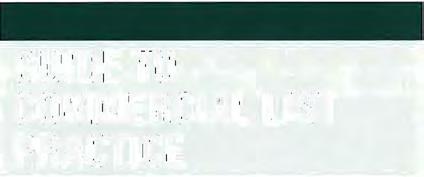
The Supreme Court has published a Guide to Commercial List Practice.
Copies of the Guide are available from the Commercial List Registry at the Supreme Court at a cost of $5.00. They are said (by what journalists often call "a reliable source close to the [Palace, Cabinet or other Authority Figure]") to be "an essential addition to the library of any practitioners appearing in the Commercial List".
The Editors commend this advice to readers of Bar News.
82
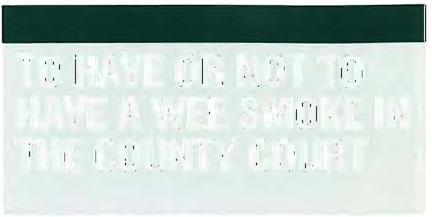
ON 10 JUNE IN THE SEVENTH COURT OF the County Court a complex six day appeal was being heard by His Honour Judge Duggan. Towards midday one of the three counsel for the defence (Con Heliotis) rose suddenly and requested leave to absent himself for a few minutes.
His Honour peered over his glasses and said "I am afraid Mr. Heliotis that to do what I think you want to do you will have to leave the building."
Mr. Heliotis replied as he fidgeted slightly "with respect Your Honour certain liberties remain with the citizen and what I need to do is not yet banned in government buildings." Amidst mirth, references to the cold day and the early sitting of the court a brief adjournment was hastily arranged and the court emptied rapidly.
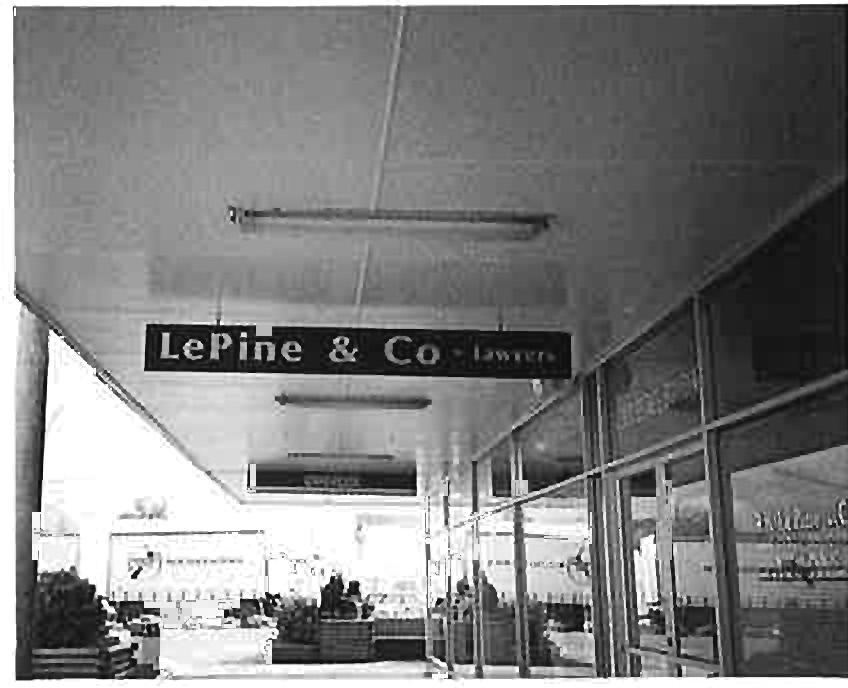
Somewhere in N.z. A multi disciplinary probate partnership?
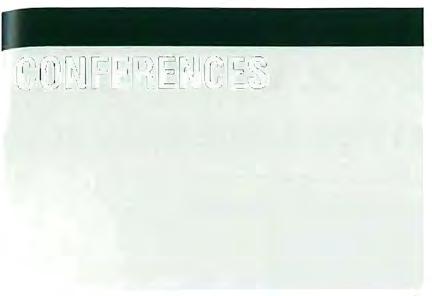
1. The Australian Institute of Criminology will hold a conference on sexual violence from 27 to 29 October 1992 at the Old Melbourne Botel. The conference is entitled "Without Consent: Confronting Adult Sexual Violence". The speakers will include Miss Sally Brown the Chief Magistrate, Dr Jocelyn Scutt, Associate Professor Susan Hayes of Sydney University and Detective Inspector Dannye Moloney of the Victoria Police.
2. The Tenth Commonwealth Law Conference will be held in Nicosia, Cyprus from 3 to 7 May 1993. Matters to be canvassed include Buman Right Issues, International Commerce, Cross Border Litigation and Legal Education.
Further information can be obtained from the Commonwealth Law Conference, P.O. Box 1446, Nicosia, Cyprus.
3. Lex Loci is organising an international legal conference at the Whistler/Blackcomb Resort, British Columbia, Canada from 10 to 17 January 1993. The conference will canvass Professional and Business Development Strategies for Lawyers. Information can be obtained from Lex Loci Pty. Ltd., Level 7, 40 Miller Street, North Sydney, NSW 2060.
4. The 2nd International Environmental Law Conference will be held in Sydney, Brisbane and Melbourne on 24, 25 and 26 November 1992. Contact Ms. Ivo Kristo, Law Council of Australia, G.P.O. Box 1989, Canberra A.C.T. 260l.
5. Law Asia - Legal Aid
A seminar on "Legal Aid -A Human Right or a Favour" will be held from 8 to 9 November 1992 in New Delhi. The conference is organised by the Law Asia Standing Committee on Legal Aid in association with the Bar Association of India and Union Internationale des A vocats (India). Registration forms can be obtained from Mr. Lalit Bhasin, Chairman, Organising Committee, Law Asia Legal Aid Seminar, 10 Hailey Road, 10th Floor New Delhi - 110001 India.
Comprehensive financial advice and management covering your personal and professional finances, and investments, businesses, or other financial interests. Your finances organised, managed, and reported upon.
Budgeting and cash flow projections prepared.
Growth in your net worth planned. Tax returns prepared.
Modern software used.
Consultations in your chambers. Free initial consultation.
Appointments to 7 pm by arrangement.
As principal of William Ingram & Company, Bill Ingram B.Comm., CPA is well qualified to provide highly professional, helpful, and disinterested advice to barristers. His 12 years' accounting experience includes five years as financial controller of Price Waterhouse in their Melbourne office. He also spent three years as an investment manager in London.
The firm is not a sales agent for any finance provider. Our remuneration is entirely by client fee, established at our free initial consultation.
Why not call Bill Ingram on (03) 603 1852 for an appointment?